Here’s our look at the Trump administration and the rest of Washington
- President Trump will announce at 3 p.m. whether he will pull the U.S.from the Paris climate accord
- Biden forms PAC, stokes speculation about a 2020 run
- Comey to publicly testify in Senate after green light from special counsel in Russia probe
- Share via
Boy Scouts: Top leaders didn’t call Trump to praise speech as the president said
The Boy Scouts denied Wednesday that the head of the youth organization called President Donald Trump to praise his recent politically aggressive speech to its national jamboree.
Trump told the Wall Street Journal in an interview published Wednesday, “I got a call from the head of the Boy Scouts saying it was the greatest speech that was ever made to them, and they were very thankful.” Politico published the transcript of the interview.
“We are unaware of any such call,” the Boy Scouts responded in a statement. It specified that neither of the organization’s two top leaders — President Randall Stephenson and Chief Scout Executive Mike Surbaugh — had placed such a call.
The White House had no immediate response to the Boy Scouts’ denial.
Surbaugh apologized last week to members of the scouting community who were offended by the political rhetoric in Trump’s July 24 speech in West Virginia.
Other U.S. presidents have delivered nonpolitical speeches at past jamborees. To the dismay of many parents and former scouts, Trump promoted his political agenda and derided his rivals, inducing some of the scouts in attendance to boo at the mention of former President Obama.
“I want to extend my sincere apologies to those in our Scouting family who were offended by the political rhetoric that was inserted into the jamboree,” Surbaugh said. “That was never our intent.”
Surbaugh noted that every sitting president since 1937 has been invited to visit the jamboree.
Stephenson told the Associated Press two days after the speech that Boy Scout leaders anticipated Trump would spark controversy with politically tinged remarks, yet felt obliged to invite him out of respect for his office.
Hoping to minimize friction, the Boy Scouts issued guidelines to adult staff members for how the audience should react to the speech. Any type of political chanting was specifically discouraged.
Stephenson, who did not attend Trump’s speech, said the guidance wasn’t followed impeccably.
- Share via
Mayor of London again calls on Trump to cancel state visit
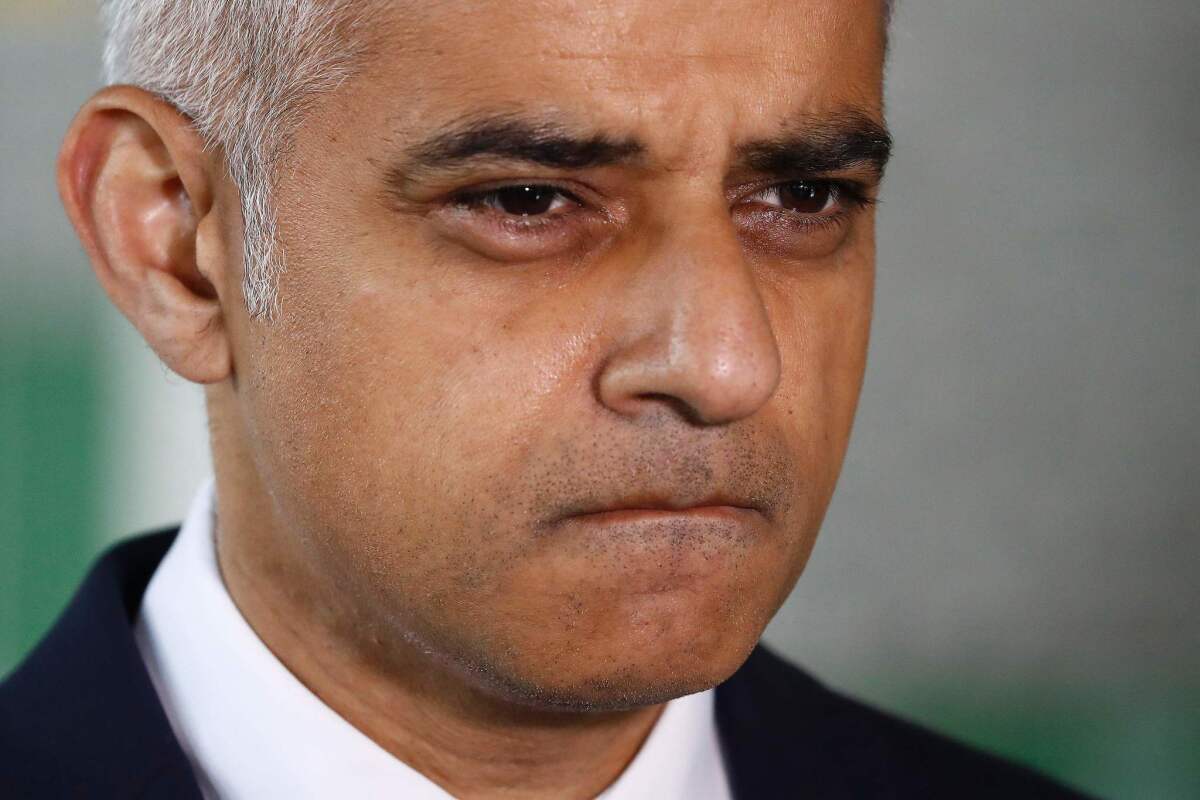
The mayor of London has reiterated his calls for President Trump’s state visit to Britain to be canceled in the wake of the city’s terrorist incident, saying his policies “go against everything we stand for.”
The war of words between the two leaders intensified further Monday evening after Trump criticized Mayor Sadiq Khan’s response to the London Bridge terrorist attack in two tweets, and the mayor said Trump should not be welcomed in the capital.
“Since Saturday I’ve been working with the police, with the emergency services, with the government and others to deal with the horrific attack on Saturday,” Khan said Monday evening. “I just haven’t got the time to deal with tweets from Donald Trump.”
But when pressed on whether he thinks a state visit for later this year should go ahead as planned, Khan was unequivocal.
“My position remains the same. I don’t think we should be rolling out the carpet to the president of the United States in the circumstances where his policies go against everything we stand for,” Khan told Channel 4 news.
“When you have a special relationship, it is no different to when you have a close mate: You stand with them in times of adversity, but you call them out when they’re wrong. And there are many things about which Donald Trump is wrong.”
Trump initially criticized Khan hours after the London attack posting on Twitter: “At least 7 dead and 48 wounded in terror attack and Mayor of London says there is ‘no reason to be alarmed!’”
Khan’s office soon pointed out that the president had, in fact, misquoted Khan, who actually said that Londoners should not be alarmed by the increased armed police presence on the streets.
Trump took to Twitter again on Monday to slam the London mayor once more.
“Pathetic excuse by London mayor Sadiq Khan, who had to think fast on his ‘no reason to be alarmed’ statement. MSM [Mainstream media] is working hard to sell it!” the president wrote.
This is not the first time Khan, the first Muslim mayor of a major Western capital city, has called for Trump’s state visit to be banned.
He previously branded Trump’s policies on immigration and proposed travel ban on people entering the U.S. from predominantly Muslim countries “cruel.”
An online government petition calling for the invitation to be withdrawn also gathered more than 1.8 million votes.
The visit was first announced during Prime Minister Theresa May’s trip to Washington, where she became the first foreign leader to meet the newly-inaugurated president.
State visits are personal invites from the British monarch and involve a significant amount of pomp and ceremony, and usually a state banquet.
- Share via
He helped bring down President Nixon. He thinks President Trump is even worse.
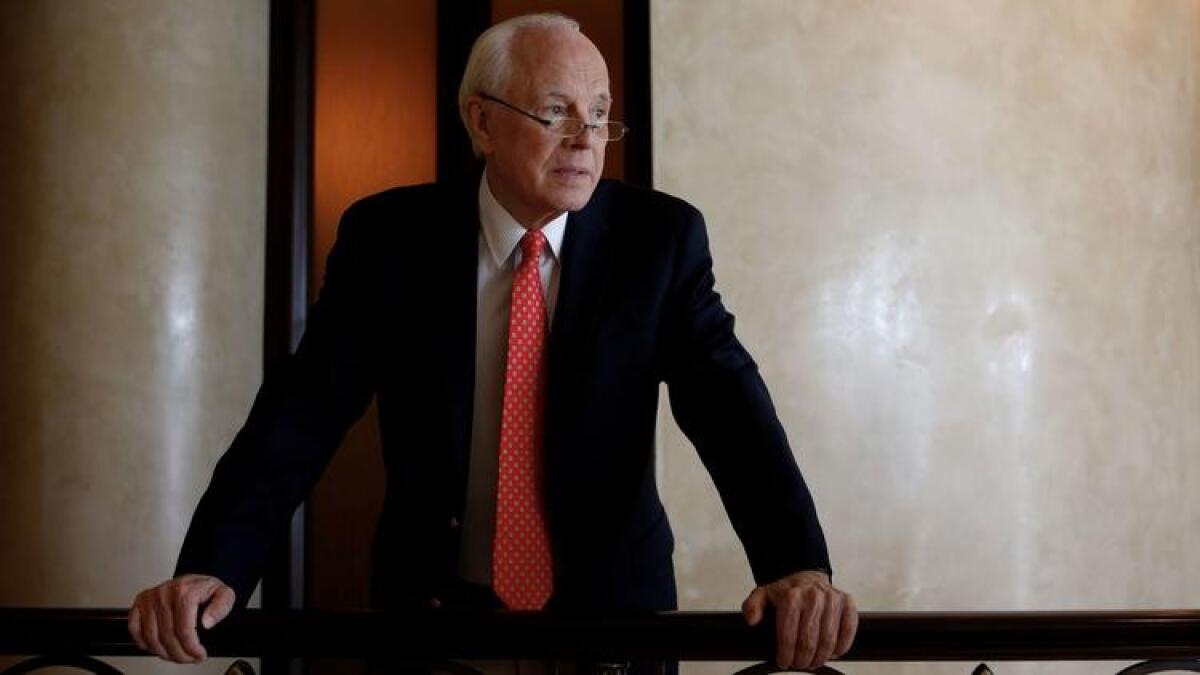
John Dean is a connoisseur of coverups, a savant of scandal, so he can more than imagine what it’s like inside the Trump White House right now.
“It’s a nightmare,” he said, presiding in a high-backed leather wing chair off the lobby of the Beverly Hills Hotel. Not just for those in the headlines — political strategist Steve Bannon, jack-of-many-duties Jared Kushner — but for their unsung assistants and secretaries as well.
“They don’t know what their jeopardy is. They don’t know what they’re looking at. They don’t know if they’re a part of a conspiracy that might unfold. They don’t know whether to hire lawyers or not, how they’re going to pay for them if they do,” Dean said in a crisp law-counsel cadence. “It’s an unpleasant place.”
Dean was a central figure in Watergate, the 1970s political scandal against which all others are measured, serving at the tender age of 32 as President Nixon’s White House attorney. In that capacity Dean worked to thwart investigators after the clumsy break-in at Democratic Party headquarters, then flipped and helped sink Nixon by revealing the president’s involvement in the coverup.
- Share via
Two decades ago, Washington state Republicans repealed and replaced a healthcare overhaul there. It didn’t end well
Republicans in the state of Washington didn’t wait long in the spring of 1995 to fulfill their pledge to roll back a sweeping law expanding health coverage in the state.
Coming off historic electoral gains, the GOP legislators scrapped much of the law while pledging to make health insurance affordable and to free state residents from onerous government mandates.
It didn’t work out that way: The repeal left the state’s insurance market in shambles, sent premiums skyrocketing and drove health insurers from the state. It took nearly five years to repair the damage.
Two decades later, the ill-fated experiment, largely relegated to academic journals, offers a caution to lawmakers at the national level as Republicans in the U.S. Senate race to write a bill to repeal and replace the federal Affordable Care Act.
“It’s much easier to break something,” said Pam MacEwan, who led a Washington state commission charged with implementing the law in the mid-1990s and now oversees the state insurance market there. “It’s more difficult to put Humpty Dumpty back together again. … And that’s when people get hurt.”
The nonpartisan Congressional Budget Office echoed that warning last week, when it concluded that the healthcare bill passed by the House last month would destabilize insurance markets in a sixth of the country and nearly double the number of people without health insurance over the next decade.
- Share via
Companies accelerate hiring, adding a robust 253,000 net new jobs, ADP says

Companies accelerated their hiring last month, adding a robust 253,000 net new jobs in a sign the labor market remains healthy and the economy is strengthening after a weak winter.
The private-sector job creation figures reported Thursday by payroll firm Automatic Data Processing far exceeded analyst expectations and was well above the downwardly revised 174,000 net new positions added in April.
“Job growth is rip-roaring,” declared Mark Zandi, chief economist at Moody’s Analytics, which assists ADP in preparing its report.
- Share via
Trump to announce decision today on climate pact

President Trump plans to bring weeks of indecision over climate change policy to a close this afternoon, announcing if he will withdraw the U.S. from the international agreement on climate change reached in Paris in 2015.
Read our coverage of the debate leading up to today’s announcement:
The choice for Trump appears to be whether to quit the treaty entirely or stay with it but significantly scale back the U.S. commitment to combat global warming.
The debate has split Trump’s advisors for months. He has also been heavily lobbied by other leaders, from the pope to California Gov. Jerry Brown, who weighed in Wednesday in an interview.
U.S. diplomats have been making clear to their foreign counterparts that the Trump administration believes that economic growth at home is a higher priority than fighting climate change.
But a large number of business leaders believe that the climate change agreement is good for the economy. They and their allies in the Republican Party have been making that case to the White House.
Regardless of what Trump decides, California and other states with Democratic majorities have made clear that they intend to continue state policies to combat climate change.
California leaders, in particular, have been taking the lead in building international support for efforts to convert to renewable energy and reduce use of coal and other fossil fuels.
- Share via
All jokes aside, Trump’s ‘covfefe’ tweet sparks questions too
President Trump sparked a global kerfuffle over “covfefe” with his bizarrely truncated tweet just minutes into Wednesday, spawning countless jokes across Twitter but also more serious questions for which the White House gave no answers.
Press Secretary Sean Spicer, during an unusually short 11-minute briefing in which he insisted he not be on camera, declined to give any explanation for Trump’s tweet posted just after midnight. Nor would he translate what the president was trying to say in the garbled message that broke off midsentence.
But Spicer told reporters that the public should not be concerned that the president sent what the questioner called “somewhat of an incoherent tweet.”
“The president and a small group of people know exactly what he meant,” Spicer said.
- Share via
Biden launches new PAC, keeping the 2020 door open
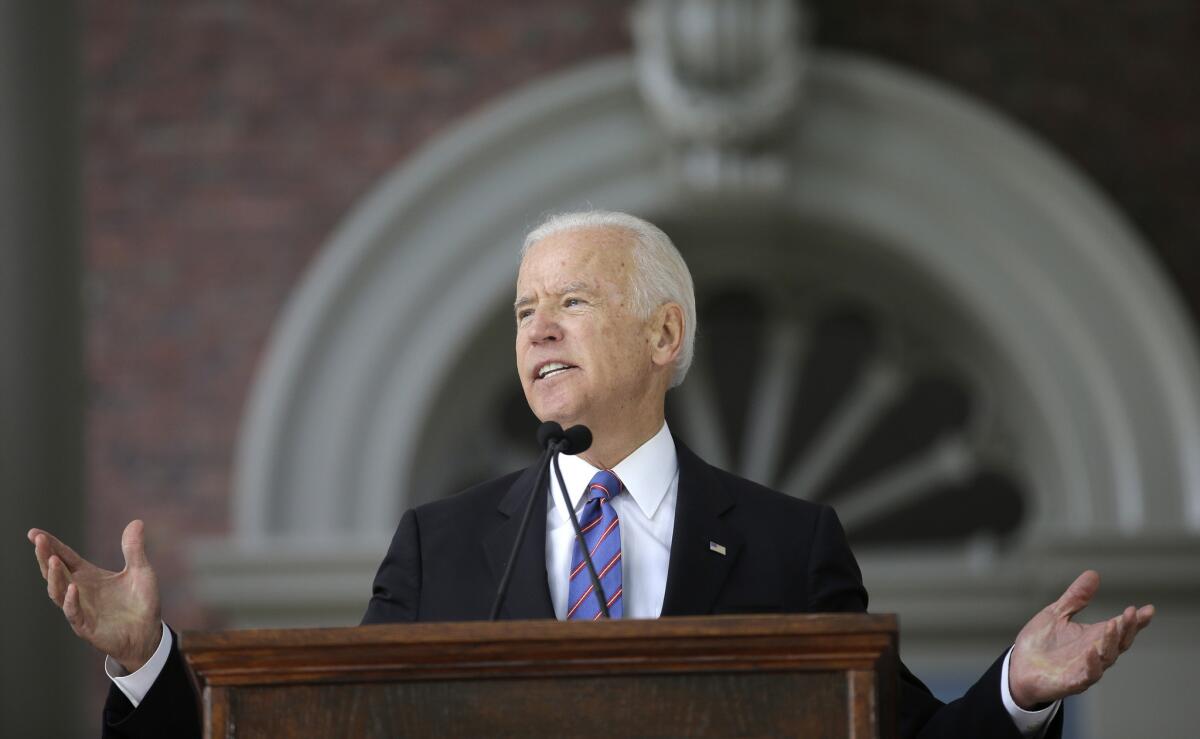
Former Vice President Joe Biden is launching a new political action committee, a platform that will allow him to provide help to favored candidates and, inevitably, boost speculation about a possible run for the Democratic nomination in 2020.
The organization, which Biden is calling American Possibilities, will be staffed by a former top political aide to the vice president, Greg Schultz, who is also a veteran of President Obama’s reelection campaign.
The PAC will allow Biden to raise money that he can use to travel the country, contribute to candidates in governor’s races this year and congressional and state races in 2018 and generally do the sorts of things that aspiring politicians do to keep their names in the headlines.
All that can’t help but nurture questions about whether Biden, 74, will try yet again to attain the office he first started running for in 1987.
In public appearances, which have taken him to electorally important states, and interviews since the 2016 election, Biden has been sharply critical of the Trump administration, but has also pointed to flaws in his own party. In one interview, he pointed to a “bit of elitism that’s crept in” to the party’s approach to working-class voters.
At the same time, he has given carefully ambiguous answers when asked about his plans. At a conference in Las Vegas earlier this month, he responded to the question about a presidential run by saying: “Could I? Yes. Would I? Probably not.”
In the announcement for the new group, Biden said that “the negativity, the pettiness, the small-mindedness of our politics drives me crazy. It’s not who we are.”
“It’s time for big dreams and American possibilities,” he said.
- Share via
U.S., region’s foreign ministers debate Venezuela

The United States and foreign ministers from across the hemisphere met in Washington on Wednesday to attempt to force Venezuela’s leftist government and its angry opposition into talks.
Hunger and violence have pushed Venezuela to the brink of humanitarian disaster, diplomats say.
But Wednesday’s meeting of the Organization of American States faced unlikely prospects for success: Venezuelan President Nicolas Maduro does not trust the organization and has said his nation will withdraw its membership.
Some OAS nations, including several U.S. allies in the Caribbean, have criticized the regional body’s efforts as intervention promoted by Washington.
But U.S. officials are hoping the sheer weight of the crisis will unite the region to put pressure on Venezuela.
“There’s more and more concern about what we’re seeing, and so more and more countries have gotten over their reluctance to question or go against the wishes of the Venezuelan government,” a senior State Department official said in a briefing for reporters.
“It’s really hard to stand by and do nothing in the face of the kinds of institutional steps we’ve seen in Venezuela, and the increasing humanitarian suffering,” said the official, who spoke on condition of anonymity, in keeping with frequent administration practice.
Although the OAS periodically brings its members’ foreign ministers together, this is the first time a meeting has been convened to deal with a single topic, U.S. officials said.
At the conclusion of Wednesday’s session, diplomats said they had discussed two resolutions. One, promoted by Caribbean nations, called on Venezuela to reconsider withdrawing from the OAS.
A second more pointed resolution authored by the U.S., Canada, Mexico, Panama and Peru urged the Maduro administration not to go ahead with a constituent assembly that would rewrite the Venezuelan constitution. Many fear it would dissolve the few democratic institutions that remain and favor the ruling Socialist Party.
Separately, the Venezuela opposition, emboldened by a string of increasingly massive street demonstrations, sharply criticized Wall Street for extending what it called a “lifeline” to the Maduro government.
At issue is the purchase by Goldman Sachs of Venezuelan government bonds for a reported $865 million, a major discount for paper originally worth $2.8 billion.
Goldman Sachs confirmed the purchase of the bonds, issued in 2014 by the state oil company PDVSA, after it was reported in the Wall Street Journal.
“We are invested in PDVSA bonds because, like many in the asset management industry, we believe the situation in the country must improve over time,” Goldman said in a statement. The firm added that it made the purchase through a secondary dealer to avoid direct interaction with the Venezuelan government.
That distinction meant nothing to the Venezuelan opposition, which accused Goldman of “making a buck off the suffering” of the Venezuelan people.
The Trump administration previously has targeted the Maduro government, slapping economic sanctions on its vice president and pro-Maduro Supreme Court justices.
- Share via
Former FBI director spoke with new special counsel and is cleared to testify before Senate panel
The special counsel investigating possible links between Russia and the Trump presidential campaign has cleared former FBI Director James Comey to testify before a congressional committee about his contacts with President Trump, according to an associate close to Comey.
Comey met with Robert S. Mueller III, whom the Justice Department appointed on May 17 to investigate any Russian ties to the Trump campaign, and Mueller said he had no problems with Comey’s testifying, the associate said.
Trump abruptly fired Comey as head of the FBI on May 9. The president later said in an interview on NBC News that he was concerned about the FBI investigation into what he called the “Russia thing.”
Comey reportedly wrote internal memos after his meetings with Trump. In one, he wrote that the president had requested he ease up on the FBI probe of Michael Flynn, who served as Trump’s national security advisor until he was ousted in February for lying about his contacts with Russian officials.
The Senate Intelligence Committee announced on May 19 that Comey had agreed to testify after the Memorial Day holiday. The hearing has not been scheduled.
The FBI separately declined a request from the House Oversight Committee to turn over Comey’s memos. The bureau said it would need to consult with Mueller before making any decisions.
Rep. Jason Chaffetz (R-Utah), the committee chairman, said in response that he would not push the matter.
“The focus of the committee’s investigation is the independence of the FBI” and the events leading to Comey’s firing, he wrote.
In a separate development, a senior Justice Department lawyer with experience in complex financial fraud investigations has agreed to join Mueller’s investigation.
Andrew Weissman has led the fraud section at Justice, where he oversaw probes into corporate wrongdoing at Volkswagen and Takata. Weissman also is a veteran of the FBI.
Weissman is the highest-ranking Justice Department official to join the special counsel office being set up a few blocks from the main Justice building in downtown Washington.
Mueller also hired two colleagues from the WilmerHale law firm, where he worked, and brought on a former Justice Department spokesman, Peter Carr, to handle media inquiries.
- Share via
Analysis: In President Trump’s wake, divisions mark both Democratic and Republican parties
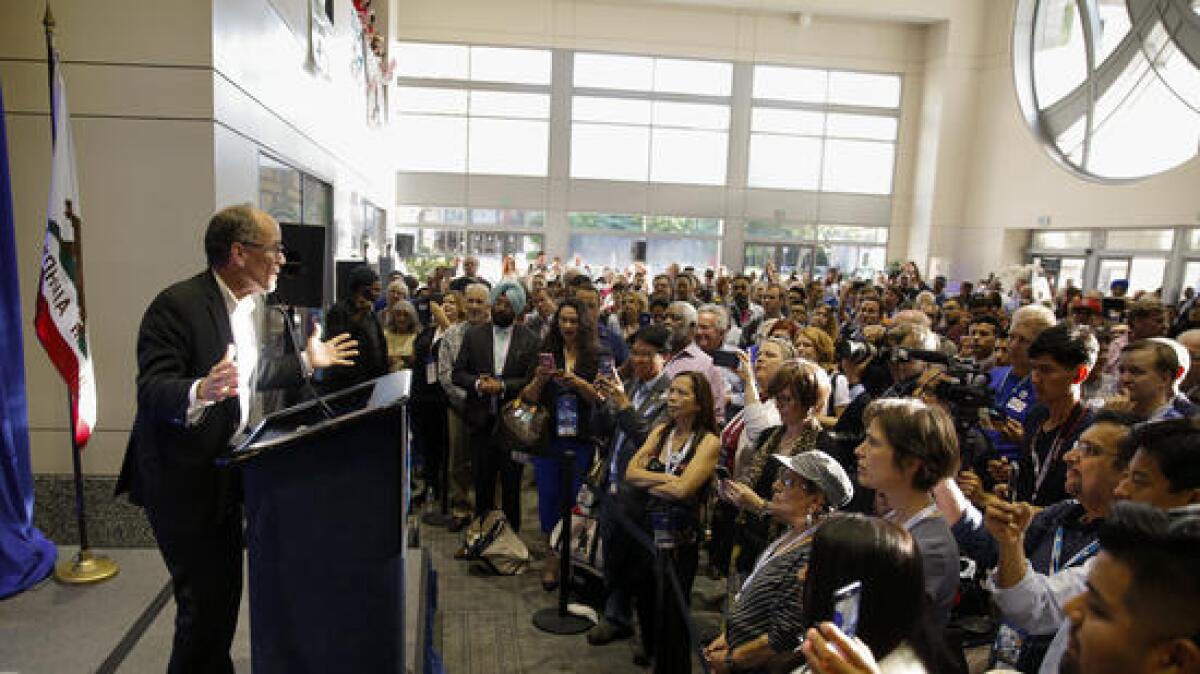
Six months after President Trump breached long-standing political boundaries to win the White House, the nation’s major political parties still muddle in his wake.
On the sun-swept lawn of the Hotel del Coronado two weeks ago, national Republican leaders sipped cocktails and listened to San Diego Mayor Kevin Faulconer, one of the party’s brightest lights in the most populous state, praise a brand of moderate Republicanism that looks nothing like the versions coming out of Washington — either the populism of the president or the more orthodox conservatism of congressional leaders.
A week later, Democratic National Committee Chairman Tom Perez talked in a Sacramento interview of the “remarkably constructive” debate underway in his party, characterizing its divisions as largely in the past. Within hours, he and other party leaders were booed as they welcomed delegates to a state convention that would be filled with persistent internal warfare on healthcare and other issues.
No political party is immune to disagreement; indeed the path to power often relies on combustible ideological diversity. But Democrats and Republicans alike seem particularly adrift and quarrelsome these days.
- Share via
Trump preparing to pull U.S. from Paris climate accord, amid last-minute lobbying
President Trump hasn’t made a final decision on whether the U.S. will quit the Paris Accord on climate change, but White House officials indicated Wednesday that he was headed in that direction, setting off a worldwide reaction.
A flurry of leaks, counter-leaks and public statements thrust back into the spotlight a decision that has been agonized and untidy even by the standards of a White House known for internal drama.
Wednesday morning, when officials told some news organizations that Trump had settled on pulling out of the climate agreement, seemingly everyone in the world jumped in to try to influence or spin his decision, from the Chinese government to the coal industry to the state of California.
That offered a foretaste of the reaction Trump likely will receive if he does follow through on his vow to pull the United States out of the 195-nation pact, which President Obama hailed in 2015 as one of his major achievements.
Other nations have swiftly moved to take over the leadership role on climate that the United States would be abandoning. Some states have followed suit, promising they would break with Washington to work with other countries in their efforts to contain global warming.
During Trump’s recent overseas trip, U.S. allies warned him that America’s broader diplomatic influence would be undercut if the administration gave up its seat at the climate negotiating table.
All the public lobbying on Wednesday moved Trump to weigh in himself. He knocked down reports that he had decided to withdraw with a tweet announcing that he was still making up his mind.
The mixed messages coming out of the White House left open the possibility that the original news reports reflected the views of officials who were aiming to steer the final outcome by presenting withdrawal as a done deal.
Trump’s schedule for the day includes meetings with advisors hoping to talk him into staying in the agreement, at least to some extent.
If Trump does withdraw the U.S. fully from the Paris pact, scientists warn it will be a tremendous setback to the worldwide effort to contain temperatures from rising an average of 2 degrees Celsius above pre-industrial levels. The consequences for the United States would extend beyond global warming.
“It will be a very big deal all over the world,” said Todd Stern, the lead U.S. climate negotiator during the Obama administration. “There will be consequential blowback with respect to our diplomatic position across the board.”
UPDATES
9:27 a.m.: This post was updated throughout with staff reporting and additional details.
6:23 a.m.: This post was updated with Trump’s tweet.
6:04 a.m.: This post was updated throughout with additional details.
- Share via
U.S. Supreme Court makes it harder to sue police for barging into homes
The U.S. Supreme Court made it harder to sue police for barging into a home and provoking a shooting, setting aside a $4-million verdict against two Los Angeles County deputies on Tuesday.
The money was awarded to a homeless couple who were startled and then shot when the two sheriffs deputies entered the shack where they were sleeping.
The unanimous ruling rejected the so-called provocation rule that some lower courts have used. Under that rule, police can be sued for violating a victim’s constitutional rights against unreasonable searches if they provoked a confrontation that resulted in violence.
- Share via
Trump lashes out at Germany over NATO spending and trade after Merkel questions the U.S. commitment to its allies
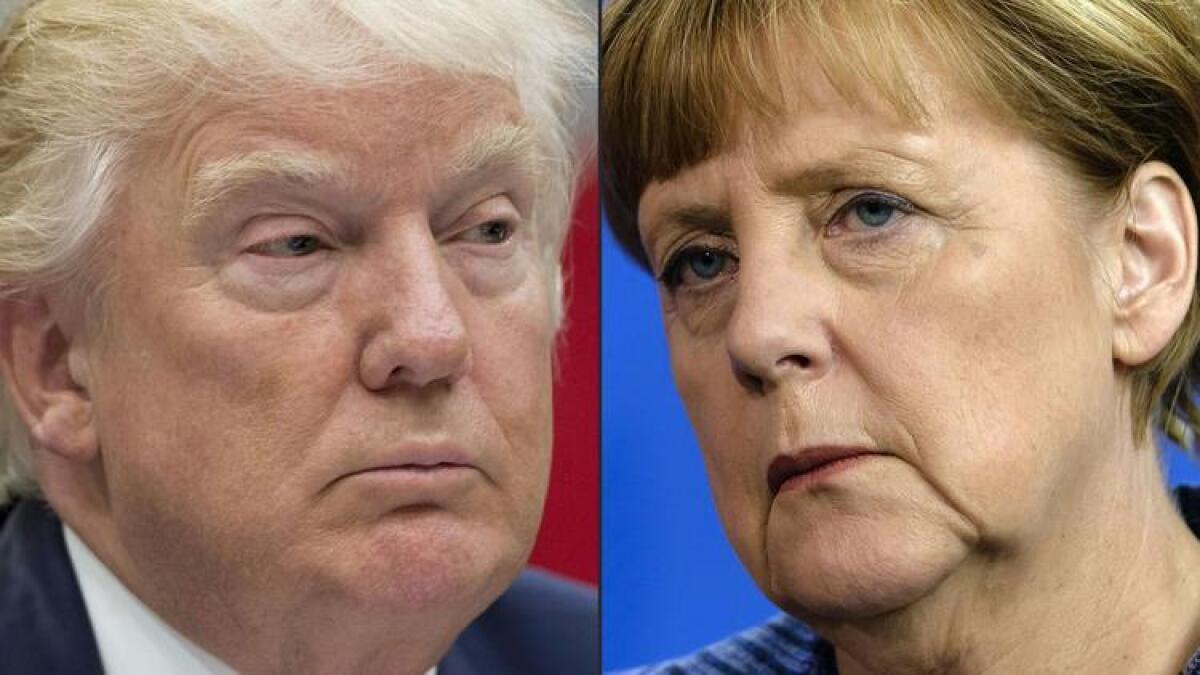
President Trump took aim at German trade practices and defense spending Tuesday following pointed criticism from Chancellor Angela Merkel that Germany may not be able to rely on its allies.
“We have a MASSIVE trade deficit with Germany, plus they pay FAR LESS than they should on NATO & military. Very bad for U.S. This will change,” Trump wrote in a tweet.
Last week, White House spokespeople had denied that Trump criticized German trade practices after the German newspaper Der Spiegel quoted him as having done so.
Trump unsettled Merkel and other allies during the recent NATO summit when, during his remarks, he did not mention the central commitment members of the North Atlantic Treaty Organization make to defend each other.
Trump’s policy toward climate change is another point of contention with many European countries. Trump promised during the election to tear up the landmark Paris climate accord.
Merkel said the conversation with the U.S. on climate change last week during the G-7 meetings in Sicily, which followed the NATO summit, was “extremely difficult.”
During a campaign speech in Munich on Sunday, Merkel said Germany must rethink how much it can rely on its allies. “The era in which we could rely completely on others is gone, at least partially,” Merkel said. “I have experienced that over the last several days.”
In a 2014 meeting, NATO defense ministers agreed that each state would move toward a goal of raising military spending to 2% of its annual economic output by the year 2024. German defense spending is below that goal.
The U.S. trade deficit with Germany shrank to $65 billion in 2016 from $75 billion the year before.
- Share via
Consumers spend at fastest pace in four months in a sign of spring economic rebound

Americans ratcheted up their spending in April at the fastest pace in four months, in a sign the economy has rebounded this spring after a lackluster winter.
The new data also could help push Federal Reserve officials to hike a key interest rate again when they meet in two weeks.
Personal consumption expenditures increased 0.4% in April, up from 0.3% the previous month, the Commerce Department said Tuesday.
Americans had more money to spend, with personal incomes also rising 0.4% — twice the pace of growth in March.
- Share via
White House communications director Michael Dubke resigns
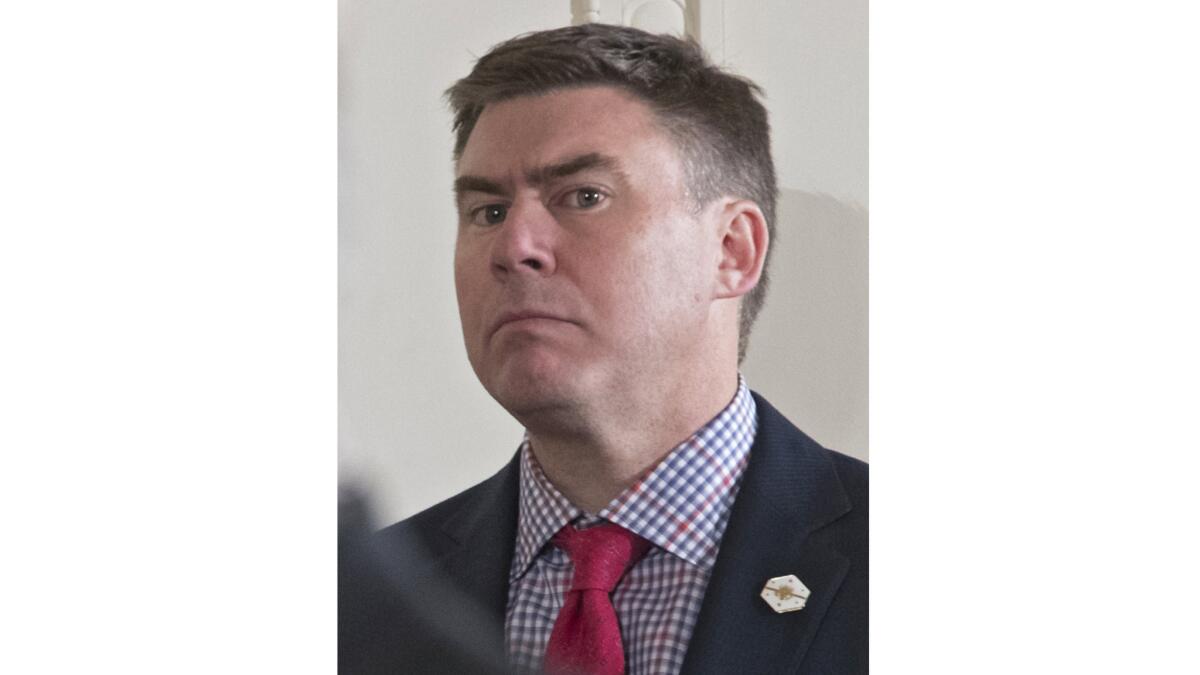
White House communications director Michael Dubke has resigned.
Kellyanne Conway, White House counselor, told The Associated Press that Dubke handed in his resignation before President Donald Trump left for his international trip earlier this month.
In an interview on Fox News on Tuesday, Conway said Dubke “made very clear that he would see through the president’s international trip, and come to work every day and work hard even through that trip because there was much to do here back at the White House.”
Dubke issued a statement Tuesday morning:
“It has been my great honor to serve President Trump and this administration. It has also been my distinct pleasure to work side-by-side, day-by-day with the staff of the communications and press departments.”
A Republican consultant, Dubke joined the White House team in February after campaign aide Jason Miller — Trump’s original choice for communications director — withdrew from consideration. Dubke founded Crossroads Media, a GOP firm that specializes in political advertising.
--
6:03 a.m.: Updated with Dubke’s statement
- Share via
Should Jared Kushner keep his security clearance? Adam Schiff isn’t sure
The top Democrat on the House Intelligence Committee, Rep. Adam B. Schiff (D-Burbank), says he’s not sure that President Trump’s son-in-law and advisor, Jared Kushner, should retain his security clearance.
The California Democrat, who has been a sharp critic of Trump, also said in an interview aired Sunday that national security advisor H.R. McMaster, a highly respected military officer, had been tarnished by his association with the White House.
Schiff’s comments, on ABC’s “This Week,” came amid growing questions about Kushner’s contacts with Russian officials before Trump took office. Trump has denounced the latest round of news reports, saying that some of them could be based on fabricated sources.
Top Trump aides, including John F. Kelly, the secretary of Homeland Security, pushed back Sunday against the suggestion that there was anything untoward about establishing “back channel” communications with the Russians during the presidential transition.
Schiff said he regretted that McMaster had done so as well, saying he believed the White House “used” the solid reputations of people like him to back up dubious actions.
“Sadly, I think this is an administration that takes in people with good credibility and chews them out and spits out their credibility at the same time,” said Schiff, who acknowledged that what McMaster said about back channel communications was “true in the abstract.”
“I think anyone within the Trump orbit is at risk of being used,” he said.
Kelly, in separate talk-show appearances on Sunday, said there was nothing untoward about an incoming administration establishing communications with a foreign power in order to lay the groundwork for better relations.
Schiff declined to discuss the substance of the allegations regarding Kushner’s contact with Russian officials during the transition and whether Kushner had been forthcoming about them, but said enough questions had been raised that his access to top-secret intelligence should be scrutinized.
“I think we need to get to the bottom of these allegations,” Schiff said. “But I do think there ought to be a review of his security clearance to find out whether he was truthful, whether he was candid. If not, then there’s no way he can maintain that kind of a clearance.”
Schiff was also critical of continuing involvement in aspects of the Russia probe by fellow Californian Devin Nunes (R-Tulare), the chairman of the House Intelligence Committee, who stepped aside from the probe earlier this year after the House Ethics Committee began investigating whether he had improperly revealed classified information.
Nunes remains involved in decision-making about the issuance of subpoenas, Schiff said, adding: “I don’t think that he should, given that he has stepped aside or recused himself.”
The committee is investigating Russian entanglements by figures in Trump’s circle, including fired national security advisor Michael Flynn, who has been the target of multiple subpoenas.
- Share via
Trump still ‘wide open’ on climate change, Pentagon chief says
With President Trump set to make a decision this week about whether the U.S. should remain part of the landmark Paris climate accord, Defense Secretary James Mattis said Trump remains “wide open” on the issue.
During a visit to Europe that ended Saturday, Trump dismayed European allies by refusing to commit to remaining in the 2015 accord during talks with European Union officials in Brussels and at the Group of Seven gathering in Sicily. The president said in a tweet that he will make a decision this week.
Mattis, who was present at some of the Brussels talks, said that Trump is still making up his mind, and that he has been inquisitive about other leaders’ opinions.
“The president was open – he was curious about why others were in the position they were in, his counterparts in other nations,” the Defense secretary said in an interview aired Sunday on CBS’ “Face the Nation.”
“And I’m quite certain the president is wide open on this issue as he takes in the pros and cons of that accord.”
During his European trip, Trump met privately at the Vatican with Pope Francis, who presented him with a copy of his papal encyclical on environment and climate change. French President Emmanuel Macron, who met with Trump in Brussels, also said he had pressed the issue with the U.S. president, though the White House did not mention that appeal in a summary of their meeting.
- Share via
Homeland Security secretary defends Jared Kushner, blasts Manchester intelligence leaks
There is nothing inherently wrong with an incoming presidential administration establishing “back channel” communications with a foreign power such as Russia, Secretary of Homeland Security John F. Kelly said Sunday.
Appearing on “Fox News Sunday,” Kelly was asked about reports by the Washington Post and other outlets that President Trump’s son-in-law and close advisor, Jared Kushner, sought to set up secret lines of communication with Russian officials prior to Trump being sworn in.
The retired general did not confirm the reports, but said the principle of establishing secretive contacts during a presidential transition “doesn’t bother me” and is a legitimate means of building relationships.
“I think that any channel of communication, back or otherwise, with a country like Russia is a good thing,” he said.
Kelly did not address a central element of the reports — that Kushner discussed the possibility of using Russian communications channels from a Russia diplomatic outpost to shield from U.S. intelligence surveillance whatever discussions Trump transition officials wanted to have with Moscow.
The FBI, a special counsel and multiple congressional committees are probing Russian interference in the presidential campaign and whether the Trump camp colluded in it. The U.S. intelligence community says Russian cyberattacks were meant to boost Trump and harm his opponent, Hillary Clinton.
In a separate interview on NBC’s “Meet the Press,” Kelly defended the integrity of Kushner, whose involvement in communications with Russia has brought the investigation closer to Trump personally than has previous scrutiny of others in his campaign circle or the White House.
Calling Kushner “a great guy, a decent guy,” the Homeland Security secretary said the president’s son-in-law’s “No. 1 interest, really, is the nation.”
Also in the NBC interview, Kelly excoriated intelligence leaks in the wake of last week’s deadly bombing in Manchester, England. British officials including Prime Minister Theresa May were angered by disclosures about details of the investigation, including the release of the dead attacker’s name and detailed photos from the bomb scene that were published by the New York Times.
Several outlets cited unnamed U.S. officials as the source of the information including the bomber’s identity. The Times did not say how it obtained the photos.
Britain routinely shares intelligence with close allies like the United States with the expectation that it will be kept confidential. Kelly said that failing to keep such secrets could seriously damage intelligence-sharing arrangements with other nations.
“I believe when you leak the kind of information that seems to be routinely leaked -— high, high level of classification… I think it’s darn close to treason,” Kelly said. It is not clear what level of classification, if any, the information about the British investigation would have had.
Trump himself, who recently caused controversy when he passed sensitive intelligence on Islamic State to Russian Foreign Minister Sergey Lavrov and discussed the location of U.S. nuclear submarines with the president of the Philippines, Rodrigo Duterte, has denounced the Manchester leaks and vowed to track down the source or sources.
- Share via
In tweets, Trump says stories based on White House leaks are fabricated
President Trump is back – and tweeting.
In a Sunday morning series of posts on Twitter, the president repeated his denunciations of the “fake media,” celebrated the Republican victory in a Montana special election and declared his overseas trip a success.
Trump returned to the White House late Saturday after a swing through the Middle East and Europe, the first foreign trip of his presidency. During it, he tweeted only sparingly.
While Trump was away, controversy continued to swirl around his White House, with media reports focusing on son-in-law Jared Kushner’s role in Trump campaign contacts with Russian officials. The GOP healthcare plan and Trump’s budget also came under withering scrutiny during the president’s absence.
In Sunday’s tweets, Trump said cascading leaks from within his administration were in fact “fabricated lies” by news organizations based on sources that did not exist. One tweet was corrected to fix the spelling of “exist.”
Trump also complained that the special congressional election in Montana, called to fill the seat vacated when Ryan Zinke became his Interior secretary, “was such a big deal to Dems & Fake News until the Republican won.” The “V was poorly covered,” he said, referring to the Republican victory.
The victory by Republican candidate Greg Gianforte received extensive coverage. It was widely expected, given Montana’s significant Republican edge, but made more suspenseful on the eve of the election when Gianforte was charged with misdemeanor assault for an incident in which he struck a reporter who had asked him a question.
The president received mixed reviews for his inaugural overseas venture. He was praised by some for his outreach to Sunni Arab allies in the Persian Gulf, but continued his administration’s practice of making no public criticism of serious human rights violations.
In Europe, he rattled allies by declining to explicitly endorse the NATO alliance’s bedrock common defense pledge or pledge to adhere to the Paris climate accord.
Whatever the commentary surrounding the trip, Trump counted it a success.
“Hard work but big results,” he wrote.
- Share via
Trump’s international trip underscored what ‘America First’ looks like on the world stage
Donald Trump made no secret during the presidential campaign of his disdain for America’s trading partners, his skepticism of longtime alliances and his eagerness to refocus U.S. foreign policy on the single-minded pursuit of American security.
That was the largely the president the world got as Trump made his way through the Middle East and Western Europe over the last nine days,
Trump’s first foreign trip may have produced memorable, and at time cringe-inducing, images of the new president, whether grasping a glowing orb in Saudi Arabia or shoving the prime minister of Montenegro at a NATO meeting in Brussels. But perhaps most profoundly, the trip underscored what “America First,” as Trump has branded his governing philosophy, looks like on the world stage.
- Share via
Trump says he’ll decide on Paris climate deal next week
Seven wealthy democracies ended their summit Saturday in Italy without unanimous agreement on climate change, as the Trump administration plans to take more time to say whether the U.S. is going to remain in the Paris accord on limiting greenhouse gas emissions.
The other six nations in the Group of Seven agreed to stick with their commitment to implement the 2015 Paris deal that aims to slow down global warming.
The final G-7 statement, issued after two days of talks in the seaside town of Taormina, said the U.S. “is in the process of reviewing its policies on climate change and on the Paris agreement and thus is not in a position to join the consensus on these topics.”
Trump tweeted he would decide his stance on the Paris agreement next week. The announcement on the final day of the U.S. president’s first international trip comes after he declined to commit to staying in the sweeping climate deal, resisting intense international pressure from his peers at the summit.
Italian Prime Minister Paolo Gentiloni, who chaired the meeting, said the other six “won’t change our position on climate change one millimeter. The U.S. hasn’t decided yet. I hope they decide in the right way.”
Gentiloni said climate was “not a minor point” and that he hoped the United States would decide “soon and well” because the Paris accords “need the contribution of the United States.”
French President Emmanuel Macron also chimed in on the climate issue, praising Trump’s “capacity to listen.” Macron said he told Trump it is “indispensable for the reputation of the United States and the interest of the Americans themselves that the United States remain committed” to the Paris climate agreement.
German Chancellor Angela Merkel was more downbeat, calling the G-7 climate talks “very unsatisfactory.”
- Share via
Everyone’s a winner! Or what to take away from that special congressional race in Montana
Republicans were celebrating Friday, and relieved, and it was easy to see why: The party hung on to Montana’s sole congressional seat even though its candidate faced a freshly lodged criminal charge for physically assaulting a reporter on election eve.
Though they fell short in yet another special election — Greg Gianforte won handily, 50% to 44% — Democrats also found reason to be pleased: Their candidate, flawed as he was, continued a pattern of polling better than might be expected — “over-performing,” to use the political parlance, and that could hold future promise.
It’s possible, as elections analyst Nathan Gonzales put it, to lose and still have momentum.
- Share via
In commencement address, Hillary Clinton remembers fallout from Nixon, makes subtle jab at President Trump
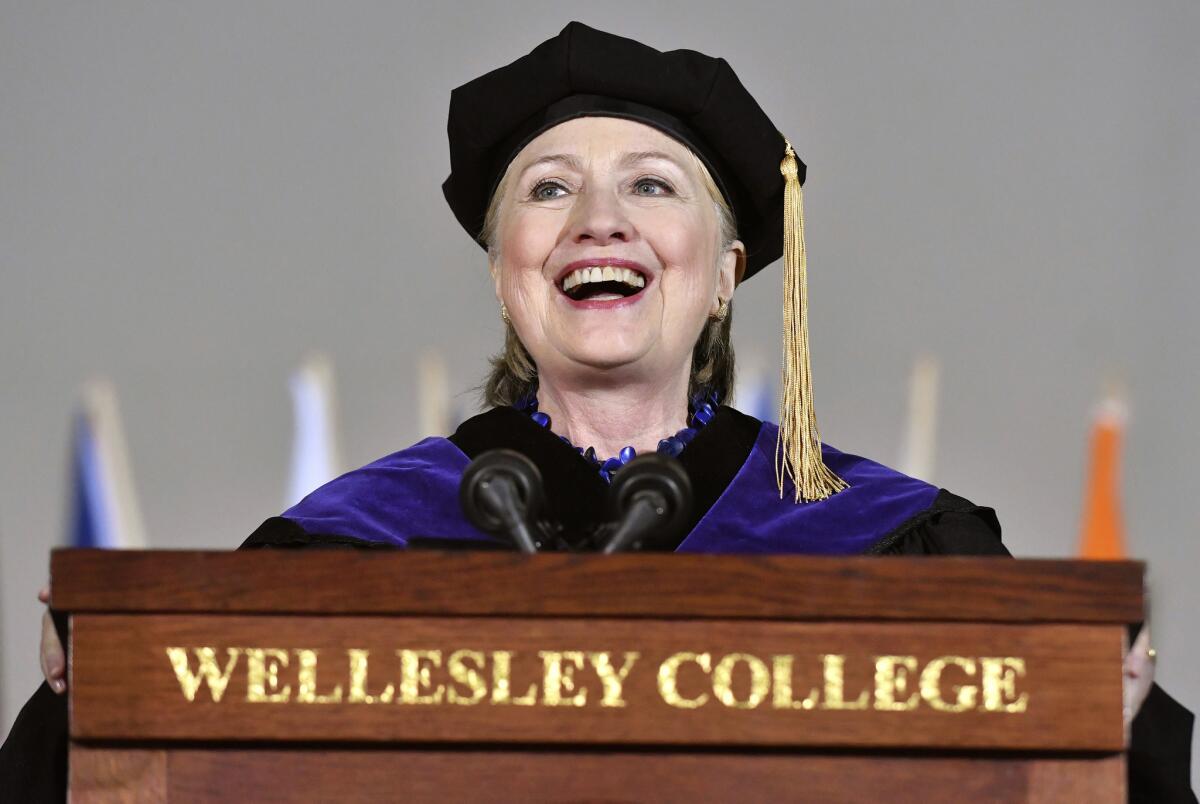
Hillary Clinton delivered a subtle dig at President Trump on Friday, offering some parallels between his presidency and that of former President Nixon.
While delivering a commencement address at her alma mater, Wellesley College, a private women’s liberal arts school in Massachusetts, Clinton, without naming Trump, recalled how many young people in the 1970s reacted to Nixon’s reelection and later battles with the Justice Department.
“We were furious about the past presidential election of a man whose presidency would eventually end in disgrace with his impeachment for obstruction of justice,” she said, pausing to note she was referring to Nixon.
Actually, Nixon was not impeached, though many in Congress, including members of his own party, called for it. Clinton said Nixon’s resignation came after he fired “the person heading the investigation into him at the Department of Justice.”
In 1973, Nixon ordered Justice Department officials to fire a special prosecutor who was looking into taped conversations recorded in the Oval Office as part of the Watergate investigation. A year later, in August 1974, Nixon resigned.
Some political observers – mostly Democrats -- have compared Trump’s recent firing of FBI Director James B. Comey, who was overseeing an investigation of possible collusion between Russians and Trump’s campaign, to Nixon’s actions. Last week, Rep. Al Green (D-Texas) called for Trump to be impeached.
Clinton, who has made few public appearances since Trump defeated her in last year’s presidential election, also assailed the Republican’s new budget proposal.
She called the budget, which proposes cuts to education and Medicaid, “an attack of unimaginable cruelty on the most vulnerable among us — the youngest, the oldest, the poorest and hard-working people who need a little help to gain or hang on to a decent, middle-class life.”
In a statement, the Republican National Committee said Clinton was “lashing out” after her election loss.
Clinton graduated from Wellesley in 1969 and last delivered a commencement address at the school in 1992.
- Share via
At G-7 Summit, a day of clarification for the White House
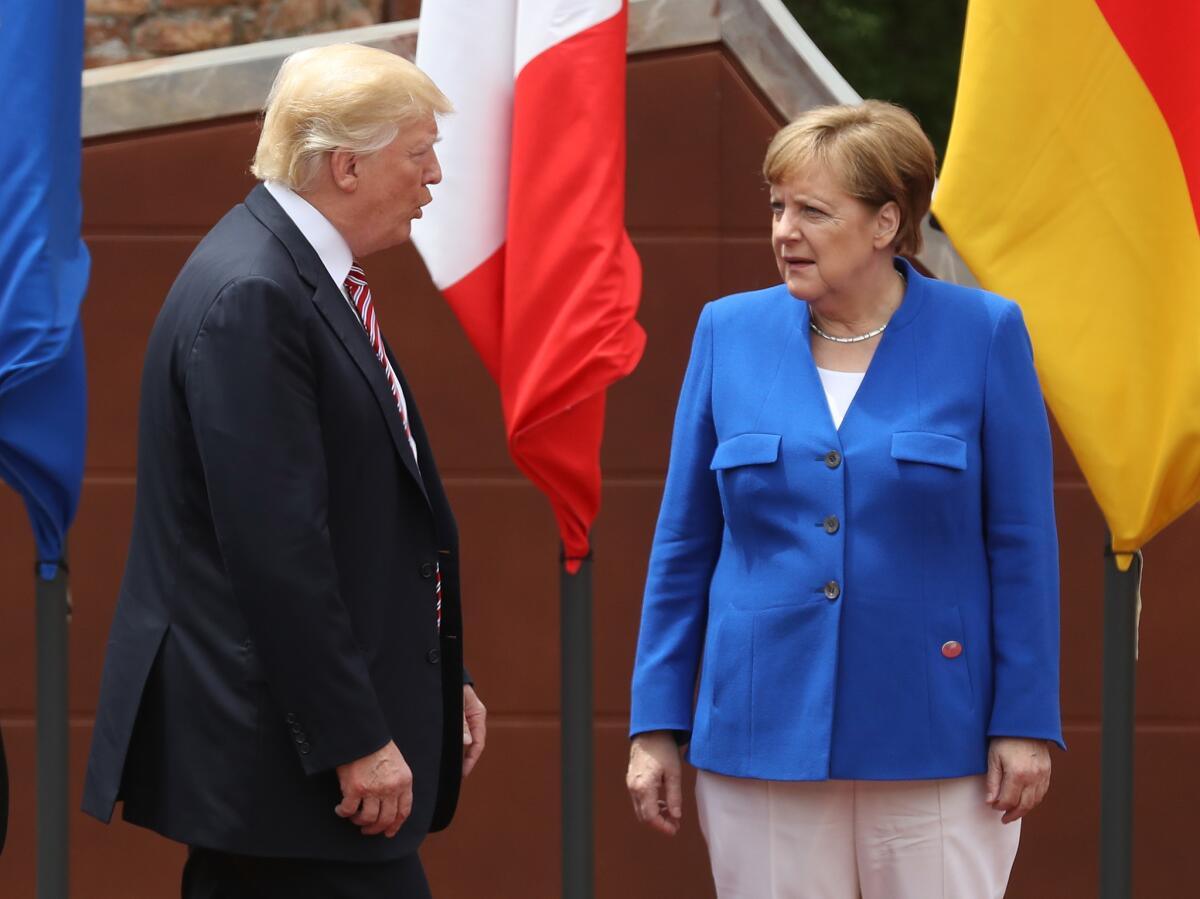
As President Trump met with leaders of the world’s leading economies here Friday within miles of an active volcano, the White House was working to ease a pair of diplomatic eruptions.
Trump was due to meet with British Prime Minister Theresa May on the sidelines of the G-7 Summit in this coastal Sicilian resort town, amid tensions between their countries, longtime allies, following leaks to U.S. media outlets involving Britain’s investigation of the Manchester terrorist bombing.
Separately, a top White House adviser partially confirmed reports that Trump had said Germany is “very bad” during Thursday’s NATO meetings in Brussels, but clarified that the president was referring only to German trade policies.
Trump said, according to the German magazine Der Spiegel, “See the millions of cars they are selling to the U.S.? Terrible. We will stop this.”
Gary Cohn, director of the National Economic Council, acknowledged that Trump made the remark but added that the president “doesn’t have a problem with Germany.”
“He said his dad is from Germany. He said I don’t have a problem with Germany, I have a problem with German trade,” Cohn said.
Press access to the G-7 meetings has been extremely limited, though the surrounding setting has produced abundant compelling visuals.
Trump tweeted that he expected to spend the day focused on economic growth, terrorism and security. The summit, and Trump’s eight-day inaugural foreign trip, ends Saturday.
Other allies here were likely to press Trump on another issue: climate change, specifically whether Trump will carry out his campaign promise to pull the United States out of the landmark Paris climate deal.
Trump was hoping to better understand the European position, Cohn said. White House officials have said the president will make a decision once he is back in the United States.
“He knows that in the U.S. there’s very strong opinions on both sides but he also knows that Paris has important meaning to many of the European leaders. And he wants to clearly hear what the European leaders have to say,” Cohn said.
- Share via
As Trump wavers over Paris climate accord, European leaders give him an earful

With President Trump balking on his vow to shred the Obama-negotiated Paris agreement on climate change, the last place the pact’s staunch opponents wanted to see the president is where he will be this weekend — meeting other world leaders unanimous in their warnings that withdrawal from the accord would seriously damage America’s economy and world stature.
Trump has repeatedly delayed fulfilling his campaign pledge to move against the agreement. The longer the White House deliberates over Paris, the more Trump seems to be searching for a face-saving excuse to walk back his previous position.
The White House indecision over the climate accord — which has the support of every nation except Syria and Nicaragua — reflects a deeply divided worldview in a Trump inner circle now packed with establishment Republicans.
The issue also presents yet another policy reckoning for Trump. On the campaign trail, he vowed to strike blows against the existing world order. But on the Paris agreement, as on other matters, he is finding that political backup for such pledges can fade quickly when the moves lack robust support from major U.S. companies or majority voting blocs.
- Share via
Watch Live: Hillary Clinton delivers commencement speech at Wellesley College
- Share via
Overcoming assault charge, Republican Greg Gianforte wins Montana congressional seat
Republican Greg Gianforte overcame a last-minute assault charge to win Montana’s special congressional election Thursday, keeping its lone House seat in GOP hands and dealing Democrats a setback in their bid to gain a red-state toehold ahead of the 2018 midterm election.
Gianforte, 56, a wealthy businessman who ran unsuccessfully for governor in November, had long been the front-runner against Democrat Rob Quist, a professional bluegrass musician making his first run for public office.
With more than 90% of the votes counted, Gianforte was holding a healthy lead with just over 50% support.
Appearing at an exuberant victory rally in Bozeman, the congressman-elect hushed the crowd and apologized to the reporter with whom he tangled on election eve, reversing his campaign’s initial assertion that the journalist was to blame.
- Share via
FBI investigating Kushner meetings, report says; House leader seeks more Comey documents
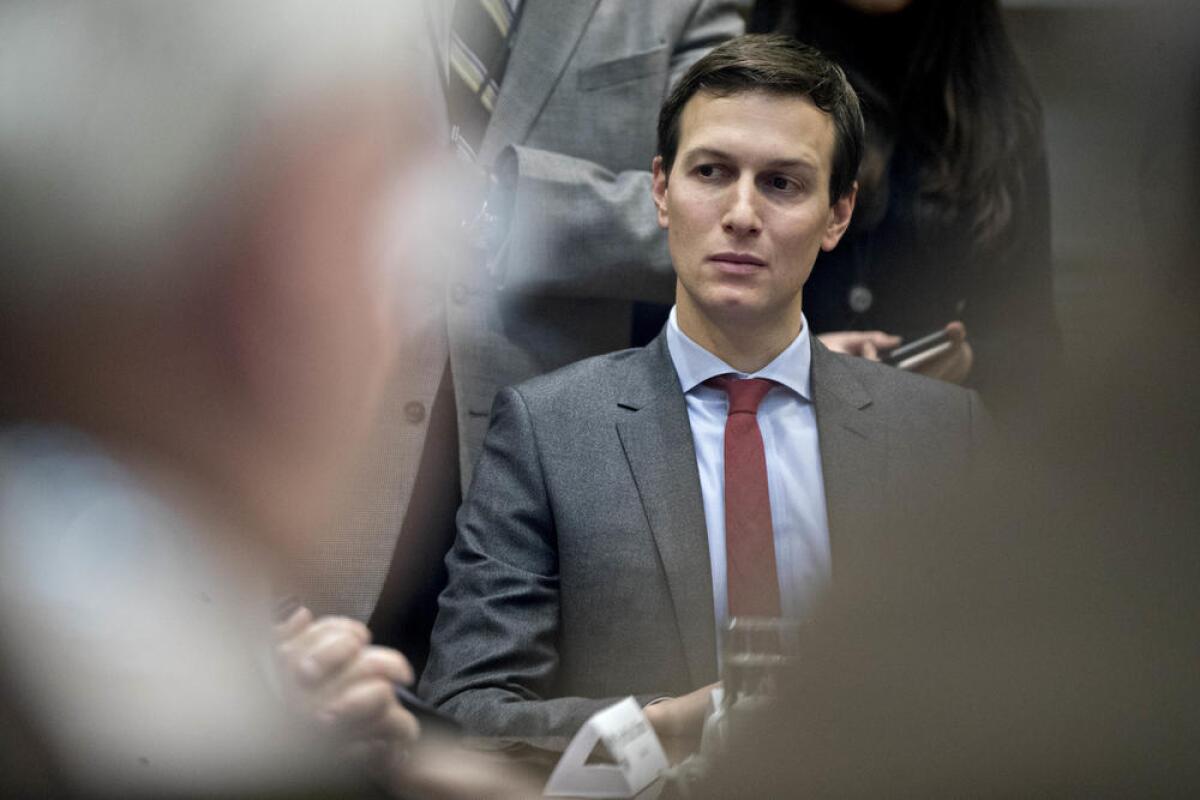
The chairman of the House Oversight Committee asked the FBI on Thursday to turn over more documents about former FBI Director James B. Comey’s interactions with the White House and Justice Department, including materials dating back nearly four years to the Obama administration.
Meanwhile, the Washington Post reported that the FBI is investigating meetings that President Trump’s son-in-law, Jared Kushner, had in December with Russian officials.
The FBI and the Oversight Committee — as well as several other congressional panels — are looking into Russian meddling in the 2016 presidential election and possible connections between Russia and the Trump campaign. Trump fired Comey on May 9 amid questions about the FBI’s investigation, which is now being led by special counsel Robert S. Mueller III, a former FBI director.
Kushner, a key White House advisor, had meetings late last year with Russia’s ambassador to the U.S., Sergey Kislyak, and Russian banker Sergey Gorkov.
The Post story cited anonymous “people familiar with the investigation,” who said the FBI investigation does not mean that Kushner is suspected of a crime.
Kushner’s attorney, Jamie Gorelick, released a statement saying: “Mr. Kushner previously volunteered to share with Congress what he knows about these meetings. He will do the same if he is contacted in connection with any other inquiry.”
Earlier Thursday, House Oversight Committee Chairman Jason Chaffetz told acting FBI Director Andrew McCabe that he wants records of Comey’s contacts with the White House and Justice Department dating to September 2013, when Comey was sworn in as FBI director under President Obama.
In a letter to McCabe, Chaffetz said he is seeking to review Comey’s memos and other written materials so he can “better understand” Comey’s communications with the White House and attorney general’s office.
- Share via
Banks want higher debit-card ‘swipe fees,’ but an effort to allow them has crumbled
Banks had hoped Congress would let them charge merchants higher fees to process debit card purchases, but an effort to allow that has crumbled — a victory for retailers and, possibly, shoppers who might have had to shoulder those costs.
In the latest chapter of a long-running fight, a repeal of federal limits on so-called swipe fees no longer will be part of a House financial regulation bill, said the legislation’s author, Rep. Jeb Hensarling (R-Texas).
Hensarling, chairman of the House Financial Services Committee, said he decided to strip the provision from the bill because many lawmakers are balking at removing the limits.
- Share via
Appeals court rules against Trump travel ban
A federal appeals court has ruled against President Trump’s travel ban, upholding a nationwide injunction barring the administration from enforcing the executive order.
The ruling is the latest legal setback for Trump on the travel issue and, like several previous court rulings, the outcome rested heavily on his own words.
Trump’s order restricting travel from six majority-Muslim countries “speaks with vague words of national security, but in context drips with religious intolerance, animus and discrimination,” Chief Judge Roger L. Gregory of the 4th Circuit Court of Appeals wrote in his ruling.
Read the 4th Circuit’s decision to uphold the block on Trump’s travel ban
The 10-3 ruling included numerous citations to campaign statements in which Trump called for a ban on Muslims immigrating to the United States. The plaintiffs who have challenged the travel order have argued that it is a disguised version of the Muslim ban that he called for during the campaign.
Trump’s statements “provide direct, specific evidence of what motivated both EO-1 and EO-2,” the court said, referring to ther first and second versions of the travel order: “President Trump’s desire to exclude Muslims from the United States.”
The 4th Circuit, based in Richmond, Va., is one of two appeals courts that have recently heard arguments on the travel ban. A similar case is pending before the 9th Circuit, based in San Francisco.
- Share via
Obama, in Berlin with Merkel, says world ‘can’t hide behind a wall’
Hours before German Chancellor Angela Merkel flew to Brussels to meet with President Trump and other NATO heads of state, she rekindled an old acquaintance with Trump’s predecessor, Barack Obama.
About 70,000 people packed an avenue by Berlin’s landmark Brandenburg Gate on Thursday to hear the two leaders speak, with cheers and chants of “Barack, Barack!” breaking out when the former president took the stage.
Without mentioning Trump by name, Obama spoke of the need for universal healthcare and a nuanced approach to immigration in response to security threats.
“This is a new world we live in — we can’t isolate ourselves,” the former president declared, with Merkel looking on. “We can’t hide behind a wall.”
Obama spoke of this week’s deadly bombing at a pop concert in Manchester, England, saying leaders had to find ways to balance security fears and fundamental rights.
“One of the biggest challenges… is how do you protect your country and your citizens from the kinds of things that we just saw in Manchester,” he said. “And how do you do it in a way that is consistent with your values and your ideals?”
Making his first European speech since his presidential term ended, Obama told the crowd he had spent the last four months “trying to catch up with my sleep” and devoting more time to his family.
“I’m very proud of the work I did as president,” he said to more cheers, adding that he considered healthcare reform a signature achievement. Republicans are now in the midst of trying to dismantle his Affordable Care Act.
“My hope was to get 100% of people healthcare,” he said. “We didn’t quite achieve that, but we were able to get 20 million people healthcare who didn’t have it before.”
Obama’s speech was not timed to coincide with Trump’s first visit to Europe as president, aides said. The invitation was extended before Trump’s trip to Brussels — the fourth leg on multi-stop tour — was scheduled.
- Share via
Macron says he pressed Trump on climate accord
French President Emmanuel Macron, who met President Trump for the first time on Thursday, said he urged the U.S. leader to respect the Paris climate accord.
The White House, however, did not mention the issue in its readout on Trump’s working lunch in Brussels with the newly elected French president.
Macron told reporters as he headed into the meeting that climate change would be one of the issues he raised, along with concerns about terrorism and the economy. Afterward, at a news conference, the French president said that in his talk with Trump, he “reiterated the importance” of the landmark climate accord.
“No hasty decision on this subject should be taken by the U.S.,” Macron said. “Our collective responsibility is to make sure this commitment remains a global commitment.”
Referring to the agreement, he added: “It’s one of a kind.”
In its readout, the White House said Trump urged Macron to meet NATO commitments on French defense spending and help ensure that the alliance is “focused on counter-terrorism.”
It also said the two leaders talked about the importance of defeating Islamic State and “other vital issues.”
- Share via
Trump lawyers ask Supreme Court to reject 2nd Amendment claim by men who lost gun rights over nonviolent crimes
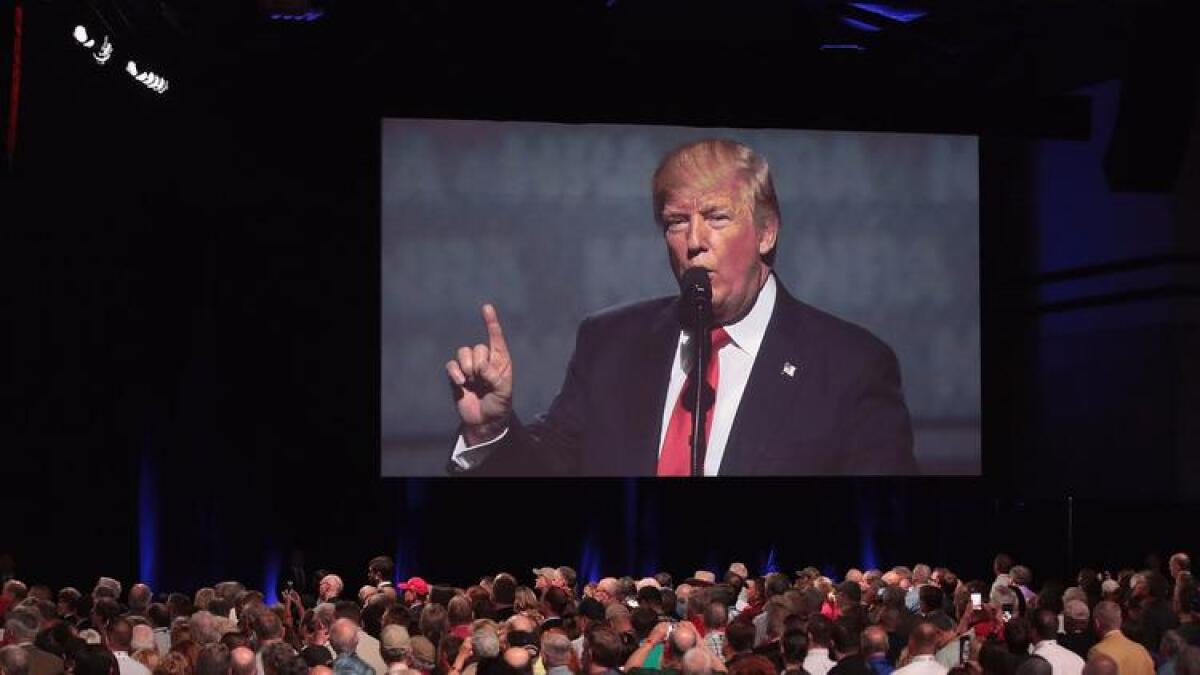
Trump administration lawyers are urging the Supreme Court to reject a 2nd Amendment claim that would restore the right to own a gun for two Pennsylvania men who were convicted more than 20 years ago of nonviolent crimes.
The case of Sessions vs. Binderup puts the new administration in a potentially awkward spot, considering President Trump’s repeated assurances during the campaign that he would protect gun ownership rights under the 2nd Amendment.
But the Justice Department under Trump has embraced the same position in this case that was adopted under President Obama: to defend strict enforcement of a long-standing federal law that bars convicted criminals from ever owning a gun, even when their crimes did not involve violence.
- Share via
Former Sen. Joe Lieberman withdraws from FBI director search
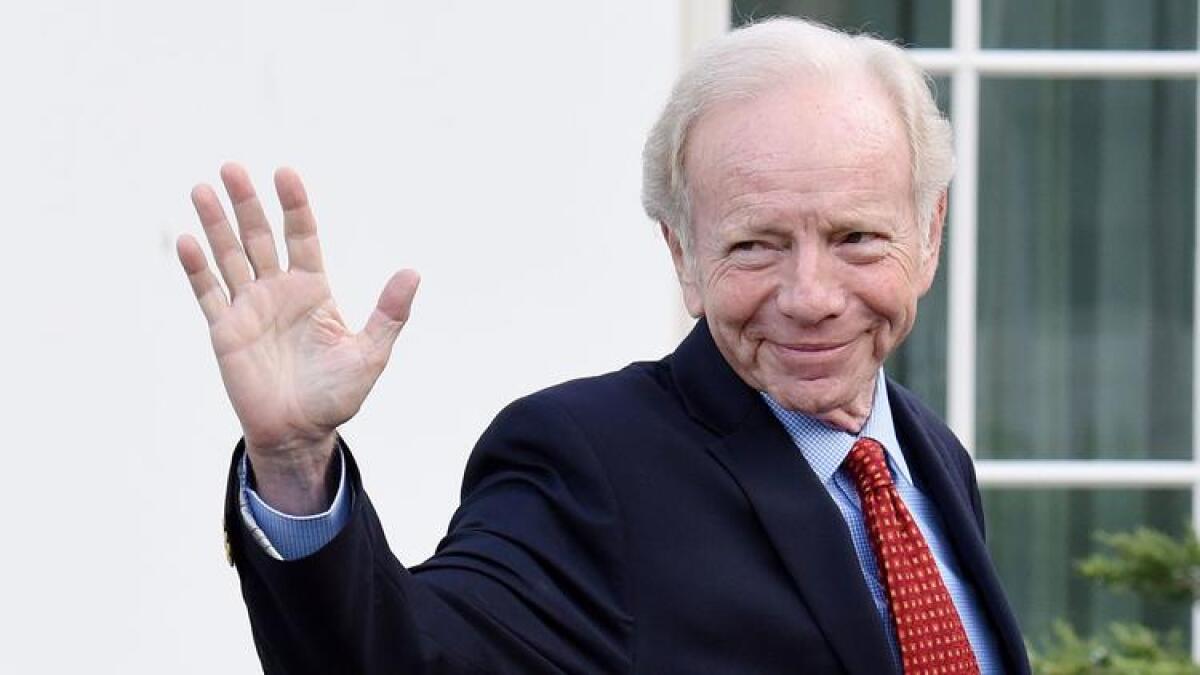
Former Sen. Joe Lieberman of Connecticut has withdrawn his name from consideration for the role of FBI director. Lieberman interviewed last week with President Trump, who publicly identified him as a leading candidate.
But in a letter sent to the White House, Lieberman says he’s pulling out.
He says he wants to avoid the appearance of a conflict of interest, given Trump’s hiring of one of Lieberman’s law partners to represent him in the investigation of ties between Russia and the Trump campaign.
The White House declined to comment. Several other people interviewed for the job have also withdrawn from consideration.
Trump fired former FBI Director James B. Comey earlier this month.
- Share via
At NATO celebration, Trump tells allies to spend more on defense
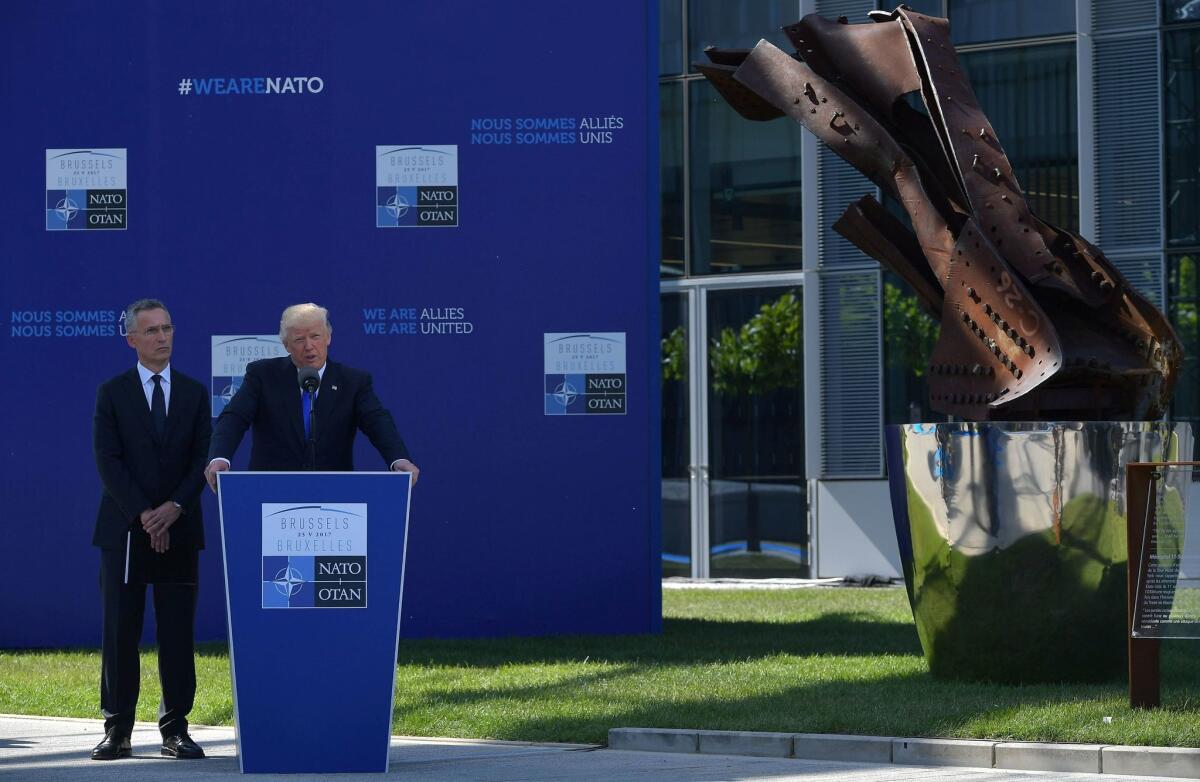
President Trump used his first NATO meeting to rebuke member nations who fail to meet the trans-Atlantic alliance’s defense spending target, saying American taxpayers unfairly are left to pick up the slack.
Speaking at dedication ceremonies for NATO’s new headquarters, Trump noted that the defense budgets of 23 of the 28 members don’t meet a target equal to 2% of each respective nation’s economic output, while the United States has spent more on defense in eight years than the other 27 combined.
“Many of these nations owe massive amounts of money from past years,” he said. “We have to make up for the many years lost.”
By his scolding, Trump was directly delivering to NATO allies the criticism that was a staple of his nationalist campaign for president. But his lecture came at an event intended to be celebratory, showcasing unity and resolve for the nearly 70-year-old alliance: the dedication of its shining, glass-enclosed new headquarters in Belgium’s capital.
The ceremony also was meant to call attention to the fact that the only time NATO has invoked its collective defense agreement was on behalf of the United States, after the Sept. 11, 2001, attacks on New York and Washington. Trump stood beside a section of wrenched steel from the downed World Trade Center Towers, a relic NATO calls the “Article V artifact,” to signify that post-9/11 invocation of the NATO charter’s article holding that an attack on any one member would be considered an attack on all.
Speaking to reporters before the president arrived, NATO Secretary-General Jens Stoltenberg acknowledged that the alliance had a “long way to go” to meet its goals.
“But it’s much better than it was just two years ago,” he said. “The reality is that when we decrease defense spending when tensions are going down, as we did after the end of the Cold War, we have to be able to increase defense spending when tensions are going up. And now we see that tensions are going up.”
- Share via
Watch: Trump lectures NATO leaders on defense spending

As NATO leaders looked on, President Trump told NATO members that they must “finally contribute their fair share” of defense payments.
President Trump lectured members of the NATO alliance on Thursday, urging them to pay their fair share on defense.
As NATO leaders looked on during a ceremony at the alliance’s new headquarters, Trump said that member nations must “finally contribute their fair share” and meet their obligations.
The president has been urging NATO leaders to live up to a 2011 decision to increase spending on defense to 2% of GDP by 2024.
Trump said 23 of the 28 member nations are not paying what they should and that the situation is “not fair” to the people of the United States.
- Share via
President Trump promises to review Manchester investigation leaks after anger from Britain
Trying to head off a diplomatic rift with Britain, President Trump on Thursday issued a statement promising “a complete review” of possible intelligence leaks related to this week’s deadly terrorist attack at a Manchester concert.
Some British officials have suggested that U.S. officials are leaking sensitive information to American media outlets about the investigation into the attack.
The New York Times posted forensic photographs collected from the scene of the Manchester concert bombing, which upset British officials. Whether the photographs were provided by U.S. officials or came from some other source is not publicly known.
Trump avoided questions earlier Thursday about the possible leaks. His statement came just before he was set to address NATO at its new headquarters in a speech considered pivotal to his first trip abroad as president. British Prime Minister Theresa May was expected to confront Trump over the issue when they meet later in the day.
May told reporters as she entered the NATO gathering that she would make clear to Trump that intelligence shared between law enforcement agencies “must remain secure.”
“We have a special relationship with the USA. It’s our deepest defense and security partnership that we have,” she said. “Of course that partnership is built on trust, and part of that trust is knowing that intelligence can be shared confidently, and I will be making clear to President Trump today that intelligence shared between law enforcement agencies must remain secure.”
In his statement, Trump said that “the alleged leaks coming out of government agencies are deeply troubling.”
“These leaks have been going on for a long time, and my Administration will get to the bottom of this. The leaks of sensitive information pose a grave threat to our national security.”
The statement continued with a promise to request “the Department of Justice and other relevant agencies to
launch a complete review of this matter, and if appropriate, the
culprit should be prosecuted to the fullest extent of the law.”
Trump also reiterated said there is “no relationship we cherish more” than the special relationship between the two countries.
Separate leaks within his own administration and related to investigations of his campaign ties to Russia have also been a source of anger to Trump.
- Share via
Montana’s congressional election: that assault charge, the Trump factor, and why is it on a weird day (Thursday)?
It’s election day in Montana after a wild 24 hours, with voters deciding who will fill the House seat vacated when Republican Ryan Zinke left to head the Interior Department under President Trump.
The contest Thursday has drawn nationwide attention and an extraordinary amount of money — and that was before the GOP front-runner was accused of attacking a national political reporter.
The events have turned the contest into one of the strangest in memory.
- Share via
Trump ignores questions about intelligence sharing ahead of NATO meeting
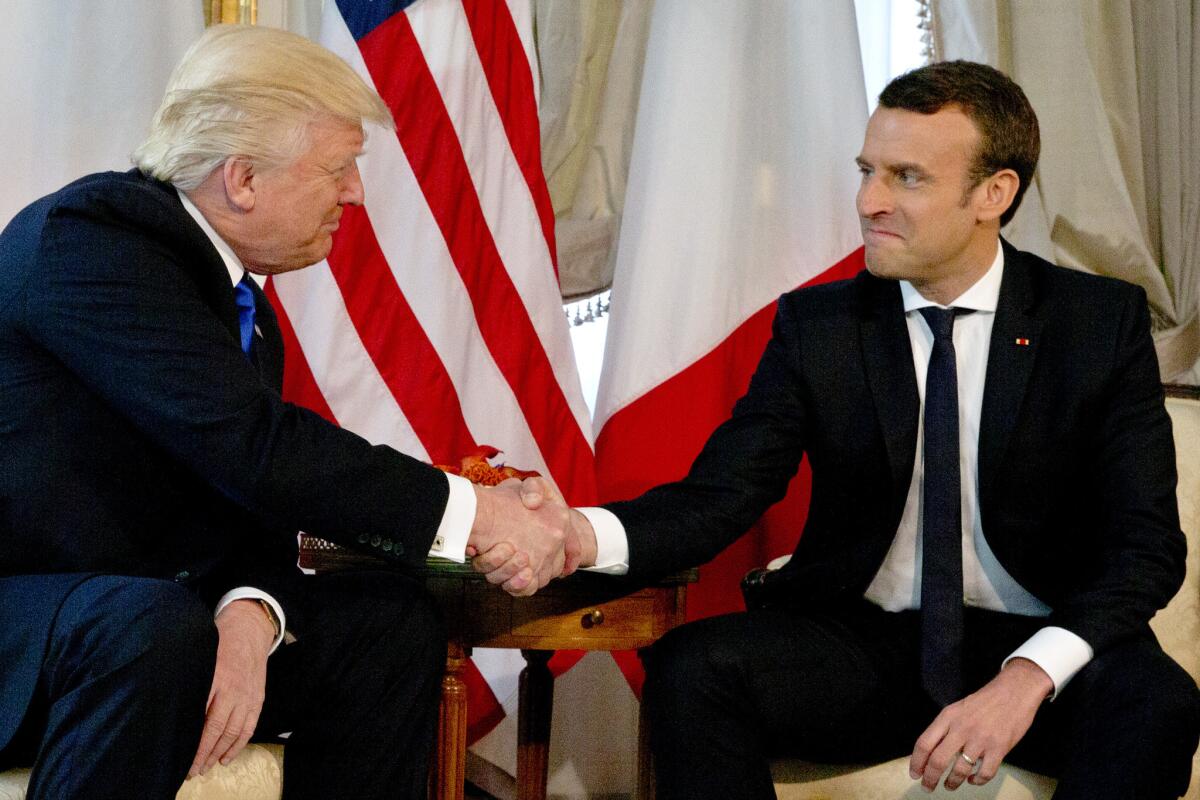
President Trump refused to answer questions Thursday about concerns among key allies on intelligence sharing with the United States, just as he prepares to join many of them here to inaugurate the new NATO headquarters.
During a brief photo opportunity at his first meeting with Emmanuel Macron, France’s newly elected president, Trump for a second time remained silent as a reporter asked about a potential breakdown in the U.S.-United Kingdom intelligence-sharing relationship.
British Prime Minister Theresa May is expected to press Trump on the issue when they meet later Thursday, after the New York Times posted forensic photographs collected from the scene of the Manchester concert bombing. The acting U.S. ambassador to Britain told the BBC that the leaks were “deeply distressing.”
Speaking to reporters at the site of a NATO leaders meeting, Canadian Prime Minister Justin Trudeau also deflected questions about whether the incident has led him to reevaluate his nation’s intelligence-sharing arrangements.
“We will continue to work with all our allies to keep Canadians and all citizens around the world safe,” he said.
Ahead of a working lunch with Macron, Trump said terrorism was at the top of the agenda, while also offering his congratulations to the 39-year-old for his “tremendous victory.”
“All over the world, they’re talking about it,” he said.
In addition to terrorism and the economy, Macron said he planned to discuss climate change and energy. His nation hosted the climate summit that produced the agreement under which countries pledged to reduce their carbon emissions, of which the Trump administration is considering dropping out.
Trump also ignored a question about whether former national security advisor Michael Flynn should cooperate with the investigations into Russian meddling in the 2016 presidential election. Trump has no news conference scheduled with reporters for the entirety of his eight-day foreign trip, which ends Saturday.
- Share via
Trump visits European Union headquarters; EU leaders cite some differences
Donald Tusk, the president of the European Council, said Thursday that differences remain between the Trump administration and the European Union on Russia, energy and trade.
“I am not 100 percent sure that we can say today… that we have a common opinion about Russia,” Tusk, a former Polish prime minister who is sometimes called “the other Donald,” said after a meeting with President Trump at EU headquarters.
Tusk added that while some issues “remain open, like climate and trade,” the leaders agreed “first and foremost” on the need to combat terrorism.
EU officials were skeptical in advance of Trump’s visit. Their concerns were driven in part by the U.S. leader’s positive stance on Britain’s vote last year to leave the bloc. Trump at the time called it a “great idea.”
However, he has since spoken of the importance of European unity.
European officials are also concerned that the Trump administration might withdraw from the 2015 Paris climate agreement to limit global warming, and turn away from trade arrangements with the EU.
Trump’s visit to Brussels marked the fourth leg of his first overseas trip. Before heading into the talks with Tusk and European Commission President Jean-Claude Juncker, he spoke enthusiastically about his earlier stops in Saudi Arabia and at the Vatican.
His ceremonial welcome last week in the Saudi capital of Riyadh, Trump told the European officials, was “beyond anything anyone’s seen.” The Saudis staged elaborate festivities including a traditional sword dance.
And the president called his private encounter with Pope Francis on Wednesday “very impressive.” The president and the pontiff met privately for half an hour, and Francis presented Trump with gifts including a copy of a papal encyclical on climate change.
“The pope was terrific,” Trump said.
After the visit to the EU’s sprawling new headquarters, Trump headed to a luncheon with the newly elected French president, Emmanuel Macron. The two men were meeting for the first time.
During the French presidential campaign, Trump had praised Macron’s far-right opponent Marine Le Pen for her tough positions on immigration and borders, but he had stopped short of endorsing her.
- Share via
Manchester attack makes terrorism the focus of Trump’s NATO meeting
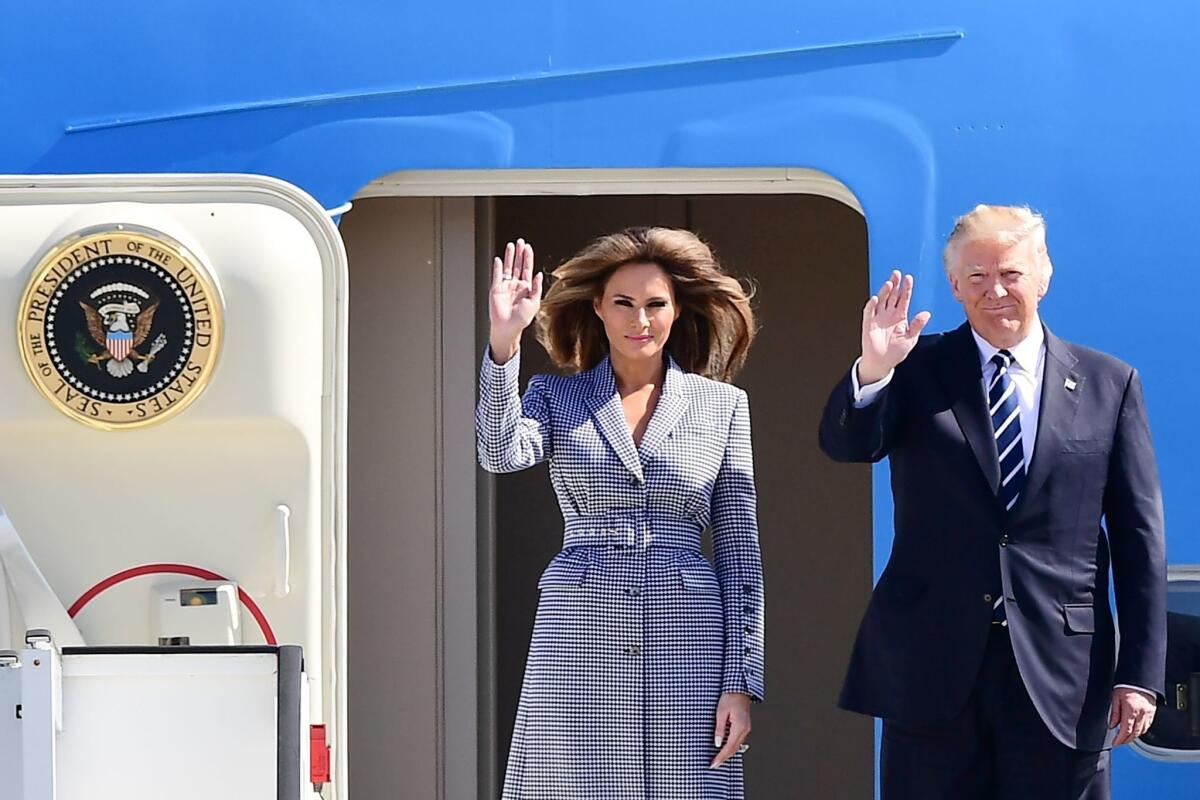
The deadly suicide bombing in Britain and threats of more attacks thrust counter-terrorism to the top of President Trump’s agenda for talks with NATO leaders here on Thursday, buttressing his bid to enlist the alliance he had called obsolete to join the fight against Islamic State.
Secretary of State Rex Tillerson, anticipating the alliance meetings, told reporters flying with the president to Brussels from Rome, where Trump met Pope Francis earlier Wednesday, that Monday’s attack in Britain “is going to strengthen the resolve in this fight against terrorism.”
Tillerson stopped short of predicting that NATO would agree to formally join the U.S.-led coalition fighting Islamic State in Syria and Iraq, but said it “would be a really important step” if the alliance did so.
The attack, which killed 22 people at a pop concert and was said to be the work of a 22-year-old British man whose family is from Libya, also figured in Trump’s brief meeting with the pope at the Vatican.
- Share via
Some quick analysis of the CBO’s report on the Republican healthcare bill
The Times’ Cathleen Decker is looking through the Congressional Budget Office’s report on the American Health Care Act, the Republican healthcare bill that has passed the U.S. House and is also known as AHCA. Here are a few takeaways.
- Share via
Analysis says 23 million more people would be uninsured by 2026 under GOP healthcare bill
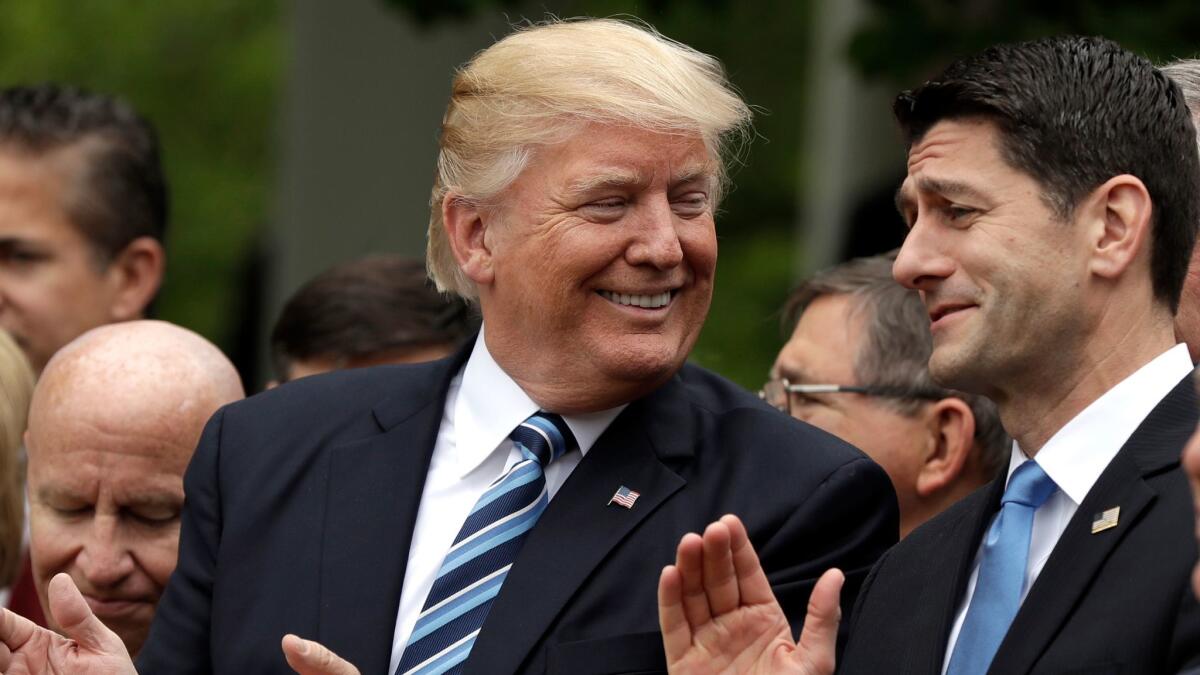
An analysis released Wednesday by the nonpartisan Congressional Budget Office finds that the Republican healthcare bill that passed the House earlier this month would nearly double the number of Americans without health insurance over the next decade.
The report likely will complicate Republican efforts to get the controversial bill through the Senate.
- Share via
By throwing America’s lot in with Sunni Arabs, does Trump miss opportunities with Iran?
On his first official trip to the Middle East, President Trump has resoundingly thrown America’s lot in with Sunni Arab states and cast Shiite Iran as a global pariah, even as Iranians reelected a president who has offered to work with the West.
During his two days in Riyadh, Trump’s full-throated support for the autocratic monarchies in Saudi Arabia and other Gulf states, as well as his fierce denunciation of Iran, allowed him to claim an historic new coalition of interests.
In the next two days, in Jerusalem, he doubled down and argued that Israel and the Arabs should join forces against Iran and along the way, resolve Israel’s conflict with Palestinians in a grand bargain that has eluded diplomats for decades.
But as he departed for Rome on Tuesday, Trump had little to show beyond lofty rhetoric, symbolic visits and a shower of flattery from kings, potentates and a prime minister.
- Share via
Fed officials appear ready for another interest rate hike and are considering how to reduce assets
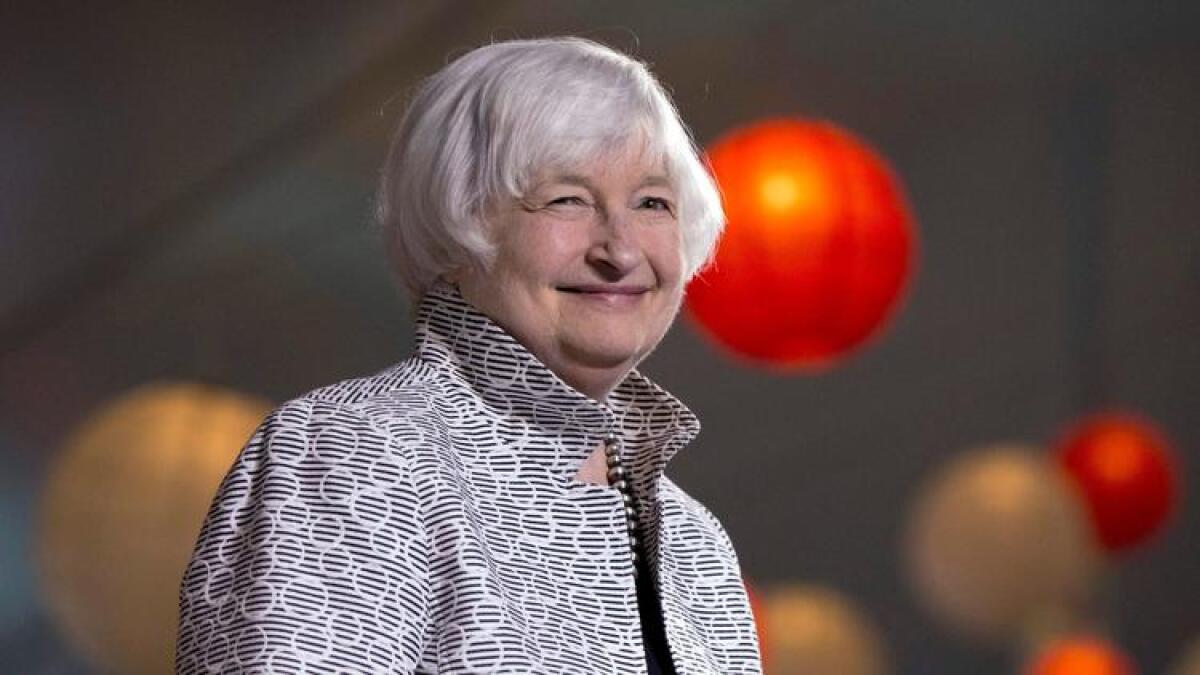
Most Federal Reserve monetary policymakers indicated they were ready for another small interest rate hike -- perhaps as soon as next month -- if economic data strengthened as expected following a weak winter, according to an account released Wednesday of their most recent meeting.
Fed officials also considered a plan to start reducing the $4.5 trillion in Treasury and mortgage securities and other assets the central bank has purchased since 2008 in an attempt to stimulate the economy.
The plan, which they said likely would begin later this year, would involve slowly allowing some of the maturing securities to be cashed in instead of reinvesting the money in new securities, the meeting minutes showed.
The goal would be to avoid roiling financial markets and causing interest rates to jump.
- Share via
So what’s with the president and Melania Trump holding, or not holding, hands?
First Lady Melania Trump does not say much in public, but her actions seemed to speak louder than words – or at least sent tongues wagging – when she appeared to rebuff the president’s proffered hand as the couple descended from their plane in Rome late Tuesday.
As President Trump looked to take her hand on the steps of Air Force One, Melania Trump quickly moved it out of reach, raising it to her head to adjust her hair.
That made for two such episodes in two days. She had appeared to brush Trump’s hand away at the airport in Tel Aviv during the previous stop in the president’s foreign tour. Video of that scene, often accompanied by snarky commentary, quickly went viral.
Compare that to Melania Trump’s positively hands-on visit on Wednesday to a Rome children’s hospital, Bambino Gesu, following the couple’s visit with Pope Francis.
After praying to a statue of the Madonna at the entrance to the hospital, the Catholic first lady smiled cheerfully and chatted to children, posing for selfies and providing a “very happy, maternal presence,” according to one onlooker.
“Great visiting you! Stay strong and positive! Much love, Melania Trump,” she wrote in the visitors’ book.
Staff at the hospital said Melania Trump had been buoyed by her meeting with Pope Francis, and further proof came when photos emerged of the Trumps’ quick visit to the Sistine Chapel on Wednesday.
As the president and first lady stood together to admire Michelangelo’s 16th century fresco, the Last Judgment, they held hands.
- Share via
House Intelligence Committee will subpoena Michael Flynn, Schiff says
The House Intelligence Committee is preparing to issue subpoenas to President Trump’s former national security advisor, Michael Flynn, according to the committee’s ranking Democrat, following the lead of the Senate Intelligence Committee.
Rep. Adam Schiff (D-Burbank) said the House subpoenas “will be designed to maximize our chance of getting the information we need” for the committee’s investigation of Russian meddling in the 2016 presidential campaign.
“I think we need to use whatever compulsory [processes] necessary to get the information that he possesses,” Schiff said.
Earlier this week, Flynn’s lawyers said he would refuse separate Senate subpoenas for any records about his former business dealings with Russia, citing his constitutional right to avoid self-incrimination.
The Senate committee then issued separate subpoenas to two of Flynn’s businesses, which the panel said were not entitled to 5th Amendment protections.
A federal grand jury in Virginia also has issued subpoenas regarding Flynn’s business dealings with Turkey and Russia, and the newly appointed special counsel investigating the Russia matter, Robert Mueller III, is expected to focus on Flynn’s role as well.
Given the criminal investigations, Schiff said the House panel is highly unlikely to grant Flynn’s earlier request, through his lawyers, for immunity in exchange for his testimony.
He said the panel would need more information about what Flynn would say and whether the testimony would be truthful. It also would need to ensure that granting immunity wouldn’t affect the special counsel’s ongoing investigation, he said.
“That’s not somthinge I think we would entertain until far later, if at all,” said Schiff, a former prosecutor. “Certainly count me as very skeptical that we would get to that point.”
Trump forced Flynn to resign as national security advisor in February after news accounts revealed Flynn had misled White House officials, including Vice President Mike Pence, about his contacts with Russian officials.
Schiff spoke to reporters at a breakfast Wednesday hosted by the Christian Science Monitor.
- Share via
Watch live: Education Secretary Betsy DeVos testifies on Trump’s budget
Follow live coverage from Times education reporter Joy Resmovits:
- Share via
Israel acknowledges ‘pinpoint’ change needed after Trump intelligence disclosure
After a week of silence, Israel publicly acknowledged for the first time, though in oblique terms, that it was the source of sensitive intelligence that President Trump shared with Russian Foreign Minister Sergey Lavrov last week in a White House meeting.
Defense Minister Avigdor Lieberman told Israel’s army radio on Wednesday that Israeli officials had carried out an internal “pinpoint correction” after discussing and reviewing the episode.
Lieberman did not elaborate, and declined to confirm or deny whether Trump’s remarks had endangered an agent of Israel. But he said his government considered the matter resolved.
“Everything that needed to be clarified with the friends in the U.S. was done,’’ he said. “All of the conclusions we had to draw – it was all done.’’
The Israeli defense minister’s comments came the day after Trump wrapped up a two-day visit to Israel and the West Bank. When word of Trump’s disclosure to Lavrov emerged in U.S. news reports last week, the defense minister and other Israeli leaders confined themselves to expressing public confidence in the two countries’ intelligence cooperation.
Israel did not comment more directly, presumably to avoid embarrassing the U.S. president just before his visit. But Trump himself mentioned the controversy anyway, in an awkward on-camera moment during the trip.
With Prime Minister Benjamin Netanyahu biting his lip alongside, Trump volunteered to reporters being hustled out of a news appearance: “Just so you know, I never mentioned the word or name ‘Israel.’ Never mentioned it during the conversation.”
News reports, however, had not said the president mentioned Israel in connection with the intelligence, only that the specificity of his remarks to Lavrov would in all likelihood have allowed the Russians to determine the source.
The White House at first denied Trump’s disclosure to Lavrov had occurred as reported, but then the president himself tweeted about it, saying he had the right to share information as he deemed fit.
- Share via
Trump calls meeting with Pope Francis an ‘honor’
President Trump held a half-hour private meeting with Pope Francis at the Vatican on Wednesday, declaring it a “great honor” despite their past public dissension.
The unconventional Republican and the first Jesuit pontiff made for an unlikely pair in the Vatican’s Apostolic Palace, where Catholic leaders have presided or centuries and American presidents have come or decades.
Francis was silent as the two sat across one another at the pope’s wooden desk to begin the audience at approximately 8:30 a.m. local time. Exactly a half-hour later, the ringing of a bell signified the end of the private encounter.
For the White House, the Vatican stop caps a tour through key sites of the world’s three major religions, following stops in Saudi Arabia and Israel, designed to promote tolerance and a united approach to terrorism.
“When you put it all together, you’re really showing that this problem of radical extremism is one of the great problems of our time,” a senior Trump aide told reporters Tuesday en route from Israel to Rome, briefing anonymously as is common White House practice. “By putting everybody together you can really build a coalition and show that it’s not a Muslim problem, it’s not a Jewish problem, it’s not a Catholic problem, it’s not a Christian problem, it really is a world problem.”
In an exchange of gifts after their private meeting, Francis offered the president a medal by a Roman artist of an olive, a symbol of peace.
“We can use peace,” Trump responded.
Where Trump’s and Francis’ interests may align on peace and combating terrorism, they disagree sharply on issues like immigration and poverty.
Like Trump, the Argentine pope has shown a predilection for unscripted comments that have shaken the staid Vatican bureaucracy, as when he criticized candidate Trump’s proposed stricter immigration policies including a border wall as “not Christian.” Trump fired back, calling the pope’s remarks “disgraceful.”
Any animosity was not apparent Wednesday, as a meeting between Francis and a larger U.S. delegation ended.
“Thank you. I won’t forget what you said,” Trump said.
- Share via
Proposed budget would deeply cut State Department and its programs

The State Department leadership voiced support for President Trump’s proposed budget, which would impose deep cuts on spending for diplomacy and foreign aid, but critics vowed to fight to restore the funds in Congress.
In a statement, the department said the president’s $37.6-billion request for it and for the U.S. Agency for International Development would support “a leaner, more efficient government” in line with Trump’s “America first” mantra.
If approved by Congress, that would represent a reduction of roughly 30% from the current fiscal year.
Nongovernmental agencies that receive State Department support to carry out humanitarian and other work around the globe expressed deep alarm.
The State Department statement said its new priorities would include efforts to counter terrorism, support Israel, promote border security and battle transnational crime and the spread of infectious diseases.
The statement makes no mention of women-empowerment programs or efforts to fight climate change, issues that rose to prominence under the Obama administration.
The proposed budget would allow the United States to “remain engaged” in the United Nations, but officials would seek a “more fair distribution of the funding burden,” the statement said.
And it would eliminate “direct funding for quasi- and non-governmental organizations that serve niche missions.”
The American Jewish World Service, which fights poverty all over the world through 450 local organizations, said much of its work would be jeopardized.
“At a time when poverty, human rights abuses, famines and conflicts are wreaking havoc globally,” said the group’s president, Robert Bank, “the United States must not abdicate its long bipartisan tradition of providing development assistance and diplomatic support to the most vulnerable people around the world.”
Mercy Corps, a U.S.-based development and advocacy organization that works in 40 countries, said “gutting development programs” was “short-sighted” and “absolutely shameful” and could put millions of lives at risk.
Rep. Eliot Engel (D-N.Y.), ranking member of the House Committee on Foreign Affairs, called the budget “cruel and mean-spirited” and said it would force the United States to abandon “our global role as a champion for freedom, democracy and the rule of law.”
“If President Trump thinks the United States can shrink into a defensive crouch without long-term repercussions, he’s sorely mistaken,” Engel said.
- Share via
Subpoenas issued for Flynn’s businesses; contempt charge remains an option, senators say
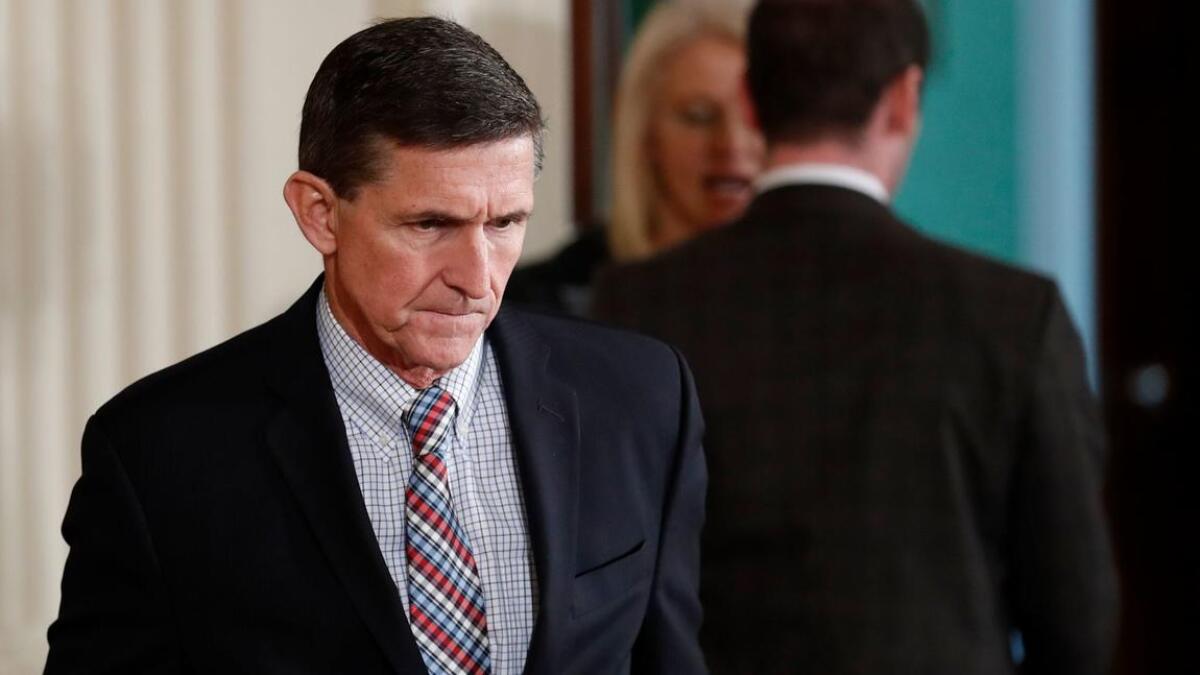
The Senate Intelligence Committee issued two subpoenas Tuesday for Michael Flynn’s businesses after President Trump’s former national security advisor refused to testify before the panel.
Chairman Richard Burr (R-N.C.) and Vice Chairman Mark Warner (D-Va.) announced their decision as the committee continues to pursue Flynn’s assistance in the probe of Russian interference in the 2016 election and possible links to Trump’s campaign.
Warner said the subpoenas to Flynn Intel LLC and Flynn Intel Inc. were being issued on the premise that companies cannot similarly invoke the 5th Amendment right not to testify, as the former NSA chief did.
The panel’s action came at the close of an intense day of testimony on Capitol Hill as former CIA Director John Brennan appeared before the House Intelligence Committee and Dan Coats, who is Trump’s director of national intelligence, appeared before a Senate panel.
Coats was also being invited to appear before the Senate Intelligence Committee, Warner said.
Trump forced Flynn to resign in February over the former general’s failure to disclose to White House officials the details of his interactions with Russian officials. The New York Times has since reported that the White House knew before naming Flynn to the post that he was under federal investigation for his secret lobbying for Turkey.
Flynn, who often warmed up the crowds at Trump campaign rallies, has been central to the Russian probe because of his contacts with Russians during and after the presidential campaign.
The committee also sent Flynn’s lawyer a letter Tuesday pushing back on his reasons for not sharing documents with the committee as it pursues his testimony.
Burr reiterated that while the panel preferred not to hold Flynn in contempt “everything is on the table.”
“That’s not our preference today,” Burr told reporters. “We would like to hear from Gen. Flynn. We’d like to see his documents. We’d like him to tell his story because he publicly said I’ve got a story to tell.”
- Share via
Sessions’ first proposed budget: A crackdown on immigration and violent crime
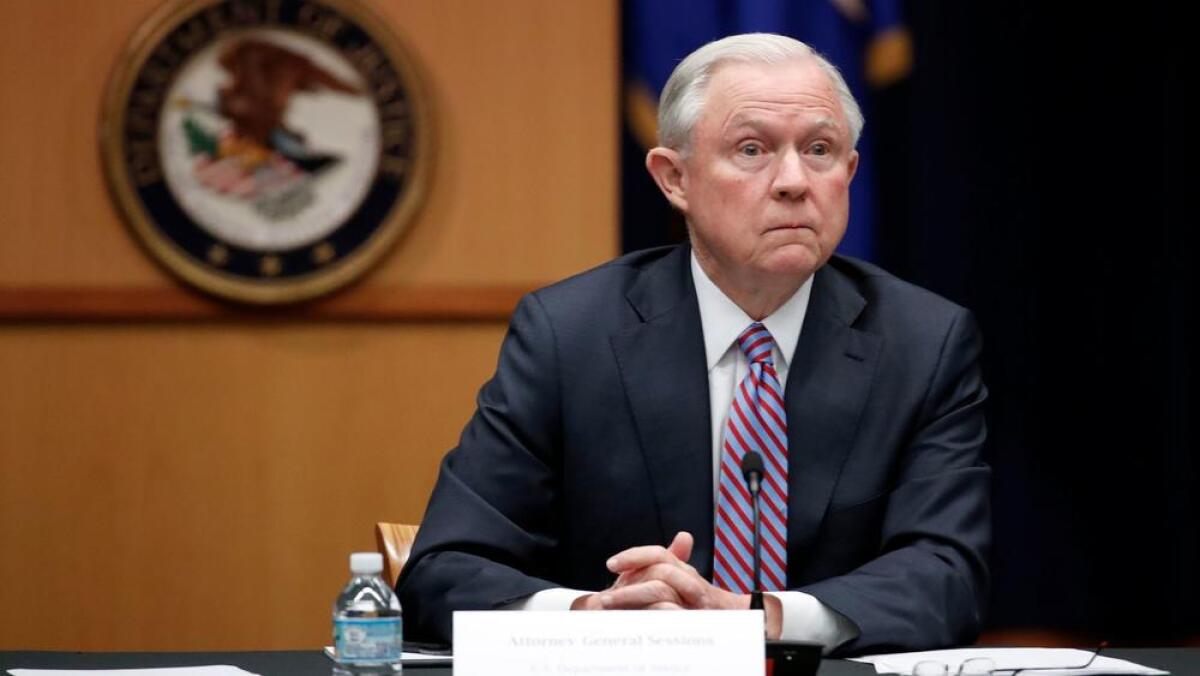
In the first budget proposal under President Trump and Atty. Gen. Jeff Sessions, the Justice Department is seeking hundreds of millions in new funding to pay for an immigration crackdown on the border and a surge in resources to fight violent crime.
Like the Department of Homeland Security budget, which includes billions for expanded immigration detention, more border agents and technology to catch those crossing the border illegally, the Justice Department budget is a reflection of the new get-tough policies promised by Sessions. The budget asks for another 300 federal prosecutors – 230 to focus on violent criminals and gangs, and another 70 to concentrate on filing criminal charges on those crossing the border illegally.
The shift in the spending priorities are in line with other policy changes ordered by Sessions, including a renewed focus on seeking stiff mandatory minimum sentences for drugs and other crimes.
The $27.7-billion budget seeks 450 new attorneys and support workers for the immigration courts, which are now clogged with a backlog of 560,000 cases. There would also be another $50 million for increased immigration detention, plus 40 new U.S. marshal jobs to help take care of the expected increase in immigrants heading to federal court.
With Trump’s immigration initiatives tied up in federal court, the budget seeks another 15 lawyers to handle that litigation, plus 12 more to help handle property acquisition needed for Trump’s promised Southwestern border wall.
Violent-crime enforcement would get another $198 million, with the largest amount, $70 million, going toward setting up more anti-violence and gang task forces. Deputy Atty. Gen. Rod J. Rosenstein said more resources are needed because of what he called an “alarming increase” in the rates of murder and other violent crimes. The department is also asking for another $40 million for more drug enforcement to combat the opioid epidemic, which he said is spreading “havoc throughout the United States.”
Sessions’ new policies should lead to an increase in prison population, so the budget contains funding to fully open a new supermax prison in Thomson, Ill., with room for 1,500 to 2,000 inmates.
The department also wants to put more resources behind the FBI’s efforts to counter cyber attacks and to figure out ways around encryption technology, along with another 50 agents to counter foreign intelligence and threats from homegrown terrorists.
- Share via
Economists say Trump’s budget proposal doesn’t add up
President Trump’s inaugural budget proposal claims to eliminate the nation’s deficit in 10 years, thanks largely to faster economic growth that it projects will come from the president’s sweeping tax cuts.
Never mind the overly optimistic projections on economic growth. Or that Trump’s tax overhaul has not happened yet. Even allowing for both, economists say Trump’s budget still does not add up.
The administration is counting on generating $2.1 trillion in additional revenue over 10 years from better economic growth. But Trump’s budget proposal leaves out the cost, or the revenue lost, from the massive tax cuts.
In other words, the economic gains that the administration has said it would use to pay for tax reform is apparently also being counted on to pay for deficit reduction. Some people call that double-counting.
“You can’t use the same money twice,” said Marc Goldwein, a senior vice president for the Committee for a Responsible Federal Budget, a nonpartisan group that advocates keeping government budgets under control.
Lawrence Summers, former Treasury secretary in the Clinton administration and top economic advisor to President Obama, called it an elementary but “egregious accounting error.”
Douglas Holtz-Eakin, president of the right-leaning American Action Forum and former director of the Congressional Budget Office, said the proposal did not necessarily mean there was an outright omission or a double-counting.
It’s possible that the administration is looking for such strong economic growth to drive significantly extra revenue from payroll taxes, he said, or it could be that Trump officials were using different base lines from which they were drawing their results. But on the face of it, he said, the budget and tax-plan numbers “don’t seem to match.”
The Committee for a Responsible Federal Budget has estimated that Trump’s plan to cut corporate and individual taxes would cost the federal government about $5.5 trillion over 10 years, adding more than $6 trillion to the national debt.
Details of Trump’s tax overhaul, however, are still being developed, and it’s possible that the administration is assuming a revenue-neutral tax plan — although experts say big tax cuts never pay for themselves.
On Tuesday, Mick Mulvaney, Trump’s budget chief, did not provide a direct answer or explanation to questions about double-counting. Instead, he told reporters that “you have to make assumptions about a budget.” He went on to say that one of the assumptions that was not made was to take into account the uncollected taxes every year, which he said amounted to $486 billion last year.
“And we don’t assume an additional penny of that being closed as part of our tax reform,” said Mulvaney, director of the Office of Management and Budget.
Of the 3% annual economic growth assumption, Mulvaney responded that the Obama administration in its first couple of years had based its budget on growth of 4.5%.
In fact, Obama’s first budget proposal as president, in May 2009, assumed economic growth of between 4% and 4.6% for the budget years 2011 to 2013.
Since the Great Recession ended in mid-2009, the U.S. economy has been growing on average about 2% a year, and the Congressional Budget Office, the Federal Reserve and most private economists see the economy advancing at about 2% annually over the next 10 years.
Alice Rivlin, a former Fed vice chair and director of the Office of Management and Budget under Clinton, said it’s true that the Obama administration’s growth assumptions proved too optimistic. But she noted that those projections were not unreasonable for that time and period in the economic cycle.
Then, there was greater potential for growth with unemployment high and many more people than today available for work. Today, the economy is nearing its eighth year of expansion, and the jobless rate is 4.4%, at or near full employment.
With the aging of baby boomers, labor force growth slowing, and lackluster productivity gains, economists see the current moderate growth persisting for the foreseeable future.
“This has been a very long period of growth and we’re at the high end already,” Rivlin said. “If we are so lucky to have continuous, steady growth, it’s not likely to be at 3% or 4% or 5%.”
- Share via
Who wins and who loses in Trump’s budget
The White House Office of Management and Budget sent Congress the president’s inaugural budget today, projecting spending and revenues over the next 10 years. The fiscal package, which include a partial “skinny budget” from March, reflects President Trump’s priorities for the nation, but lawmakers are sure to reject many of the deep cuts in domestic and foreign affairs programs.
The departments of State, Agriculture, Health and Human Services, Education and Housing, as well as the Environmental Protection Agency, are the biggest losers. The winners are the Pentagon and Homeland Security programs.
Even with the increases in defense spending and large tax cuts, the administration projects that economic growth spurred by tax cuts will erase annual deficits by 2027. Take a look at some of the numbers released today.
- Share via
Fox News retracts story alleging DNC staffer Seth Rich leaked information to WikiLeaks before death
Fox News has retracted a story it published on May 16 alleging that an FBI forensics examination showed that Democratic National Committee staff member Seth Rich leaked work emails to WikiLeaks before he was fatally shot.
Sean Hannity says ‘liberal fascism’ is behind efforts to get him fired over Seth Rich story >>
District of Columbia police have said they think Rich was killed in a random robbery attempt, but conspiracy theories have emerged about his death.
Federal and local law enforcement authorities say they have found no evidence that Rich sent any DNC information to WikiLeaks.
On Tuesday, Fox News removed the article and released the statement below.
- Share via
What that Montana special congressional race will — and won’t — tell us about Trump and his political problems
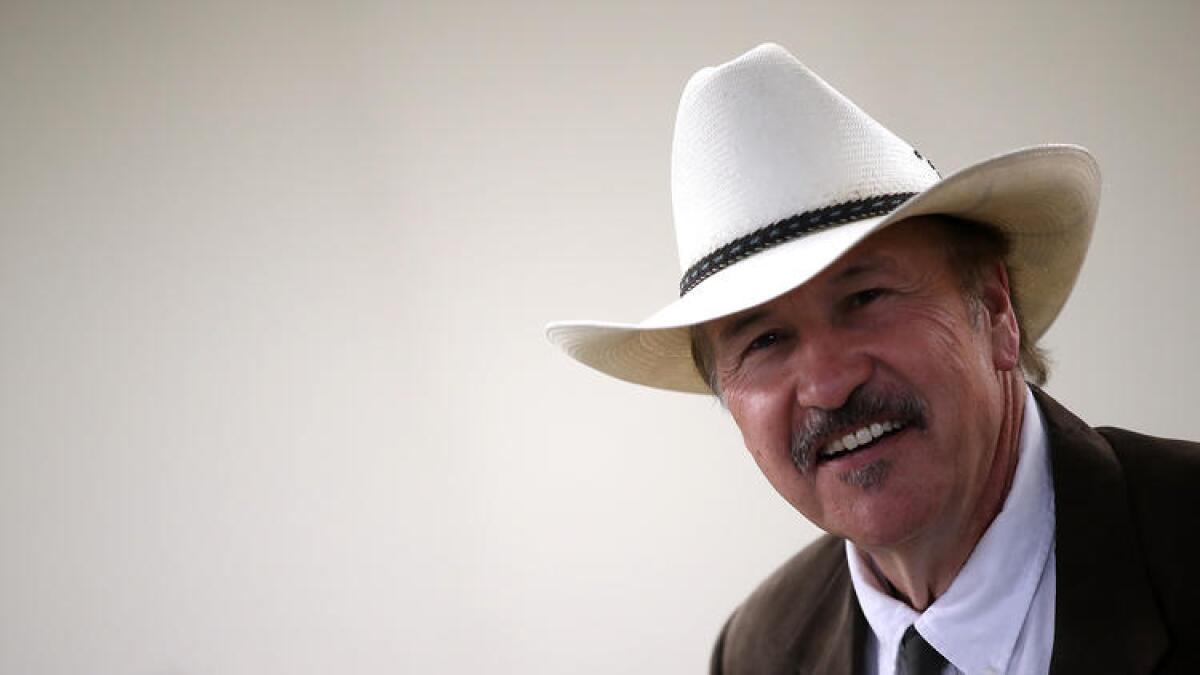
On Thursday, the political world will eagerly look to Montana and a closely fought congressional race for the latest test of Democratic strength and Republican resilience in the turbulent age of Trump.
The major candidates and outside groups have sunk more than $8 million into the contest, a huge sum in a state where $250,000 pays for a robust week of television advertising.
But for all that money and all the outside interest, the election will turn less on national trends than circumstances close to home: on the personalities and histories of the main contestants, their different campaign styles and, perhaps most of all, on who is regarded as the more authentic Montanan.
- Share via
Terrorist attack in England has conservative media focused on safety of allies

It’s a sight witnessed all too often: an explosion, screams, people sprinting to safety.
Late Monday night, this was the scene at an Ariana Grande concert in Manchester, England, after a man with possible ties to Islamic State militants set off a suicide bomb, killing 22 people and, once again, setting in motion a global discourse on how to fight terrorism.
President Trump, while visiting Bethlehem, said the attack was committed by “evil losers in life.”
Throughout the campaign and early in his presidency, Trump has said defeating the Islamic State is a top priority. (He reiterated that point in a speech Sunday in Saudi Arabia, urging Muslim leaders to plot their own course in combating terrorism.)
In recent months, with attacks in Berlin, Paris and London, conservative media have questioned the safety of Europe and warned that the United States could face similar attacks. With the latest attack, some on the right are again homing in on the safety of our allies.
Here are some of today’s headlines:
2017 has seen a terror attack attempted in Europe every nine days (Breitbart)
The attack in Manchester blankets the home page of the right-wing website.
Europe has indeed been the location of high-profile attacks this year. In Paris last month, Islamic State claimed responsibility for an attack on the Champs-Élysées in which a man fired an automatic weapon, killing a police officer. And in March, a man plowed his car into pedestrians on Westminster Bridge, near the British Parliament in London, and then fatally stabbed a police officer. In all, four people were killed and dozens injured in what police called a terrorist attack.
The Breitbart piece is an analysis of different terrorist attacks attempted and carried out in Europe since January.
“Attacks and attempted attacks have taken place in Austria, France, the United Kingdom, Belgium, Italy, Russia, Sweden, Norway, and Germany,” on average every nine days, the piece says.
Pence’s message of ‘civility and open debate’ lost on those who most needed to hear it (Weekly Standard)
The debate over free speech on colleges campuses continues.
In recent months, conservative speakers have canceled speeches on college campuses in the face of anticipated protests. And others, who have opted to speak, have faced vocal backlash.
On Sunday, as Vice President Mike Pence began to address students at the University of Notre Dame commencement, several dozen stood and walked out of the ceremony. In his speech, Pence talked about “civility and open debate,” and this piece argues that the message was lost on students.
“Today’s campus protesters control the story. It’s what primarily differentiates them from their hippie progenitors, pioneers in campus unrest who couldn’t count on an endless supply of retweets or an elite national press in step with their efforts,” writes Alice B. Lloyd. “And, at least in message, Pence pre-empted them: ‘This university is a vanguard of freedom of expression and the free exchange of ideas at a time, sadly, when free speech and civility are waning on campuses across America.’”
The impeachment delusion (American Spectator)
Some Democrats have already started saying the I-word when referring to Trump.
Yup – last week Rep. Al Green (D-Texas) called for the impeachment of Trump as the president faces continued questions about his ties to Russia and actions that potentially interfered with an FBI investigation.
But conservatives say such talk is nonsense.
“Political power games of the sort beloved in our nation’s capital, where everything in the world is political and nothing else matters, have catastrophic potential,” writes William Murchison of the impeachment talk. “Played fiercely and mercilessly enough, such games can bring ruin not just to the losers but even, in due course, to the winners. They exhaust and deplete and demoralize.”
- Share via
Trump’s budget arrives in Congress as most do, with a lot of talk and little action
President Trump’s budget landed on Capitol Hill the way White House fiscal proposals traditionally do — with a thud.
It wasn’t just Democrats who dismissed the blueprint as a “nightmare” scenario, with its beefed up military spending and tax breaks for the wealthy; Republicans also winced at steep domestic program cuts and rosy growth projections that may not achieve its promise of balancing deficits.
Administration budgets are largely viewed by Congress as a statements of a president’s priorities, rather than serious governing documents, and the lackluster reception to Trump’s 2018 blueprint was no different than others in recent years.
READ TRUMP’S $4.1-TRILLION BUDGET PLAN
Lawmakers have just a few months to ward off another shutdown crisis and Trump’s budget, which he dubbed “The New Foundation for American Greatness,” remains far from the deal Congress will need to strike later this year to keep government running.
“Clearly, Congress will take that budget and then work on our own budget, which is the case every single year,” said House Speaker Paul D. Ryan (R-Wis.) “But at least we now have common objectives.”
Trump’s budget aligns with many conservative priorities, particularly its promise to bring deficit spending to an end and achieve a balanced budget within 10 years.
That comes as no surprise after Trump, who confounded Republicans on the campaign trail for straying from conservative principles, tapped Mick Mulvaney, a former South Carolina tea party congressman, as his budget director.
Mulvaney helped orchestrate the 16-day government shutdown in 2013 over spending priorities, and his budget approach may prove too severe for even fellow Republicans.
Democrats seized the opportunity to link the White House to the most orthodox flank of the GOP, and Senate Minority Leader Charles E. Schumer (D-N.Y.) lambasted the budget as conservative “fantasy.”
“Trump’s budget exists somewhere over the rainbow where the dreams of Mick Mulvaney, Paul Ryan and the Koch brothers really do come true,” Schumer said, referring to the billionaire industrialists who fund conservative campaigns.
“What is going on in the White House with this kind of budget?” Schumer asked. “How many people in America want to cut cancer research? President Trump evidently does.”
Congress faces its own budget problems this year, as the Republican majority blew past the deadline for crafting a 2018 blueprint.
Republicans are trying to use the budget process to achieve their broader goals — repealing the Affordable Care Act, passing tax reform — but have become tangled in their own infighting on policy differences.
Democrats are likely to submit an alternative to Trump’s budget later this year after having declined to do so at times with Obama in the White House.
At some point, though, the aspirational documents will need to be put aside for an actual funding bill to keep government from shutting down once the 2018 fiscal year starts on Oct. 1.
That is likely to require a compromise between Republicans and Democrats over spending levels and priorities.
“Ultimately we will have to come up with a budget ourselves,” said Sen. John Cornyn of Texas, the No. 2 Republican.
- Share via
Video: Brennan is asked why Americans should care about Russian interference in the U.S. presidential election

Former CIA Director John Brennan was asked why Americans should care about the investigation into Russian interference in the 2016 U.S. presidential election.
Our ability to choose our elected leaders as we see fit is, I believe, an inalienable right that we must protect with all of our resources and all of our power.
— Former CIA Director John Brennan
- Share via
Former CIA Director John Brennan is asked about collusion with Russians

Former CIA Director John Brennan tells a Congressional panel investigating Russian efforts to interfere with the 2016 U.S. election that he was concerned about Trump campaign officials interactions “because of known Russian efforts to suborn such in
I encountered and am aware of information and intelligence that revealed contacts and interactions between Russian officials and U.S. persons involved in the Trump campaign.
— Former CIA Director John Brennan
- Share via
Read Trump’s $4.1-trillion budget plan
President Trump has sent Congress a $4.1-trillion spending plan that proposes to eliminate the deficit in a decade while protecting Social Security and Medicare.
But to achieve balance, Trump is seeking sharp cuts in a variety of programs for the poor, including Medicaid, food stamps and disability payments.
Administration officials say they want to tighten work requirements to get millions of people off government support programs and back into the labor force, saying that will help them achieve their ambitious goal of boosting economic growth on a sustained basis to 3% annual gains.
The submission will set off months of debate in Congress. Democrats have already voiced strong opposition to the plan, and even Republicans are wary of the political dangers in Trump’s draconian cuts.
- Share via
Former CIA chief John Brennan on classified intelligence leaks: ‘I find them appalling and they need to be tracked down’

Former CIA Director John Brennan discusses Trump allegedly sharing classified intelligence with Russia.
What I was very concerned about, though, is the subsequent releases of what appears to be classified information purporting to point to the originator of the information, liaison partners. They continue to be very, very damaging leaks, and I find them appalling and they need to be tracked down.
— Former CIA Director John Brennan
- Share via
Trump wraps up Israel and West Bank visit, heads to Europe
President Trump left Israel on Tuesday after making a final appeal for Mideast peace – but he offered few specific suggestions on how to go about resolving the conflict.
With Israeli VIPs looking on at Tel Aviv’s Ben Gurion airport, Trump boarded Air Force One and departed for Rome, ending his two-day visit to Israel and the West Bank.
In a speech delivered at the Israel Museum shortly before his departure, Trump reiterated that he was “personally committed to helping Israelis and Palestinians achieve a peace agreement.”
Speaking hours after having met Palestinian Authority President Mahmoud Abbas in the West Bank town of Bethlehem, the president declared that “the Palestinians are ready to reach for peace.”
He then appeared to put Prime Minister Benjamin Netanyahu somewhat on the spot. Gesturing toward the Israeli leader, the president added: “I can tell you also that he is reaching for peace. … Benjamin Netanyahu wants peace.”
At the airport, Trump and his entourage made their farewells as a trumpet sounded. Trump returned a military official’s salute.
Netanyahu accompanied Trump to the steps of Air Force One. At the top, the president and his wife, Melania, turned and waved farewell.
- Share via
Public opinion of NATO is improving in the U.S., poll finds

Before taking office, President Trump repeatedly questioned the utility of the North Atlantic Treaty Organization, calling the military alliance that has been a bedrock of Western security since 1949 “obsolete.”
Trump, who plans to attend his first NATO summit in Brussels on Thursday, has since voiced strong support for the security pact, and public opinion of it here in the United States has also improved, according to a poll released Tuesday.
More than 60% of Americans surveyed hold a favorable view of NATO, up from just over half a year ago, the Washington-based Pew Research Center found. Support is stronger among Democrats than among Republicans, it said.
The Trump administration has continued to assail NATO allies for not spending more of their own money on defense and has also pressed them to do more to fight terrorism. Just five of the 28 members — the U.S., Britain, Estonia, Greece and Poland — currently meet the alliance’s target of spending at least 2% of their gross domestic product on defense.
Still, most Europeans surveyed appear confident that the U.S. would honor its commitments under the NATO charter, which states that an attack against one member should be viewed as an attack against all. A median of 66% of those interviewed in seven European nations said they believed the U.S. would come to the defense of a NATO member if it were involved in a serious military conflict with Russia.
Asked about their own country’s obligations in such an event, more than half of respondents in the Netherlands (72%), Poland (62%), Canada (58%) and France (53%) said they believed their government should fulfill its commitment to mutual defense. But in Germany, which has the fourth largest defense budget in NATO, just 40% of respondents said they would back such assistance, Pew said.
The findings are based on interviews with 9,761 people in the U.S., Canada, France, Germany, the Netherlands, Poland, Spain, Sweden and Britain that were carried out between Feb. 16 and April 10.
- Share via
Palestinians underwhelmed by Trump’s West Bank visit
Many Palestinians seemed less than impressed by President Trump’s brief foray into the West Bank on Tuesday for talks in the town of Bethlehem with Palestinian Authority President Mahmoud Abbas.
Though Trump stood before a backdrop of Palestinian flags and listened to the playing of the Palestinian national anthem, the U.S. president’s remarks did not include any reference to a “two-state solution,” with Israel and a Palestinian state existing side by side.
“There’s not much detail there, as usual. It’s still in the realm of generalizations rather than a specific strategy or approach,’’ said Hanan Ashrawi, a senior official of the Palestine Liberation Organization.
Speaking by phone from Ramallah, the Palestinians’ de facto administration capital, Ashrawi said of Trump: “He’s still on a learning curve, and peacemaking is not a business deal.”
In Bethlehem, some Palestinians joked that the visit’s main achievement was that the municipality had cleaned the streets beforehand, said Akram Al Ayassa, an official with a Palestinian government commission.
Many Palestinians were already irked that Trump spent only about an hour with their leader over the course of his two-day trip to Israel and the West Bank. Locals in Bethlehem had also hoped Trump would visit the town’s most famous attraction, the Church of the Nativity, revered by Christians as the birthplace of Jesus.
The Arabic-language hashtag #45minutes was trending in social-media posts on the visit, said Bethlehem-based blogger and journalist Fadi Abu Sada, who called the Trump-Abbas meeting “public relations and nothing more.”
He said Trump’s White House meeting with Abbas earlier this month had briefly raised Palestinian expectations but wondered how long that initial optimism would last.
“For us, nothing has changed yet,” Abu Sada said. “Things on the ground are still the same.”
- Share via
Delayed retirement advisor rule will go into partial effect, but changes may still be possible
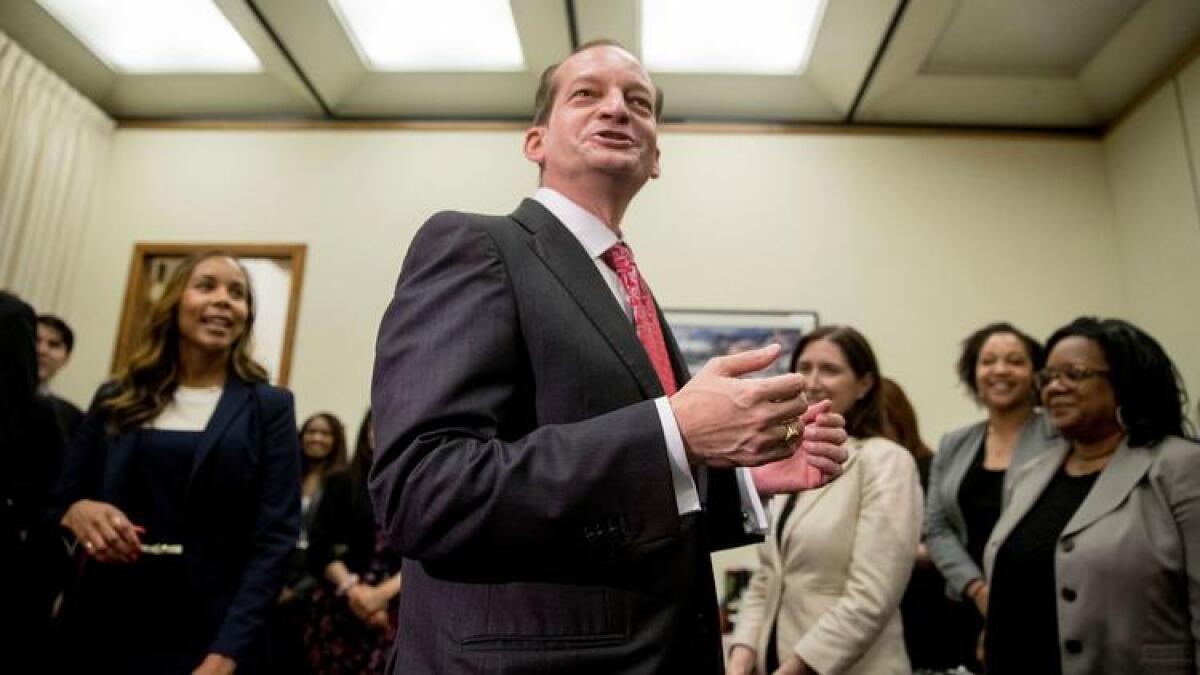
A controversial Obama-era rule for retirement advisors, delayed by a review ordered by President Trump because of strong Republican and financial industry opposition, will partially take effect next month, Labor Secretary Alexander Acosta said.
But Acosta indicated he has problems with the rule and that there still could be changes or a repeal before all of its provisions kick in next year.
The regulation, known as the fiduciary rule, requires investment brokers who handle retirement funds to put their clients’ interests ahead their own compensation, company profits or other factors.
- Share via
Trump visits Israel’s Holocaust memorial
President Trump, visiting Israel’s national Holocaust memorial, paid solemn tribute Tuesday to the 6 million Jews killed by the Nazis, calling it “history’s darkest hour.”
At the memorial, Yad Vashem, Trump lighted an eternal flame and laid a wreath honoring the victims. He called the Nazi campaign of extermination against European Jewry “the most savage crime against God and his children.”
“Millions of wonderful and beautiful lives -- men, women and children -- were extinguished as part of a systematic attempt to eliminate the Jewish people,” said the president. “It is our solemn duty to remember, to mourn, to grieve and to honor every single life that was so cruelly and viciously taken.”
Trump’s 30-minute visit, on his second and final day in Israel, was briefer than his hosts had wanted. Almost all foreign dignitaries who come to Jerusalem make a lengthy stop at the museum and memorial.
Though short, the visit had emotional moments. Trump was presented with a replica of a personal album that had belonged to a 16-year-old Holocaust victim, Ester Goldstein. Her surviving sister, Margot Herschenbaum, burst into tears after Trump shook her hand.
Trump and his wife, Melania, were accompanied by Trump’s daughter Ivanka, a convert to Judaism, and her husband, Jared Kushner, an Orthodox Jew.
In remarks delivered after the flame-lighting ceremony, Trump hailed the “unbreakable spirit of the Jewish people.” Prime Minister Benjamin Netanyahu, speaking after him, called Trump’s visit “historic” because he was the first American president to include Israel on his first overseas trip as president.
- Share via
Trump travels to West Bank for talks with Palestinian leader
President Trump traveled to the West Bank Tuesday to meet Palestinian Authority President Mahmoud Abbas, pledging to do “everything I can” to bring Israel and the Palestinians toward a peace accord.
To reach the biblical town of Bethlehem, Trump’s motorcade passed through the security barrier closing off the West Bank from Israel.
In remarks delivered as the two leaders sat together, Trump said he looked forward to working with both Abbas and Israeli Prime Minister Benjamin Netanyahu “toward a lasting peace.”
Trump added that “if Israel and the Palestinians can make peace, it will begin a process of peace all throughout the Middle East, and that would be an amazing accomplishment.”
Abbas, speaking through a translator, said he hoped to “keep the door open to dialogue with our Israeli neighbors.” But he stressed that Palestinian demands remain unchanged: a Palestinian state with its capital in east Jerusalem.
“Our Palestinian people’s attainment of their freedom and independence is key to peace and stability in the world,” he said. “The problem is not between us and Judaism. It is between us and occupation.”
The two leaders shook hands, but their body language was far more stiff and formal than the warmth and friendliness displayed in Trump’s encounters with Netanyahu since his arrival on Monday.
During joint appearances in Jerusalem on Monday, Netanyahu addressed the president as “Donald” and spoke repeatedly of the unbreakable bond between the U.S. and Israel.
- Share via
Trump budget shows tiny surplus in 10 years, with rosy economic forecast and trillions in domestic cuts
President Trump in his first full budget says he will produce a surplus in a decade, though his fiscal path relies on projections of growth more optimistic than government and private-sector economists expect and deep cuts in anti-poverty programs such as Medicaid.
The budget to be released Tuesday will show that the annual federal deficit, which was $585 billion in the fiscal year that ended Sept. 30, will steadily decline until fiscal year 2027, when the nation will have a $16-billion surplus — the first since the start of the George W. Bush administration, though small in the context of what by then would be a nearly $6-trillion budget.
Nonpartisan budget watchers and even many Republicans are sure to be skeptical. Trump promises to reach balance and even produce a small surplus while he is calling for the deepest tax cuts in history, hefty increases in military and homeland security spending, and no reductions in Medicare and Social Security, the entitlement programs that are a main driver of projected federal debt because of the aging population.
- Share via
Mourning Manchester victims, Trump condemns ‘evil losers’ behind terrorist acts
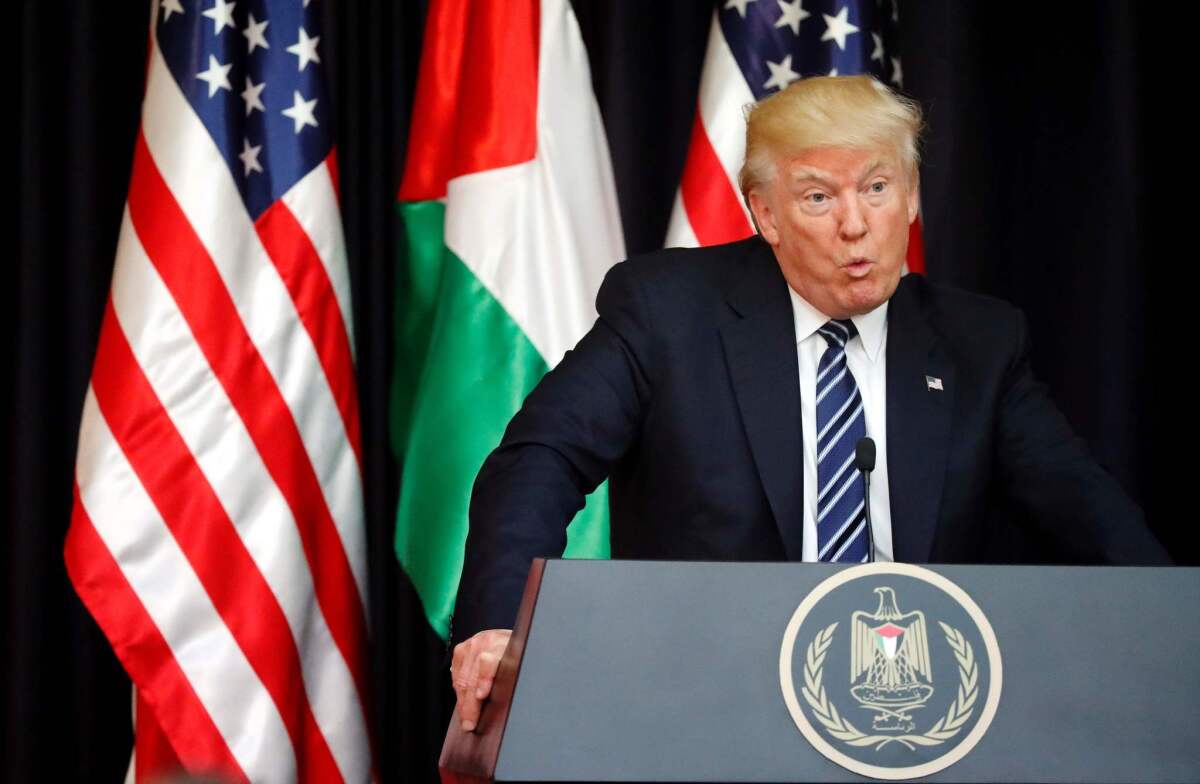
President Trump expressed sympathy for the victims of Monday’s suicide bombing in the United Kingdom and a blunt rebuke for the “evil losers” he said are behind acts of terrorism.
In remarks with Palestinian Authority President Mahmoud Abbas, Trump said the world should have no tolerance for those who cause such bloodshed, particularly when directed at innocents like those killed at an Ariana Grande Concert in Manchester.
“I won’t call them monsters because they would like that term. They would think that’s a great name. I will call them from now on losers, because that’s what they are,” Trump said. “They’re losers. And we’ll have more of them. But they’re losers. Just remember that.”
Preventing terrorist violence is a chief goal behind his international trip, Trump said. The trip so far included a gathering of Arab leaders in Saudi Arabia at which Trump urged his listeners to step up efforts to “drive out” terrorists from their nations.
“I was gratified that President Abbas joined the summit and committed to taking firm but necessary steps to fight terrorism and confront its hateful ideology,” Trump said. “It’s so interesting that our meeting took place on this very horrible morning of death to innocent young people. Peace can never take root in an environment where violence is tolerated, funded and even rewarded.”
Abbas also condemned the “horrible terrorist attack,” before turning to the focus of his discussions with the president: new efforts to reach a peace agreement with Israel.
He said he hoped that Trump would go down in history as the president who finally brokered an Israeli-Arab agreement, adding that his discussions with Trump, both Tuesday and last month at the White House, had given the entire region hope of a breakthrough.
Trump said he would do “everything I can” to bring about peace.
“President Abbas assures me he is ready to work towards that goal in good faith, and Prime Minister Netanyahu has promised the same,” he said. “I look forward to working with these leaders toward a lasting peace.”
- Share via
Trump condemns ‘evil losers’ behind the Manchester attack
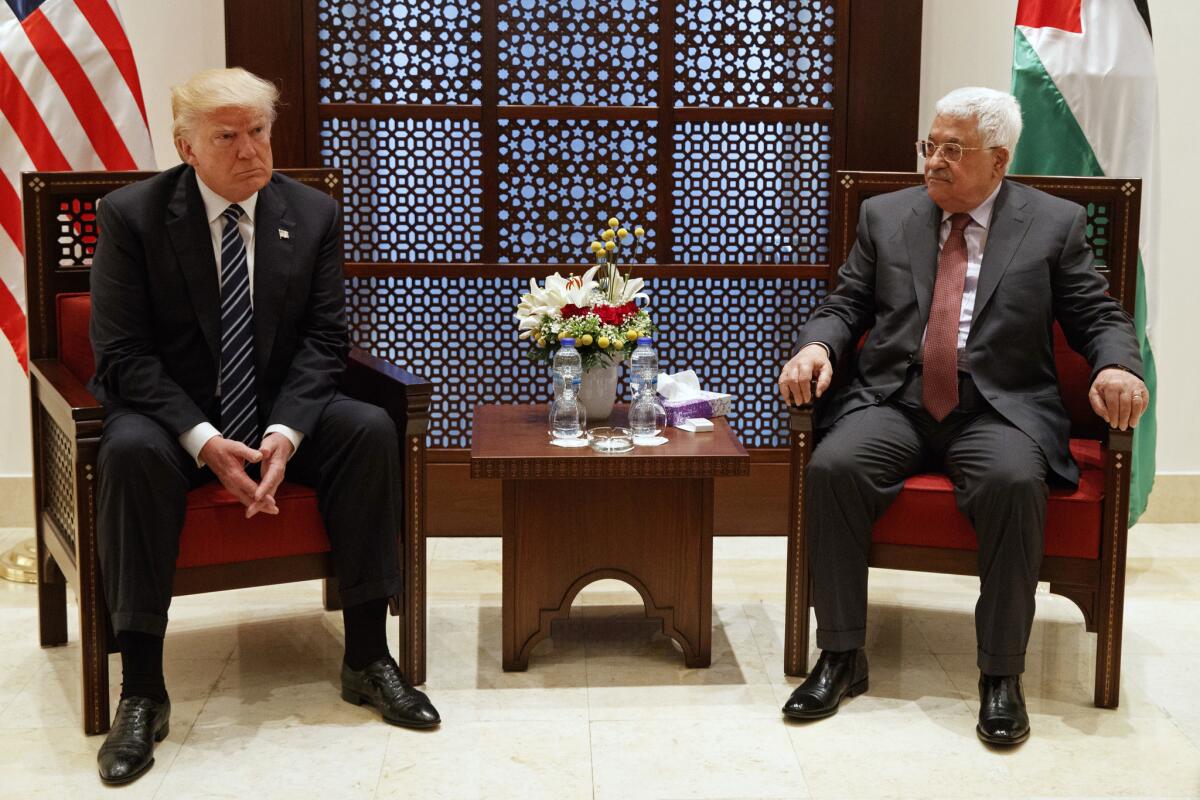
President Trump is expressing solidarity with the United Kingdom in the wake of a deadly explosion at an Ariana Grande concert in Manchester, England, condemning the “evil losers” behind the blast.
Trump spoke Tuesday after a meeting in Bethlehem with Palestinian Authority President Mahmoud Abbas.
Manchester police say an apparent suicide bomber set off an improvised explosive device at the end of the concert. Police raised the death toll to 22 early Tuesday, and dozens more have been reported injured.
Trump said the attack preyed on “innocent children” and said this “wicked ideology must be obliterated. And I mean completely obliterated.”
Trump says “civilized nations must join together to protect human life.”
- Share via
Flynn invokes 5th Amendment, refuses to comply with Senate subpoena in Russia probe
President Trump’s former national security advisor, Michael Flynn, refused Monday to comply with a Senate subpoena seeking records of his dealings with Russia, invoking his constitutional protection against self-incrimination.
Lawyers for the former three-star Army general said he would not cooperate with the Senate Intelligence Committee inquiry because the “escalating public frenzy against him” and the Justice Department’s recent appointment of a special counsel put him at legal risk if he turned over the documents.
Flynn, who was forced to resign from the White House in February, is a key figure in the growing political scandal. The FBI is investigating whether members of the Trump campaign cooperated with Russian intelligence agencies during or after the 2016 race.
The subpoena “seeks to compel Gen. Flynn to offer testimony through the act of producing documents that may or may not exist,” his lawyer, Robert Kelner, and two other attorneys wrote in a letter to the Senate committee.
Under the circumstances, they wrote, “Gen. Flynn is entitled to, and does, invoke his 5th Amendment privilege against production of documents.”
The Senate Intelligence Committee subpoena sought records of all of Flynn’s meetings with Russian officials, and any communications he had with the Trump campaign about Russia going back to 2015.
The committee said it would continue to try to obtain the documents.
In a statement, Sen. Richard Burr (R-N.C.), the committee chairman, and Sen. Mark Warner (D-Va.), the top Democrat, said they are “disappointed he has chosen to disregard the committee’s subpoena request for documents relevant and necessary to our investigation.”
The lawmakers added: “We will vigorously pursue Gen. Flynn’s testimony and his production of any and all pertinent materials pursuant to the committee’s authorities.”
Flynn’s lawyers warned that they would fight to protect the records.
Flynn “has more than a reasonable apprehension that any testimony he provides could be used against him,” they wrote.
“Multiple members of Congress have demanded that he be investigated and even prosecuted. He is the target on a nearly daily basis of outrageous allegations.”
The Senate panel last month turned down a request from Flynn’s lawyers that he be given immunity from prosecution in return for testimony. His lawyers said Flynn would testify “should the circumstances permit.”
Adding to his woes, a Democratic lawmaker said Monday that Flynn may have lied to federal investigators when he told the Pentagon during a security review that he was paid $33,750 by a U.S. company for making a speech in Moscow in December 2015, shortly before he began advising Trump’s presidential campaign.
“General Flynn told security clearance investigators that he was paid by ‘U.S. companies’ when he traveled to Moscow in December 2015 to dine at a gala with Russian President Vladimir Putin,” Rep. Elijah Cummings, (D-Md), the top Democrat on the House Oversight and Investigations Committee, said in a statement.
“The actual source of the funds for General Flynn’s trip was not a U.S. company, but the Russian media propaganda arm, RT,” he added, referring to the government-run TV network.
Trump ordered Flynn to resign three weeks into the new administration after news reports disclosed that he had lied to White House colleagues, including Vice President Mike Pence, about his communications with Sergey Kislyak, Russia’s ambassador to the United States.
The day after firing Flynn, Trump met with then-FBI Director James Comey and asked him to halt the bureau’s investigation of Flynn, the New York Times has reported.
“I hope you can see your way clear to letting this go, to letting Flynn go,” Trump told Comey, according to the report. “He is a good guy. I hope you can let this go.”
In addition to the Senate intelligence investigation, Flynn is under scrutiny by three other congressional committees, the Pentagon inspector general, the FBI counterintelligence probe and a federal criminal investigation in northern Virginia.
A grand jury there also has issued subpoenas for documents, reportedly about his business dealings with Turkey and Russia before he entered the White House.
Flynn has denied any wrongdoing.
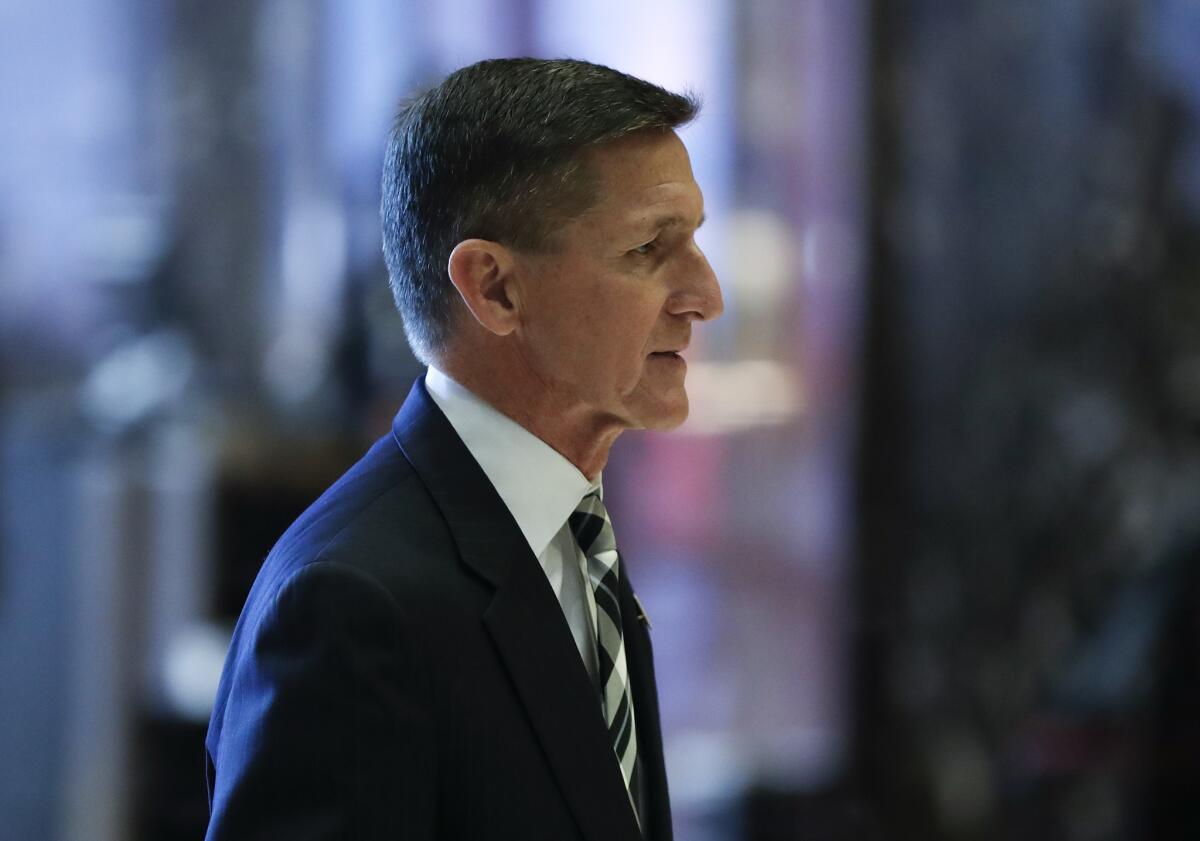
- Share via
In a legal retreat, Sessions puts limits on financial consequences for ‘sanctuary cities’
In an apparent retreat on the war against cities and counties that refuse to cooperate with immigration enforcement, the Trump administration has settled on a narrow definition of what it means to be a “sanctuary city,” and limited the potential financial consequences for state and local governments.
At most, the sanctuary jurisdictions will lose grants from the Justice Department and the Homeland Security Department – not all federal funds, according to an order signed Monday by Atty. Gen. Jeff Sessions.
During last year’s campaign and the early days of the administration, President Trump and Sessions frequently attacked cities, states and corrections agencies that refuse to assist with federal immigration enforcement, saying illegal immigration was fueling what they described as a surge in gang violence and other crime.
Five days after taking office, Trump signed an executive order that said “sanctuary jurisdictions” were not eligible to receive federal grants. The Justice Department on April 21 sent letters to nine jurisdictions, saying they were at risk of losing their grants from the department.
But U.S. District Judge William Orrick blocked enforcement of Trump’s order nationwide on April 25, saying that it violated the Constitution and brought on “substantial confusion and justified fear” in local governments that they would lose all their federal grants, not just their law enforcement funding.
In an angry tweet, Trump called the ruling “ridiculous” and vowed to “see you in the Supreme Court!”
The Trump administration had never actually spelled out what it meant to be a sanctuary city.
Sessions’ memo, a reaction to Orrick’s order, says it will mean only places that “willfully refuse to comply” with a 1996 federal law that requires federal, state and local governments to share information about someone’s immigration status.
That means that Trump’s threat may not amount to much. When cities and counties accept grants from the Justice Department, they already agree to comply with that law. It also means Trump’s Jan. 25 order won’t apply to cities and counties that refuse to honor “detainer” requests to hold people who are in the country illegally for arrest on immigration charges.
Immigration rights lawyers saw the memo as an admission by the Justice Department that the law was not on its side in the sanctuary city argument.
But Sessions’ memo makes it clear that the administration has not given up on its goals of using the power of federal funding in the future to push for tougher enforcement.
“Going forward, the [Justice] Department, where authorized, may seek to tailor grants to promote a lawful system of immigration,” Sessions wrote.
- Share via
Supreme Court finds the GOP packed black voters into two North Carolina districts to help win more House seats
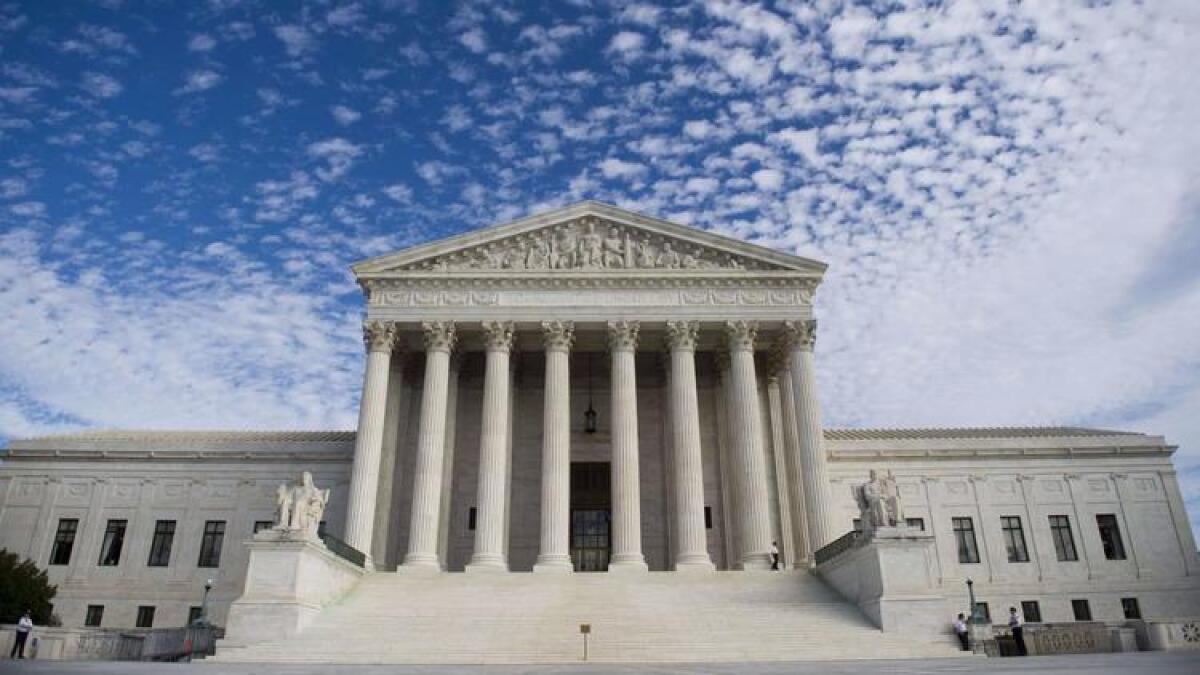
The Supreme Court rebuked North Carolina’s Republican leaders Monday for shifting tens of thousands of black voters into two congressional districts that had steadily elected black Democrats, striking down the move as racial gerrymandering.
The Constitution forbids a state from “separating its citizens into voting districts on the basis of race” without a compelling reason, the high court said in an opinion joined by its four liberals and conservative Justice Clarence Thomas.
The ruling is the third in recent years to fault Southern Republicans for packing more black voters into districts where African Americans were already the dominant voting bloc. By concentrating black voters into a few districts, the revised state maps strengthened the GOP’s hold in the surrounding areas.
- Share via
Gorsuch dissents as Supreme Court upholds ban on big-money gifts to political parties
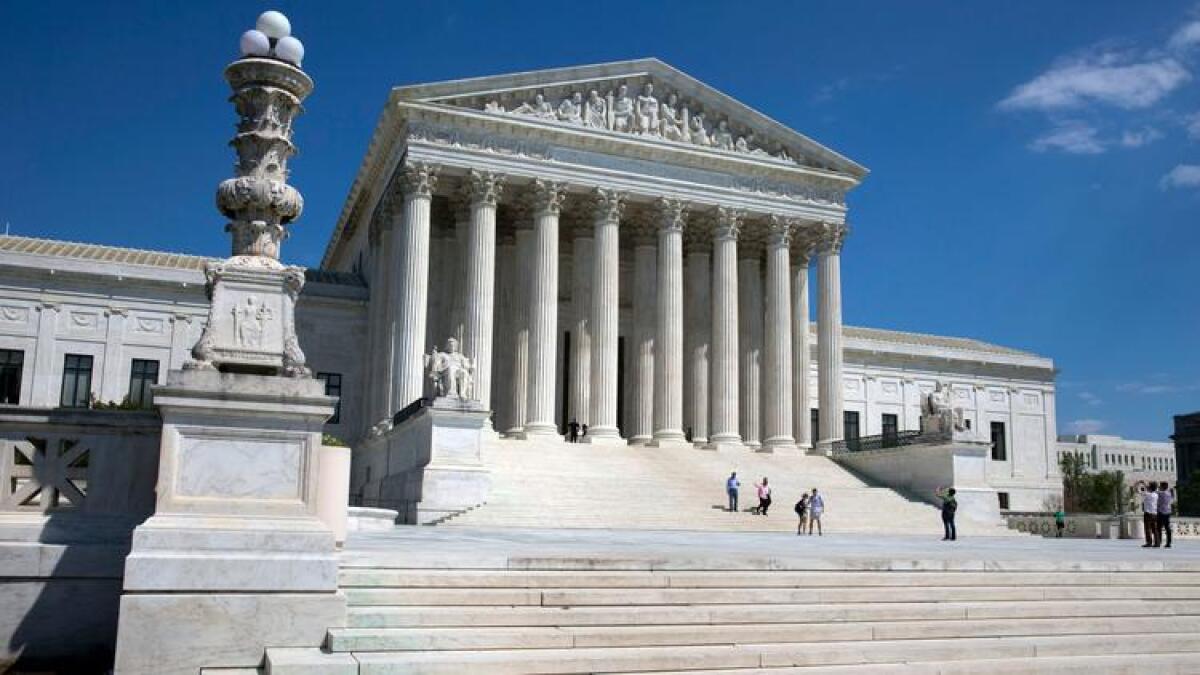
New Justice Neil M. Gorsuch joined Clarence Thomas in dissent Monday when the Supreme Court rejected an appeal from a Republican Party lawyer seeking to strike down limits on big-money contributions to political parties.
By a 7-2 vote, the high court upheld limits set in the McCain-Feingold Act of 2002.
The dissent by Gorsuch is his first and most significant decision since joining the court last month, and it puts him squarely on the side of conservatives and Republican lawyers who believe that limits on political money are unconstitutional.
- Share via
Democratic congressman says Flynn may have lied to security clearance investigators
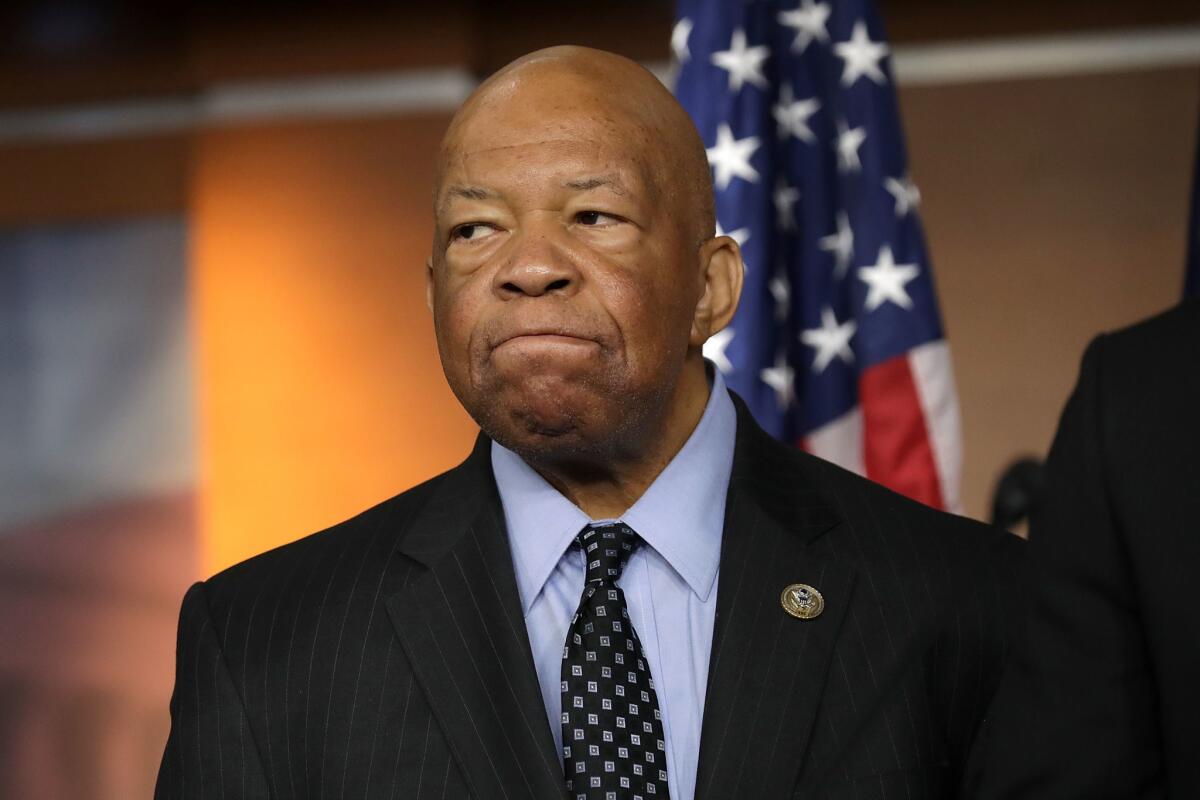
The top Democrat on the House Oversight Committee said documents he has reviewed suggest that former national security advisor Michael Flynn lied to federal security clearance investigators about the source of payments Flynn received.
Rep. Elijah E. Cummings of Maryland said Flynn told the investigators during an early 2016 security clearance review that a trip to Moscow was “funded by U.S. companies.” Cummings says the actual source of the funds was “the Russian media propaganda arm, RT.”
Cummings made the statements in a letter to Rep. Jason Chaffetz, the Utah Republican and chairman of the House Oversight Committee. Cummings sent the letter the same day Flynn declined to provide documents to the Senate Intelligence Committee, citing 5th Amendment protection from self-incrimination.
- Share via
Flynn attorneys cite ‘public frenzy against him’ as reason for declining Senate subpoena
Attorneys for Michael Flynn say that a daily “escalating public frenzy against him” and the Justice Department’s appointment of a special counsel have created a legally dangerous environment for him to cooperate with a Senate investigation.
That’s according to a letter obtained by the Associated Press that was written on behalf of the former national security advisor under President Trump.
The letter, sent Monday by Flynn’s legal team to the Senate Intelligence Committee, lays out the case for Flynn to invoke his 5th Amendment protection against self-incrimination and his decision not to produce documents in response to a congressional subpoena.
The letter says that the context of the Senate’s investigation into Russia’s meddling in the 2016 election threatens that “any testimony he provides could be used against him.”
- Share via
Israelis cheered by Trump visit to Western Wall — despite Netanyahu’s absence

At the insistence of the United States, Israeli Prime Minister Benjamin Netanyahu was notably absent from President Trump’s visit to the Western Wall in Jerusalem — but Israelis seemed content to focus on the upside of the visit.
“There’s a feeling that they acknowledge our feelings,” said Rafi Reshef, a commentator for Israel Channel 10 news who praised Trump for his “bravery” in going to the site. “I don’t know if it will translate into diplomacy.”
Trump’s visit to the wall, a remnant of the ancient Jewish temple, and to the Church of the Holy Sepulchre, believed to mark the site of Jesus’ crucifixion, was the first by a sitting U.S. president to the holy sites in nearly a century. Both stand on land that is contested by Israel and the Palestinians.
Israel had asked if Netanyahu could join the visit to the wall, but was told no, in keeping with U.S. policy that the status of the Old City of Jerusalem is a subject for peace negotiations. Still, many Israelis considered the visit to the wall a tacit recognition of their control over East Jerusalem, captured from Jordan nearly 50 years ago in the Six-Day War.
Standing face to face with the famous giant stone blocks that were the retaining wall of the temple — the holiest site in Judaism — Trump, in a black skullcap, swayed and placed a note deep into the cracks of the wall as is the custom of pilgrims.
Standing with Rabbi Shmuel Rabinovich, the Israeli official in charge of religious ceremonies at the Western Wall, the president was shown sketches of the ancient Temple Mount, the site now dominated by the Al Aqsa Mosque and the golden Dome of the Rock shrine.
Michael Oren, an Israeli deputy minister for diplomacy and a former ambassador to the United States, said on Channel 10 that the visit was significant. “The message is that the Western Wall belongs to the Jewish people,” he said.
In the Muslim Quarter of the Old City, the sentiment was different about Trump’s visit to the 2,000-year-old wall, known as Al Buraq to Muslims. Sitting at the entrance to his antique silver shop on Sunday, Mohammed Awad complained that the site does not belong to Jews and that the president made a mistake by not visiting the Al Aqsa Mosque.
“Like President Bush and Obama, he’s not doing anything,” Awad said.
- Share via
Trump says he didn’t name Israel in discussing counter-terrorism intelligence with Russians
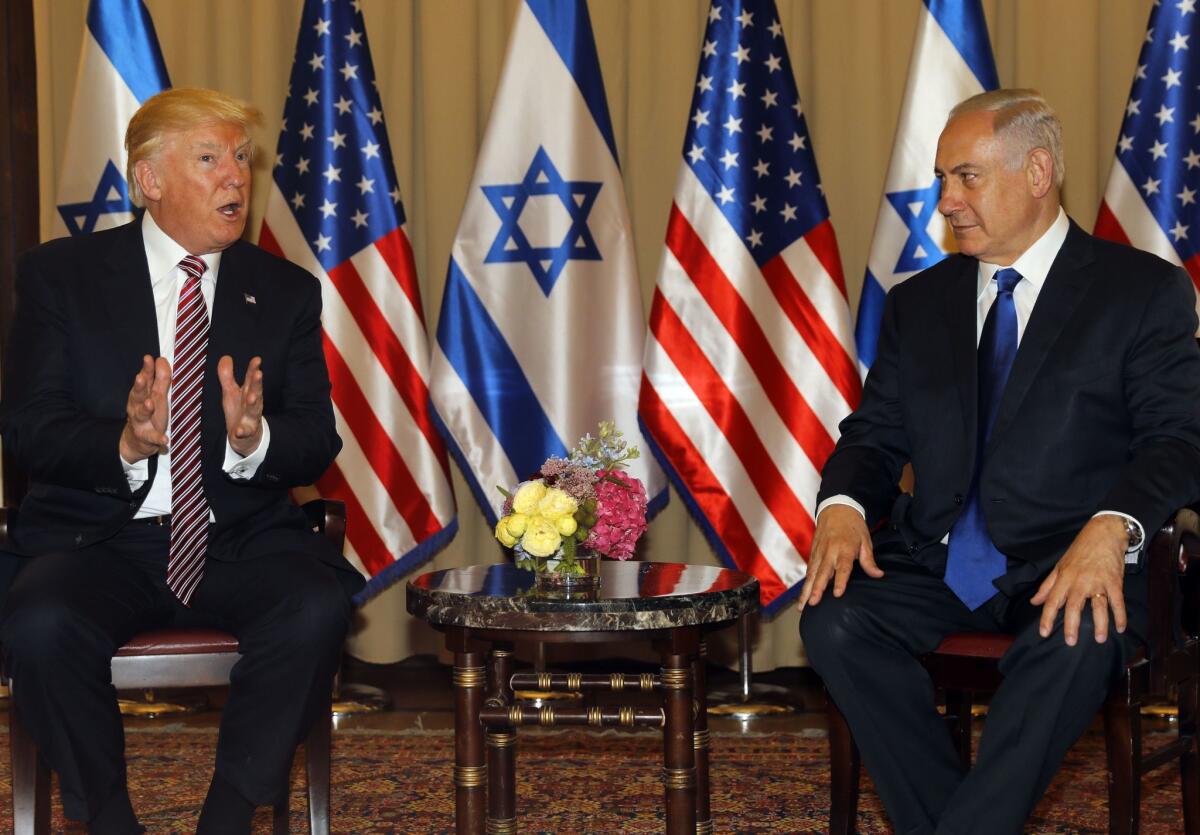
President Trump today denied that he revealed that Israel was the source of intelligence about a terrorist threat to commercial airliners during his meeting with Russian diplomats earlier this month.
Just arrived in Israel on Monday, and speaking here alongside Israeli Prime Minister Benjamin Netanyahu, Trump insisted, “I never mentioned the word or the name Israel.”
“They’re all saying I did,” he said, pointing to reporters. “So you have another story wrong. Never mentioned the word Israel.”
Published reports have not said that Trump identified Israel in his May 10 Oval Office meeting with the Russian foreign minister and ambassador to the United States, only that he divulged intelligence from an unnamed allied country that did not want it shared. Subsequent reports, citing anonymous sources, have said the ally is Israel and that Israeli intelligence officials were furious that Trump shared enough information for Russia to deduce what country was the source.
Netanyahu, however, did not directly address the intelligence controversy.
He cut through the shouts of multiple questioners during the photo opportunity with Trump to say simply, “Intelligence cooperation is terrific. It’s never been better.”
The White House has described as “wholly appropriate” Trump’s decision to share sensitive information during his meeting with Russian Foreign Minister Sergey Lavrov and Ambassador Sergey Kislyak. Trump acknowledged in later Twitter postings that he had discussed the threat that the Islamic State would use laptops as explosive devices aboard passenger planes. He said he wanted Russia “to greatly step up their fight against ISIS & terrorism.”
In their remarks together, Trump and Netanyahu each continued to draw a hard line toward Iran. Trump criticized the nuclear deal negotiated by his predecessor in concert with European allies, including Russia, though as president he has not carried through with a campaign vow to scrap it. The pact put a moratorium on Iran’s further development of nuclear weapons in return for ending some sanctions against the country.
“Instead of being thankful and saying thank you, because they were in serious trouble ... we gave them a lifeline,” Trump said of the Iranians. “Instead of saying thank you to the United States, they now feel emboldened.”
In 2015, Netanyahu took the unusual step of addressing a joint session of Congress -- at Republican leaders’ invitation -- to urge lawmakers to block the deal. The deal was one of the main contributors to the icy personal relationship between Netanyahu and then-President Obama.
- Share via
Trump administration seeks delay on decision over legal challenge to Obamacare aid for the poor
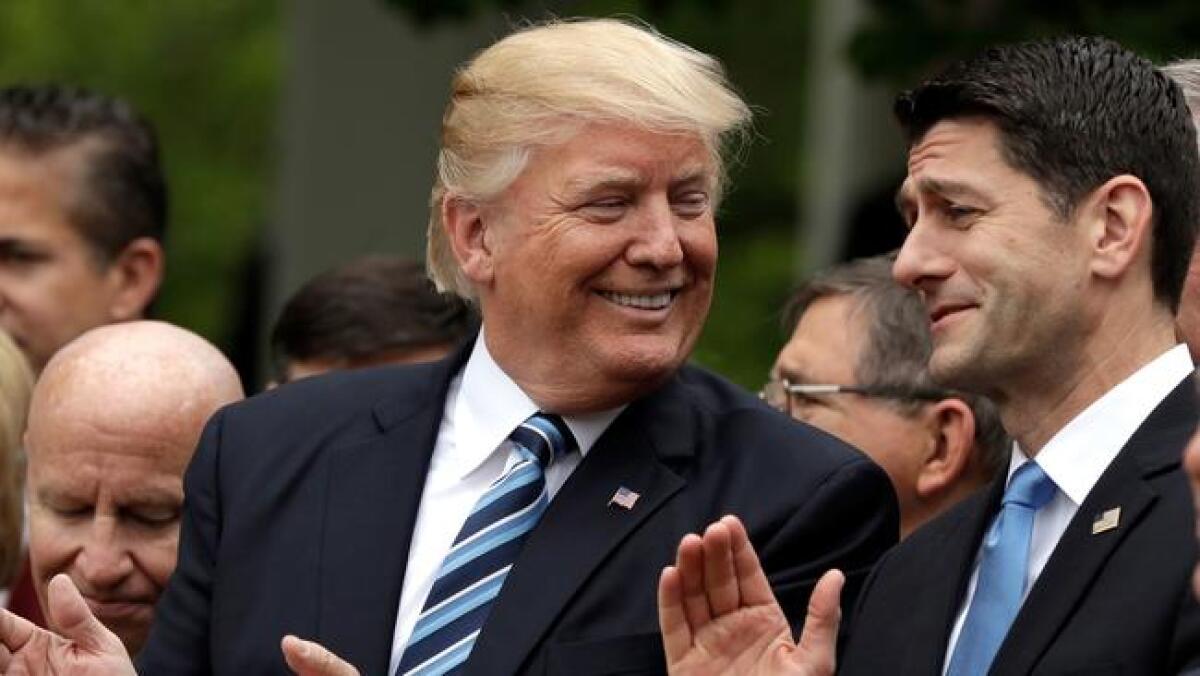
The Trump administration sought more time Monday to decide how to handle a lawsuit challenging federal healthcare aid for low-income Americans who rely on Obamacare health plans.
The move may put off a showdown over the assistance, which health insurers and many experts believe is crucial to sustaining insurance markets created by the Affordable Care Act.
But it will likely to do little to stabilize jittery insurance markets or reassure insurers who have been warning of rising premiums to account for uncertainty over the payments.
The aid, which reimburses insurers for lowering out-of-pocket costs for millions of low-income consumers who have health plans on the Obamacare markets, was paid for years by the Obama administration.
But it is now the subject of a lawsuit by congressional Republicans, who argue Congress must approve the payments, known as cost sharing reductions, or CSRs.
President Trump and his deputies have repeatedly threatened to stop making the payments or stop contesting the lawsuit, which would effectively do the same thing.
Insurers, state regulators and multiple healthcare groups representing doctors, physicians and others have pleaded with the administration and with congressional Republicans not to do that, warning it would sabotage markets and jeopardize coverage for millions of people.
The delay means that the issue may not be settled by the court for at least several more months. However, Trump could still decide unilaterally at any time to cut off the aid.
The U.S. Court of Appeals for the District of Columbia - which is considering the case, known as House vs. Price - must still approve the delay, which was sought by both the Trump administration and House Republicans.
2:54 pm: This story has been updated to reflect the fact that the court has not yet ruled on the delay.
- Share via
Melania Trump seems to swat away President Trump’s hand during arrival in Israel
- Share via
Iran’s Rouhani: Trump went to a country where elections are ‘not in their dictionary’
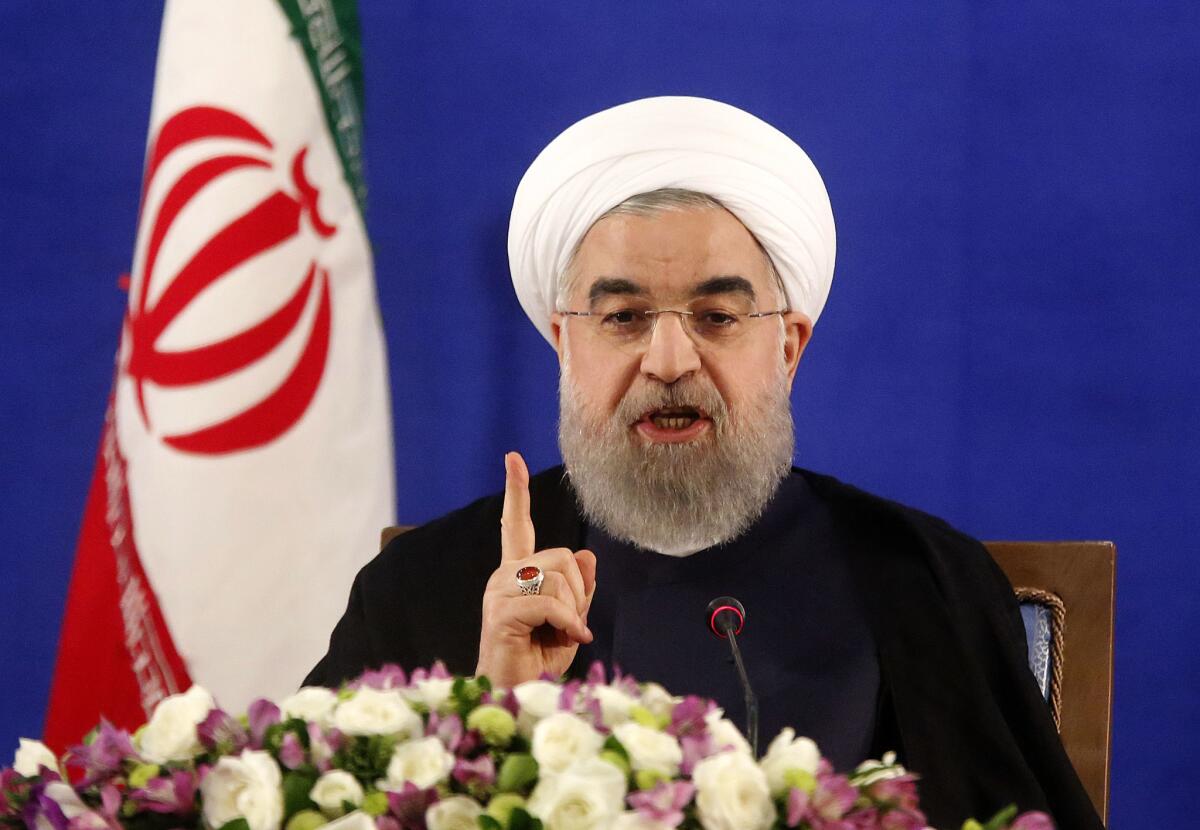
Fresh off a resounding reelection victory, Iranian President Hassan Rouhani criticized President Trump on Monday for visiting Iran’s arch-rival Saudi Arabia, but also insisted that he wanted to improve relations with the U.S.
Rouhani said Trump’s meetings in Riyadh over the weekend were “a sham” and drew laughter from the audience at a press conference in Tehran when he compared the high turnout at Iran’s election Friday to the fact that Saudi Arabia has never held elections.
“Mr. Trump has come to the region at a time when 45 million Iranian people went to polling stations, and he went to a country where they don’t know what elections are about,” Rouhani said. “It’s not in their dictionary.
“Hopefully the day will come when Saudi Arabia will adopt this path.”
His triumphant comments neglected to mention that Iran’s elections are hardly free or fair, with candidates chosen by an unelected 12-man council.
Rouhani’s first extensive remarks since decisively winning a second term signaled that he would continue to seek to engage with the United States even as the Trump administration conducts a three-month review of its Iran policy that could result in tougher economic sanctions other punitive actions.
Rouhani deflected questions about Trump’s calls to isolate Iran over its support for militant groups and its ballistic missile program, suggesting that the new U.S. administration had yet to “settle down” and formulate a coherent policy in the Middle East.
“We are waiting for this new U.S. government to be settled in terms of their stances, posture and future plans,” Rouhani said.
“Hopefully things will be settled down and well established in the U.S. so that we can actually pass judgments on the new administration.”
Special correspondent Mostaghim reported from Tehran and Times staff writer Bengali from Mumbai.
- Share via
Melania Trump and Sara Netanyahu find a common enemy: the news media
Israeli and U.S. officials like to gush about the two countries’ “special relationship,” their strategic alliance and the democratic values they share.
At the airport welcoming ceremony for President Trump, Prime Minister Benjamin Netanyahu’s wife Sara suggested something else shared by the two countries – a combative relationship between the media and their respective leaders.
While making chitchat with First Lady Melania Trump and the president, Sara Netanyahu said in her uneven English, “The majority of the people in Israel, unlike the media, love us. So we tell them how you are great so they love you.”
The president replied, “We have something very much in common,” and Netanyahu chimed in, “Sounds familiar.”
The prime minister’s wife drove home the point: “Very much in common. We will talk about it at dinner. A lot in common, the same media, and we will talk about it.”
- Share via
A terrorism scare rattled Tel Aviv before Trump’s arrival

In the final moments before President Trump’s plane touched down at Ben Gurion Airport in Israel, there were fears that the president’s arrival had been marred by a car that plowed into a narrow sidewalk in downtown Tel Aviv.
Around 11:30 a.m., Israeli police, Shin Bet officers and paramedics rushed to a congested intersection of small shops and public commuter buses, amid media reports that a driver was suspected of carrying out a ramming attack in the city’s commercial center.
“There was a giant confusion – it looked like a ramming attack,’’ said Alona Rothschild, a bystander. “It was very stressful.’’
Over decades, Israelis and Palestinians have become accustomed to militant attacks that seemed timed to complicate and upend various rounds of peace talks.
Another bystander said after being interviewed by security officers that the car was speeding and collided with a scooter, but that it looked like a traffic accident rather than a deliberate attack.
Police cordoned off the intersection with tape to keep away bystanders and reporters, making the scene resemble a militant attack.
By the time Trump’s plane had landed, the police announced that their “working assumption” was that what had taken place was actually a routine car crash. Three Israelis were taken to the hospital with light injuries, the police said.
That’s not the initial word that Trump heard: On the red carpet, Israeli Public Security Minister Gilad Erdan -- who is responsible for the police -- informed the president that it appeared that a “terror” attack at just transpired. Prime Minister Benjamin Netanyahu immediately interjected, however, to suggest it was only an accident.
- Share via
Trump arrives in Israel, hoping to rekindle peace process

President Donald Trump paid his respects at Jerusalem’s Western Wall, the holiest place where Jews can pray, on Monday.
President Trump, wearing a Jewish skullcap, touched the ancient stones of the Western Wall in Jerusalem on Monday, after voicing hopes that his visit to Israel and the West Bank would bolster chances for Mideast peace.
Trump aims to use his two-day stay to further his quest for what he has called the ultimate deal: jump-starting peace talks between the Israelis and Palestinians.
“We have before us a rare opportunity to bring security and stability and peace to this region and to its people, defeating terrorism and creating a future of harmony, prosperity and peace. But we can only get there working together,” Trump said at an arrival ceremony at Tel Aviv’s Ben Gurion Airport. “There is no other way.”
Trump was holding formal meetings Monday with Israel’s president and Prime Minister Benjamin Netanyahu, both of whom greeted him at the airport. Later, at the Western Wall, he spent a private moment -- although with the clicking of scores of cameras -- tucking a note into one of the crannies.
First Lady Melania Trump and the first daughter, Ivanka, visited the women’s area of the wall, one of Judaism’s most sacred sites.
On Tuesday, Trump is to travel to Bethlehem, in the West Bank, to meet with Palestinian President Mahmoud Abbas. During his earlier visit with Arab leaders in Saudi Arabia, the U.S. leader said he “found new reasons for hope” for a joint peace effort and greater coordination in the fight against terrorism.
Echoing a sentiment voiced by Trump’s top aides, Secretary of State Rex Tillerson said the common threat of terrorist organizations has united Arab nations, Israel and the United States.
“I think [Trump] feels like there’s a moment in time here,” Tillerson told reporters traveling with the president on Air Force One. “I think the president has indicated he’s willing to put his own personal efforts into this, if the Israelis and the Palestinian leadership are ready to be serious about engaging as well.”
In his own brief remarks Monday, Netanyahu said Israel shared Trump’s commitment to peace as outlined in the president’s address to the Arab leaders.
“The peace we seek is a genuine and a durable one in which the Jewish state is recognized, security remains in Israel’s hands and the conflict ends once and for all,” the Israeli leader said.
The president’s arrival in Tel Aviv on Monday afternoon also marked a historic direct flight between Saudi Arabia and Israel, nations that do not have formal diplomatic relations.
Netanyahu, noting the significance of that flight, said one day he hoped an Israeli prime minister could fly directly to Riyadh.
Also Monday, Trump was visiting the Church of the Holy Sepulchre, revered by Christians as the site of Jesus’ tomb. On Tuesday, he is to visit Yad Vashem, Israel’s Holocaust memorial, and deliver a speech on the U.S.-Israeli alliance.
- Share via
Human rights activists decry U.S. sale of weapons to Saudi Arabia
Human rights advocates say they are appalled at the multibillion-dollar arms deal the United States has just announced with Saudi Arabia.
Visiting Riyadh, the Saudi capital, on his first overseas trip, President Trump over the weekend signed a $110-billion package of weapons sales to the kingdom.
Activists warn that the weapons will be used in the Saudis’ proxy war in Yemen, where they have been accused of recklessly bombing hospitals, markets, homes and other infrastructure, and killing civilians.
“This deal has President Trump throwing gasoline on a house fire and locking the door on his way out,” Eric Ferrero, communications director of Amnesty International USA, said in a statement.
He cited “damning evidence” that the Saudi-led coalition has committed war crimes in Yemen. The United States is part of that coalition, although its participation is primarily in logistics and intelligence-sharing.
Continuing to arm Saudi Arabia, while also including Yemen on the list of countries from which Trump wants to ban arriving travelers, is “unconscionable,” Ferrero said.
The New York-based Human Rights Watch says it can document 81 “unlawful” air strikes in the last two years in Yemen that may constitute war crimes, and that of those, around two dozen were found to have been conducted with U.S. weapons.
Human Rights Watch accused Trump of rewarding Saudi war crimes.
Part of the arms deal he announced was already in the works under President Obama. But the Obama administration suspended some of the sales after an especially deadly air strike killed people at a funeral last fall.
The Trump administration portrays the stepped-up weapons sales as part of a joint strategy to battle Islamist-inspired terrorism. And the sales mean more business for companies like Boeing and Lockheed, and thus more jobs, Trump says.
But activists worry that Trump is further solidifying a policy that puts human rights on the back burner.
The world is “watching as President Trump meets with leaders of other states with records of trampling on human rights in the name of national security,” Amnesty’s executive director in the USA, Margaret Huang, said. “We fear this ‘new partnership’ could lay the foundation for further erosion of human rights in the region and far beyond.”
- Share via
Graduates walk out on Pence at Notre Dame commencement
Dozens of graduates and family members silently stood and walked out as Vice President Mike Pence began his address at Notre Dame’s commencement ceremony on Sunday.
But Pence was also met with respectful applause when he mentioned how President Trump spoke out against the religious persecution of people of “all faiths” when he addressed the leaders of more than 50 Arab and Muslim nations in Saudi Arabia earlier Sunday.
Trump has been harshly criticized for using anti-Islamic rhetoric during his campaign as well as his administration’s efforts to impose a travel ban on several Muslim-majority nations. Before Pence spoke, valedictorian Caleb Joshua Pine appeared to take issue with the president as he urged his fellow graduates to “stand against scapegoating of Muslims.”
10:44 a.m. This post has been updated with more information on the walkouts. It was originally published at 10:02 a.m.
- Share via
‘Drive out the extremists,’ Trump tells Muslim leaders
A better future is only possible if your nations drive out the terrorists and drive out the extremists. Drive them out. Drive them out of your places of worship. Drive them out of your communities. Drive them out of your holy land. And drive them out of this earth.
— President Trump, speaking in Saudi Arabia
- Share via
Trump to Muslim leaders: ‘The Middle East cannot wait for American power to crush this enemy for them’
America is prepared to stand with you in pursuit of shared interests and common security, but the nations of the Middle East cannot wait for American power to crush this enemy for them.
— President Trump, speaking to Muslim leaders about terrorism
- Share via
North Korea conducts another missile test while Trump is on Saudi visit
The White House said Sunday it was aware of North Korea’s latest firing of a medium-range missile, the most recent in a flurry of ballistics tests that have rattled neighbors in the region.
U.S. officials traveling with President Trump in Saudi Arabia noted that the system used in Sunday’s launch had a shorter range than missiles fired in three previous tests. But the U.S. has repeatedly admonished North Korean leader Kim Jong Un over his drive to improve his reclusive country’s missile technology.
The firing last week of a mid-range missile that the North said was capable of carrying a heavy nuclear warhead drew White House warnings that North Korea posed a “flagrant menace.”
Secretary of State Rex Tillerson, traveling with Trump, said the United States was “early in the stages of applying the economic pressure as well as the diplomatic pressure to the regime in North Korea.”
In an interview on “Fox News Sunday,” Tillerson called the ongoing missile testing “disappointing” and “disturbing.”
In Sunday’s test, South Korean officials said the missile flew eastward about 300 miles from the launch site before landing in the sea. It was tracked by the U.S. Pacific Command.
South Korea’s new president, Moon Jae-in, who took office this month, convened a meeting of top security officials to discuss Sunday’s launch. Moon has said he wants to try to open talks with the North, but that provocative actions would make that difficult or impossible.
Japanese Prime Minister Shinzo Abe also denounced the test and said it would be the subject of discussions this week with Western allies.
Despite international efforts to rein him in, Kim has been actively seeking to develop an intercontinental missile capable of carrying a nuclear warhead. North Korea deemed last week’s test a success, saying the missile, capable of carrying a heavy warhead, achieved a longer flight and greater altitude than in previous tests.
- Share via
On Saudi visit, Trump has cordial chat with Egypt’s leader
President Trump, wrapping up a visit to Saudi Arabia, had a cordial exchange Sunday with Egyptian President Abdel Fattah Sisi, the two leaders’ second encounter in little over a month.
The meeting was one of a series of talks Trump held during his Saudi visit with regional allies, including the king of Bahrain and the emir of Qatar.
Sisi, a former general, has been sharply criticized by human rights groups and many Western governments over his government’s jailing of thousands of opponents and other repressive policies. But his exchange with Trump included some lighthearted moments.
Sisi called the U.S. president “ a unique personality who is capable of the impossible.” Trump smiled and said, “I agree,” prompting laughter from those assembled.
Reversing the stance of his predecessor President Obama, Trump had given Sisi a warm welcome at the White House in April, one of a series of friendly overtures to strongman-style leaders.
Trump has said little publicly about human rights under Sisi, but White House aides say behind-the-scenes talks have yielded results better than those achieved by Obama.
At the meeting in Riyadh, Trump referred to the case of Aya Hijazi, an Egyptian American who was jailed for three years before being released after Trump and Sisi met last month in Washington.
“The American people appreciated that,” Trump told the Egyptian leader on Sunday. Hijazi, who had started an organization to aid street children, had been held on what rights groups said were fabricated charges that included allegations of abusing children.
Sisi thanked Trump for their partnership and assured him that “Egypt is secure, able and a stable county with the cooperation of the United States.”
Egypt has weathered a series of attacks by Islamic State extremists on security forces and Christians, including twin bombings in Coptic Christian churches on Palm Sunday.
Sisi invited Trump, who repeatedly addressed him as “General,” to visit Egypt. Trump accepted, saying he would come soon.
- Share via
As issues continue to build in America, Trump gets royal welcome in Saudi Arabia
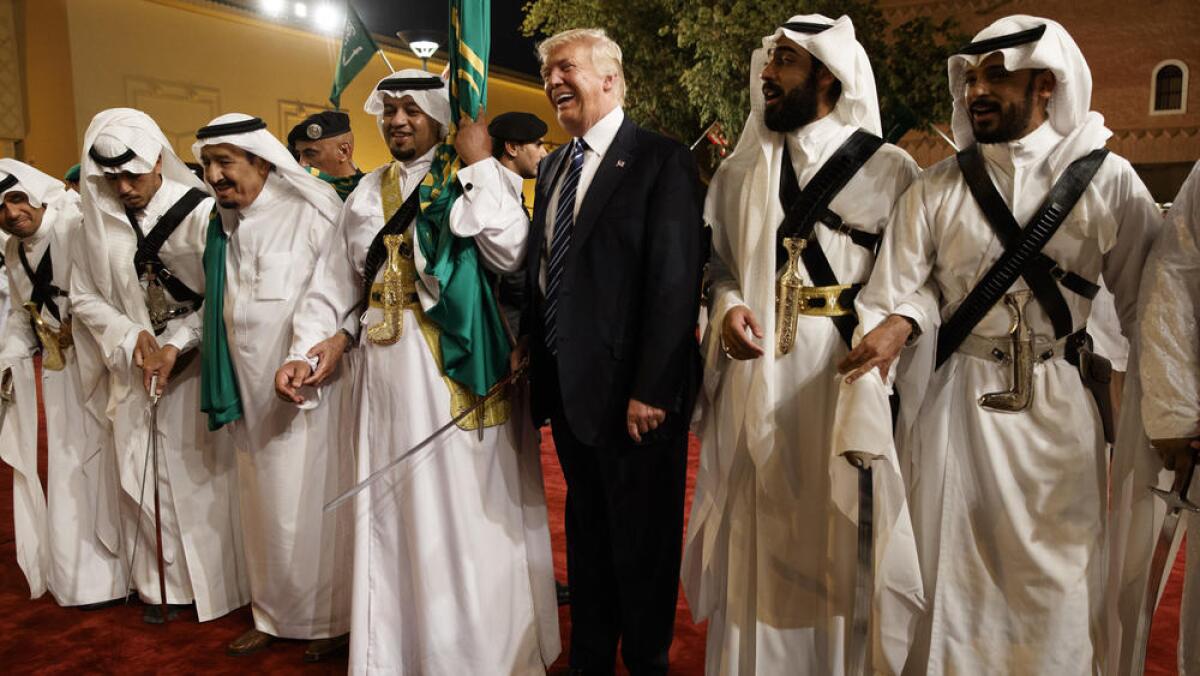
President Trump was greeted with elaborate pomp in Saudi Arabia’s capital Saturday, his first day of a five-country tour that will test his capacity to manage complex international diplomacy while the White House faces a growing political crisis at home.
In choosing the oil-rich kingdom as his first foreign stop since taking office, Trump found a host eager to use all the opulent symbols of state to seek a reboot in relations after the strains of the Obama era.
In a ceremony at the lavish Royal Court, King Salman presented Trump with the nation’s highest honor, the Collar of Abdulaziz Al Saud, for “his quest to enhance security and peace in the region and the world.”
Hours earlier, Salman personally greeted Trump on a red carpet at the foot of Air Force One before a dramatic flyover of military aircraft honored the visiting president.
When President Obama last visited, in April 2016, the king famously snubbed him, sending the governor of Riyadh to welcome him on the runway while the king greeted other visitors at the airport.
If the Saudis worried about Trump’s harsh language during the campaign — when he called for a “total and complete shutdown of Muslims entering the United States” — they clearly had forgiven him.
- Share via
Melania and Ivanka Trump’s newsmaking style in Saudi Arabia
Melania Trump made her debut on the foreign stage Saturday, stepping off Air Force One in Riyadh, Saudi Arabia, without a head scarf or abaya, the traditional black gown required for most women.
“Thank you for a beautiful welcome to Riyadh,” she tweeted, along with a photo of herself in a pantsuit with large gold belt and matching gold detailing at the neck.
Although her choice to appear bareheaded provoked a flurry of tweets, few here were surprised that the first lady chose to forego a head scarf.
Michelle Obama did the same during a January 2015 visit with then-President Obama.
Donald Trump criticized Mrs. Obama for her decision, saying at the time that the people of Saudi Arabia “were insulted.”
On Friday, some Trump supporters tweeted photos of Obama and Hillary Clinton wearing hijabs, or head scarves, next to pictures of Melania Trump with her long brown hair down.
But former First Lady Laura Bush didn’t wear a scarf to meet the Saudi royal family and neither have female heads of state, such as German Chancellor Angela Merkel and British Prime Minister Theresa May (who also appeared here without abayas).
“We don’t ask anyone to wear a scarf here unless you go into a place of prayer,” said Muna Abu Sulayman, a Saudi television host known as the “Oprah of the Middle East” who was covering the event here wearing a head scarf and abaya.
Melania Trump’s outfit still caused a stir on social media, in part because at first glance, her black pantsuit resembled an abaya. Abu Sulayman started receiving posts in her Whatsapp women’s group as soon as the Trumps landed.
The pantsuit was a hit, although Ivanka Trump — who is more widely known in the kingdom as a style icon and businesswoman — received more plaudits for her choice of attire: a calf length black, white and maroon floral dress.
“They think she looks sexy,” said Abu Sulayman, who agreed, scrolling through messages featuring footage of the Trumps’ arrival.
She thought Melania Trump’s oversized gold belt was a bit much — “somebody else might not have pulled it off” — but appreciated the former model’s modest hemline (she recalled Michelle Obama’s colorful dress was shorter) and choice of black.
“It was a really considerate gesture,” she said, since, “A lot of people associate it with the abaya.”
While most of the focus for the next nine days will be on President Trump as he makes his first international trip as commander in chief, there will be plenty of eyes on the first lady.
“I am very excited for the upcoming trip,” she said in a statement released Friday. “This will not just be an opportunity to support my husband as he works on important matters of national security and foreign relations, it will also be my honor to visit and speak with women and children from different countries, with different perspectives.”
The trip, which includes two days in Saudi Arabia and additional stops in Israel, Rome, Brussels and Sicily, will likely shine an unaccustomed spotlight on the first lady, who hasn’t moved into the White House, staffed an office or outlined a platform.
Melania Trump is the only first lady in recent memory born outside the U.S., in Slovenia, and also lived in Paris and Milan before moving to New York. She speaks five languages, including Italian, which could come in handy during the Italy and Vatican stops.
Her overseas schedule will be packed with events alongside her husband, but she is also expected to venture out on her own, aides said.
“She wants to take advantage of every moment and stop, and thus has a robust independent schedule planned,” East Wing communications director Stephanie Grisham told CNN.
- Share via
Trump’s erratic style and thirst for a deal has some Israeli officials unnerved
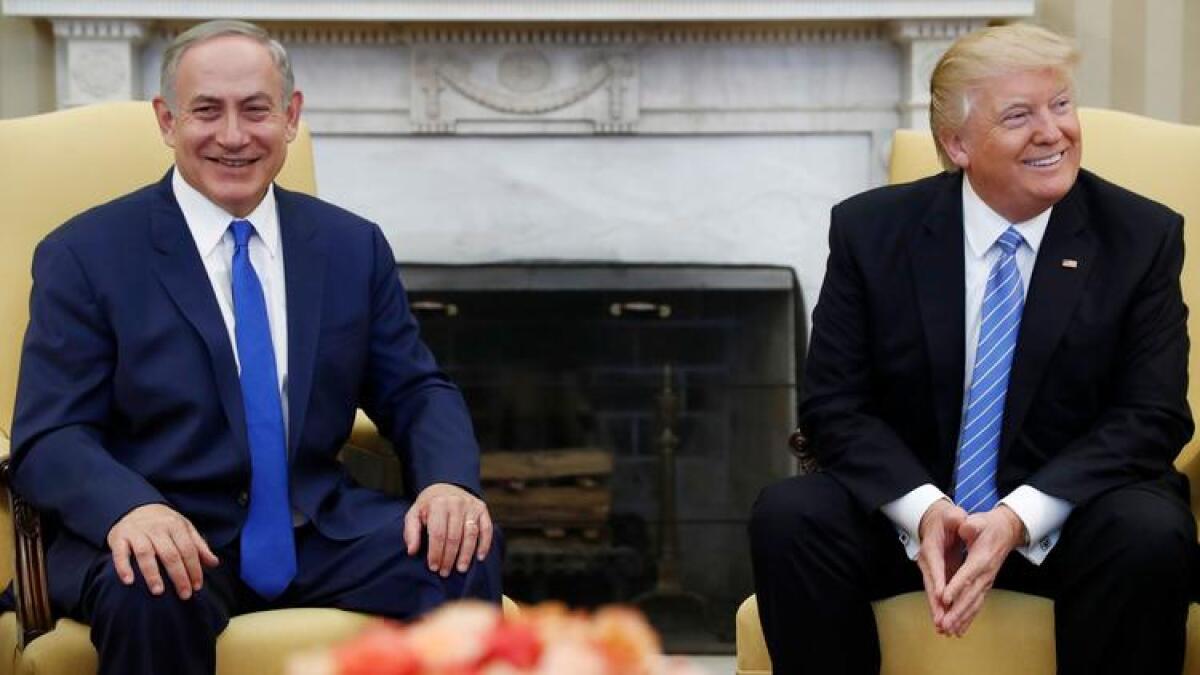
President Trump‘s erratic style and thirst for what he has called “the ultimate deal” has some Israeli officials anxious about how much he might give away if he can restart long-stalled peace talks with Palestinians.
As they await his arrival Monday in Jerusalem, Israeli officials are trying to attune themselves to Trump’s free-wheeling approach to diplomacy and a new cast of unlikely, untested advisors, including Trump’s son-in-law and two of Trump’s long-time personal attorneys.
They worry in part because since taking office, Trump has hesitated on his campaign pledge to move the U.S. Embassy from Tel Aviv to Jerusalem. White House officials fear such a relocation would infuriate Palestinians, who also claim the city as their capital.
- Share via
Trump arrives in Saudi Arabia, with domestic troubles looming
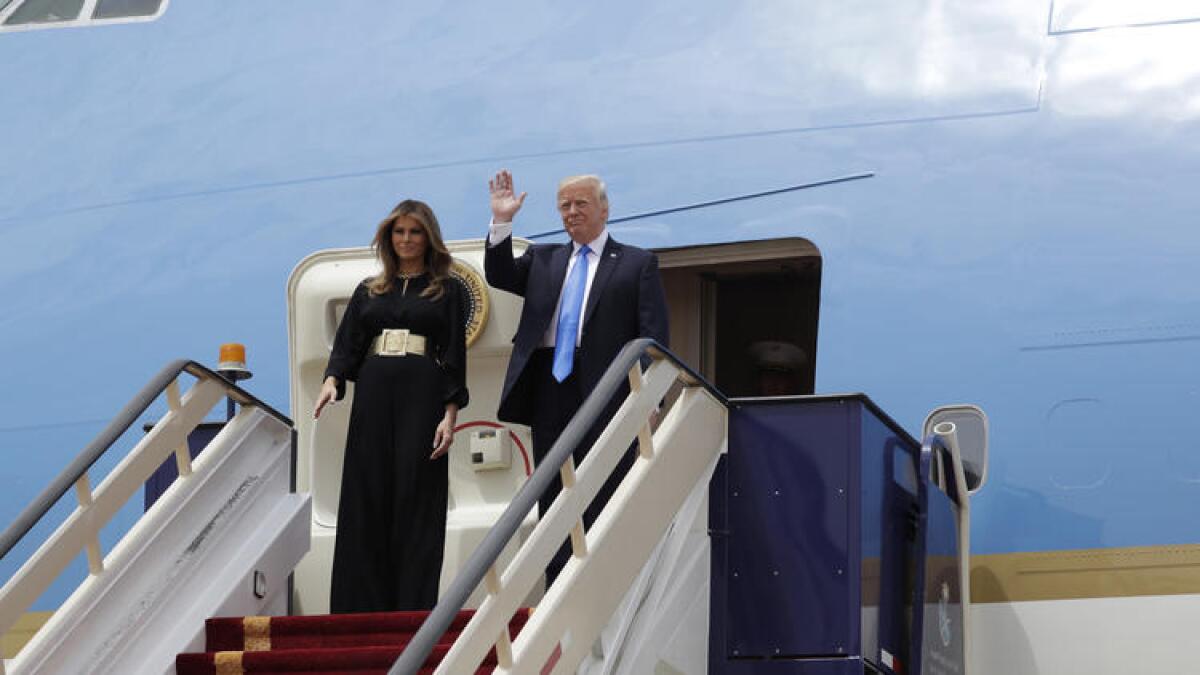
President Trump has arrived in Saudi Arabia’s capital to begin an eight-day foreign tour that will test the new administration’s capacity to manage complex international diplomacy and a growing political crisis at home.
Air Force One touched down at Riyadh’s King Khalid International Airport just before 10 a.m. local time, delivering the Republican who has angered Muslims around the world with his proposed travel ban to the nation that houses Islam’s most holy sites.
Saudi’s royal family is offering an elaborate welcome to a new U.S. president for whom they have great hopes of resetting a bilateral relationship that became increasingly strained during the Obama administration over its pursuit of a nuclear agreement with rival Iran.
- Share via
White House does not dispute that FBI probe includes at least one Trump aide
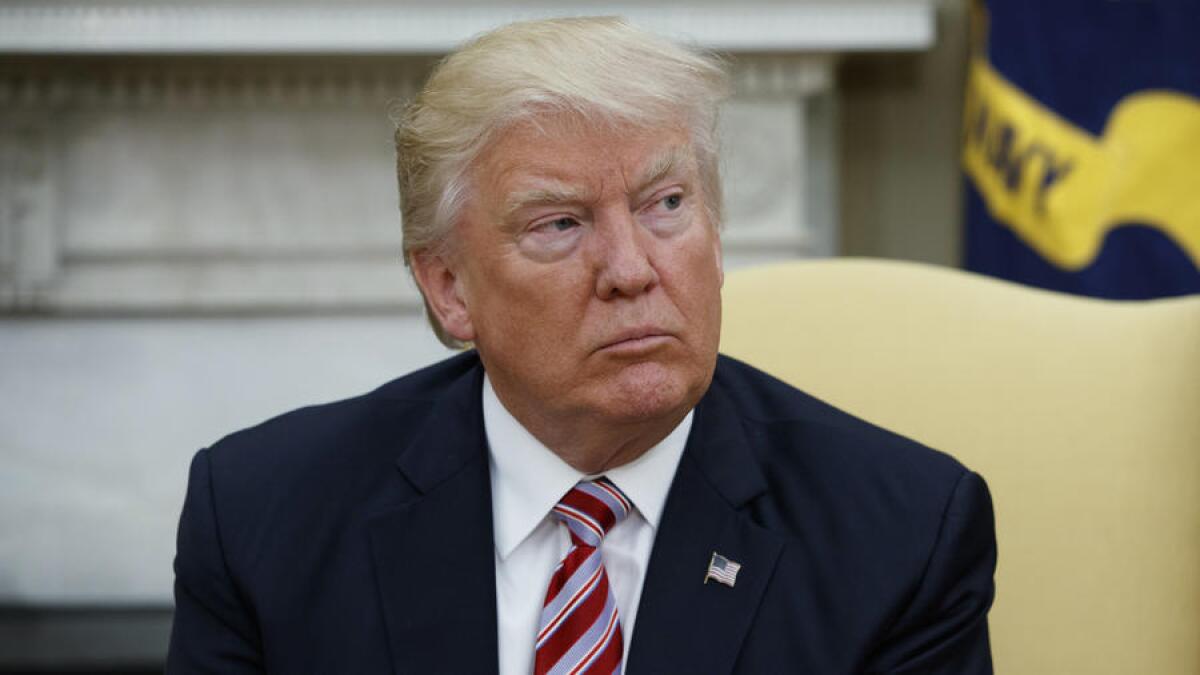
President Trump told a pair of Russian envoys that his abrupt decision to fire FBI Director James B. Comey — whom he described as “crazy, a real nut job” — had relieved “great pressure” on him because of the Russia investigation, according to a published report.
Adding to Trump’s cascading legal and political woes, the FBI investigation reached directly into the White House for the first time Friday with a separate report that an unnamed Trump aide is under federal scrutiny as a person of significant interest.
The White House did not dispute either account, which created a new furor just as Trump was taking off from Andrews Air Force Base on his first official trip overseas, a nine-day visit to five countries in the Middle East and Europe.
Until now, the FBI probe was only known to be focused on whether members of Trump’s campaign or other associates had colluded with Russian intelligence to interfere with the 2016 presidential race.
- Share via
Trump told Russian diplomats that firing ‘nut job’ Comey from FBI relieved ‘great pressure,’ report says
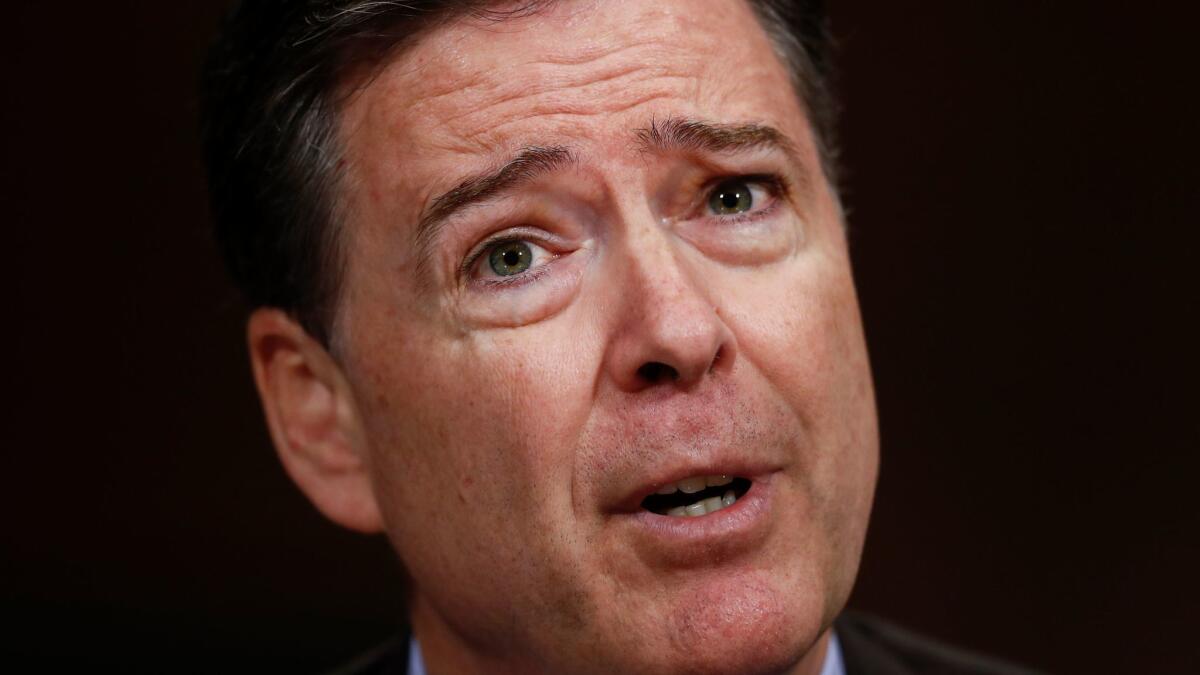
During his meeting with Russian officials last week, President Donald Trump said recently fired FBI Director James Comey was a “nut job” whose ouster relieved “great pressure” on him, according to a report Friday in The New York Times.
The Times cited notes from a May 10 Oval Office meeting, the day after Trump fired Comey.
Separately, The Washington Post reported Friday that the FBI investigation into possible coordination between Russia and the Trump presidential campaign was moving closer to the White House. Law enforcement officials now consider a senior Trump adviser a “person of interest” in the probe, the Post reported, citing people familiar with the matter. The report did not name the adviser.
LATEST: Trump’s Russia troubles worsen even as he heads overseas
The developments were a blow to White House efforts to tamp down interest in the Russia investigation as Trump and his staff boarded Air Force One for Saudi Arabia, first stop on his first foreign trip as president. The details of his comments to the Russians would seem to bolster theories that Trump fired Comey in an effort to choke off the Russia investigation.
Earlier this week, the Justice Department appointed former FBI Director Robert Mueller to take over the federal investigation in an effort to re-establish independence from the White House.
Deputy Attorney General Rod Rosenstein told Congress Friday he stands by a memo he wrote bluntly criticizing Comey. But he made clear it was not his intention for Trump or other White House officials to use the document to justify firing Comey, which is what they have done.
In closed-door meetings with lawmakers on Thursday and Friday, Rosenstein said he wrote the memo after Trump told him one day before the May 9 firing that he wanted to dismiss Comey. Rosenstein said that though he was personally fond of Comey, “I thought it was appropriate to seek a new leader.”
The Justice Department on Friday issued the text of Rosenstein’s opening remarks for the briefings on Capitol Hill. That was two days after Rosenstein named Mueller as a special counsel to investigate possible coordination between Russia and the Trump campaign to influence the 2016 presidential election.
Trump has said he plans to nominate a new FBI director soon, and that had been expected before his departure. However the White House said there would be no announcement Friday.
The appointment of Mueller as special counsel has drawn generally favorable comments from Democrats and from some Republicans as well. But lawmakers at both congressional sessions expressed frustration that Rosenstein would say little in answer to their questions about his actions — or others’ — before Comey’s firing.
“There was considerable frustration in the room,” said Rep. Seth Moulton, D-Mass., a member of the Armed Services Committee. “This renewed my confidence that we should not have confidence in this administration. I don’t think (Rosenstein) did a lot to bolster our confidence in him today.”
The White House has struggled since Comey’s firing to explain the chain of events that led to it and who exactly made the decision. Trump has insisted at times that the decision was his alone, but he also has pointed — as recently as Thursday — to the “very strong” recommendation from Rosenstein.
Rosenstein made it abundantly clear to the lawmakers that he drafted his memo only after Trump told him of his plans to dismiss the FBI director.
“My memorandum is not a statement of reasons to justify a for-cause termination,” he said. But he added, “I wrote it. I believe it. I stand by it.”
The memo focuses on Comey’s handling of the Hillary Clinton email investigation, particularly the FBI director’s decision to divulge details to the public at various junctures. Rosenstein denounced that as “profoundly wrong and unfair.”
House members and senators said Rosenstein in his briefings steered clear of specifics in answering questions about his appointment of Mueller but made clear the former FBI director, will have wide latitude to pursue the investigation, potentially including criminal charges.
Trump has reacted furiously to the appointment. However, at a combative news conference Thursday, he fell short in trying to resolve questions about investigations into his campaign and his first four months in office.
Asked point-blank if he’d done anything that might merit prosecution or even impeachment, Trump said no — and then added of the lingering allegations and questions: “I think it’s totally ridiculous. Everybody thinks so.”
The appointment of the special counsel indicates other believe that’s still open to question.
On Capitol Hill, Rosenstein said that he and Attorney General Jeff Sessions had “discussed the need for new leadership at the FBI” in one of their first meetings, and that he believed Comey had damaged the credibility of the bureau and the Justice Department through the Clinton case. Sessions has recused himself from the Trump-Russia probe, citing his close involvement in the Trump campaign last year.
Rosenstein denied media reports from last week that Comey had asked him for additional resources for his investigation before Trump fired him.
This story was originally published at 12:59 p.m. It has been updated with new information.
- Share via
Reporter says he was ‘manhandled’ by FCC security at net neutrality meeting
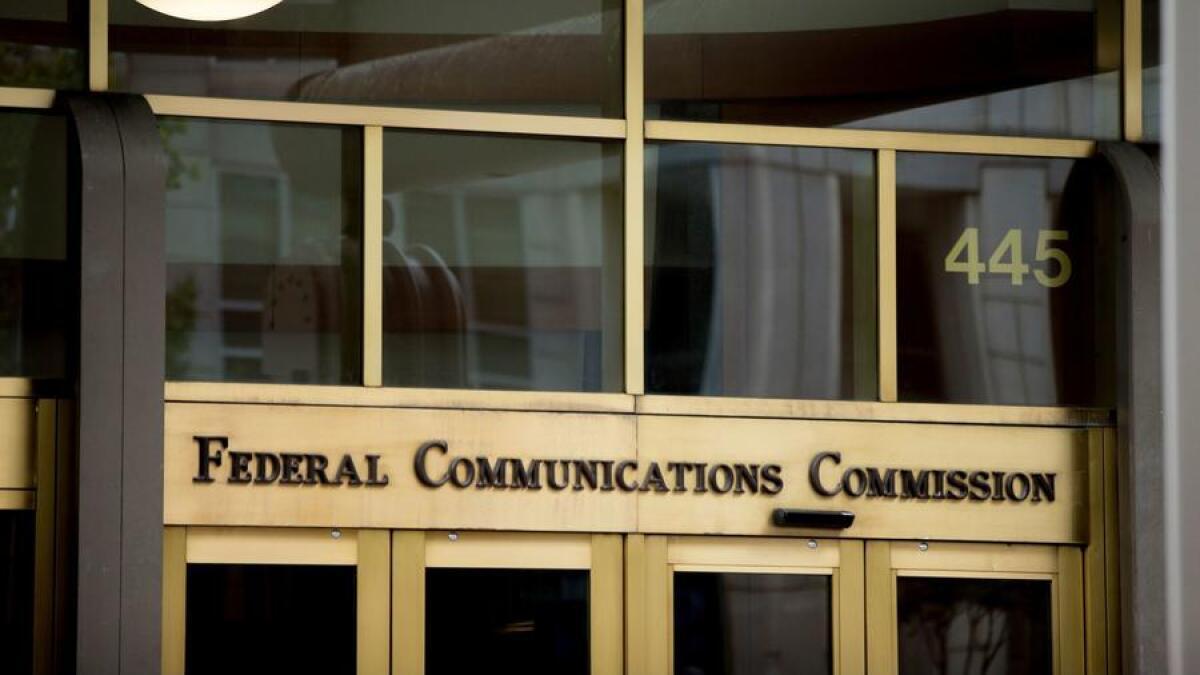
As the Federal Communications Commission considered changes to net neutrality rules designed to preserve an open Internet, some people said the environment at the agency’s public meeting this week was anything but open.
John Donnelly, a reporter for CQ Roll Call, said he was “manhandled” by two FCC security guards when he tried to question Commissioner Michael O’Rielly as he left the room after voting on Thursday to start dismantling the online traffic rules.
“Not only did they get in between me and O’Rielly but they put their shoulders together and simultaneously backed me up into the wall and pinned me to the wall for about 10 seconds just as I started to say, ‘Commissioner O’Rielly, I have a question,’” Donnelly said Friday.
Donnelly said he was stopped long enough to allow O’Rielly to walk away.